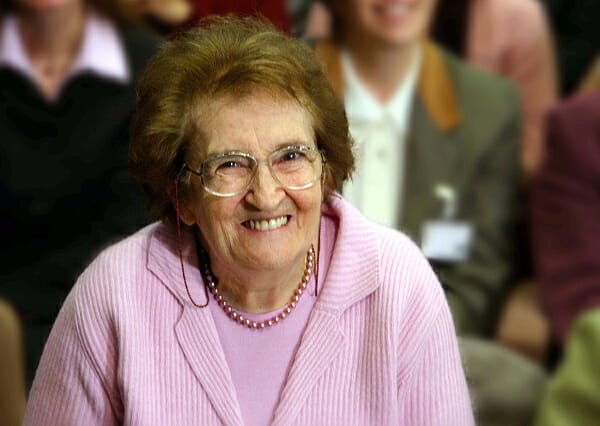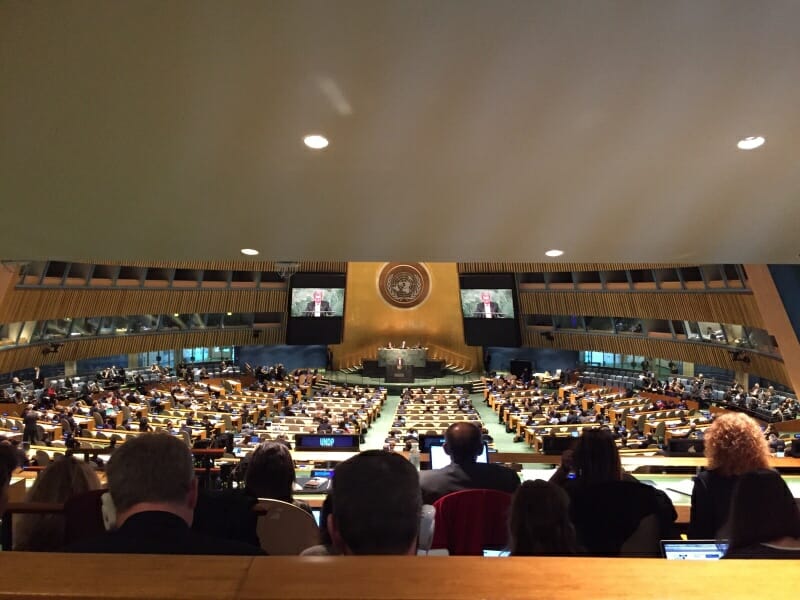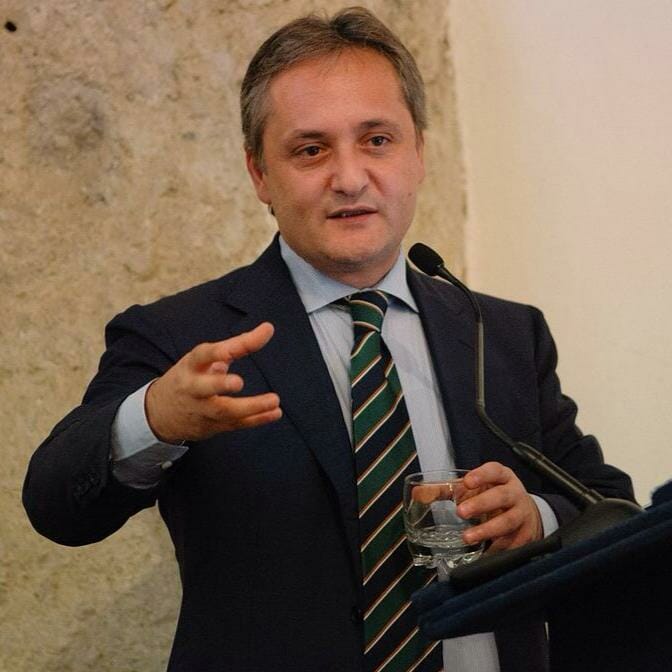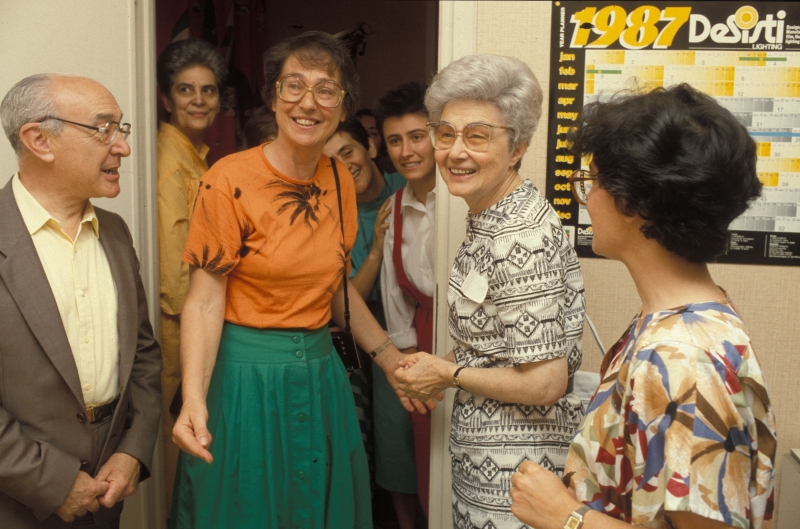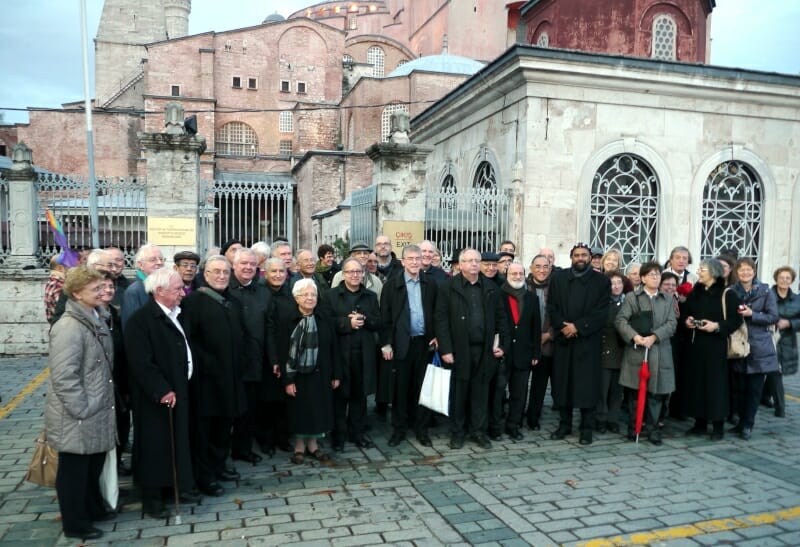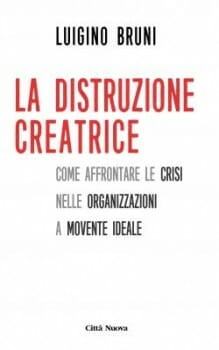
Creative destruction
 In his introduction to Bruni’s new book entitled, “Creative Destruction,” Marco Tarquinio, Director of the Catholic newspaper wrote: «Bruni was well aware that this line of thought would lead him to the confines separating the human and the inhuman and regrettably, also beyond, to the complex organisations prevalently driven by material objectives. He perfectly knew that in writing about these issues, i.e., about “production” and “marketing” organisations and thus, of the creativity of relationships and employment, he would eventually have to focus on the organisations driven by ideals and other aspirations of the human spirit,» bringing both fields «to face the same challenge of renewal without losing their roots and driving spirit.» Published by New City Press, the book is a collection of selected articles published in 2015 on Avvenire, taken from the series, “The midwives of Egypt,” and “Regenerations.” In the book’s last chapter entitled, “The periphery is where we learn to resurrect,” Bruni comes to the conclusion of his work and the challenges resulting from his reflection which took him some months to delineate. He introduces his proposals with a phrase of the German poet, Friedrich Hölderlin: “God created man the way the sea created the continents: through withdrawal.” Here are some passages which in a way introduce us to the book proper: «A movement that with time has turned into an organisation can undergo a charismatic renewal, if in some marginal zone of the “Kingdom” some creative minorities start reconstituting the conditions needed to revive the same miracle of the charism’s first foundation: the same enthusiasm, joy, and the same fruits. The true process that brings this very same minority to become the majority is called reform. […] It is a decisive process that has to be undertaken unhurriedly, and should involve and activate the dynamic settings of creativity, going out to them “at the confines of the empire.” All this is certainly and firstly, a gift (charis), but also signifies wise organisation, and deep, spiritual, prophetic, and transformative intelligence. […] Many new “evangelisations” come about upon recounting the good news, and we are able to feel it come alive in us, in a new and diverse manner. This is how a new-ancient love story is reborn – a new eros, new desires, new generativity, and new children. […] The charism may thus flourish again and resume its encounter with people in the streets, forgetting its own organisations so as to tend to the wounds and sufferings of the men and woman today, especially of the poorer ones, […] creatively interpreting their own mission in the present time.»
In his introduction to Bruni’s new book entitled, “Creative Destruction,” Marco Tarquinio, Director of the Catholic newspaper wrote: «Bruni was well aware that this line of thought would lead him to the confines separating the human and the inhuman and regrettably, also beyond, to the complex organisations prevalently driven by material objectives. He perfectly knew that in writing about these issues, i.e., about “production” and “marketing” organisations and thus, of the creativity of relationships and employment, he would eventually have to focus on the organisations driven by ideals and other aspirations of the human spirit,» bringing both fields «to face the same challenge of renewal without losing their roots and driving spirit.» Published by New City Press, the book is a collection of selected articles published in 2015 on Avvenire, taken from the series, “The midwives of Egypt,” and “Regenerations.” In the book’s last chapter entitled, “The periphery is where we learn to resurrect,” Bruni comes to the conclusion of his work and the challenges resulting from his reflection which took him some months to delineate. He introduces his proposals with a phrase of the German poet, Friedrich Hölderlin: “God created man the way the sea created the continents: through withdrawal.” Here are some passages which in a way introduce us to the book proper: «A movement that with time has turned into an organisation can undergo a charismatic renewal, if in some marginal zone of the “Kingdom” some creative minorities start reconstituting the conditions needed to revive the same miracle of the charism’s first foundation: the same enthusiasm, joy, and the same fruits. The true process that brings this very same minority to become the majority is called reform. […] It is a decisive process that has to be undertaken unhurriedly, and should involve and activate the dynamic settings of creativity, going out to them “at the confines of the empire.” All this is certainly and firstly, a gift (charis), but also signifies wise organisation, and deep, spiritual, prophetic, and transformative intelligence. […] Many new “evangelisations” come about upon recounting the good news, and we are able to feel it come alive in us, in a new and diverse manner. This is how a new-ancient love story is reborn – a new eros, new desires, new generativity, and new children. […] The charism may thus flourish again and resume its encounter with people in the streets, forgetting its own organisations so as to tend to the wounds and sufferings of the men and woman today, especially of the poorer ones, […] creatively interpreting their own mission in the present time.»
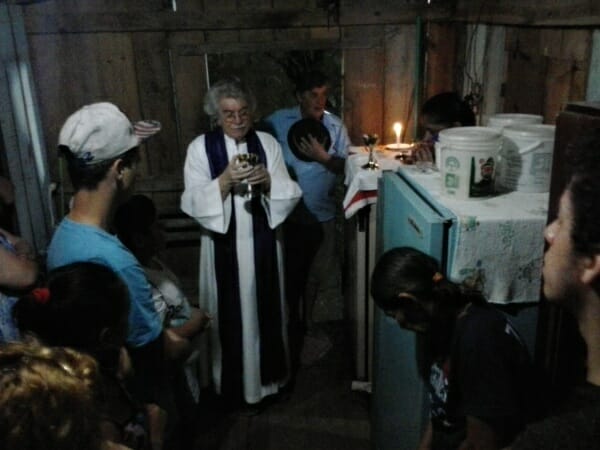
Christmas at the Morro
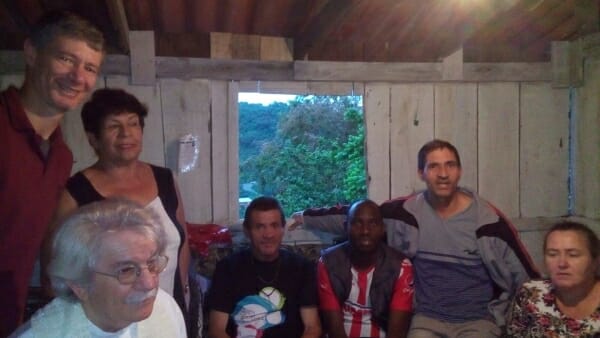 “On April 21, 1964, Chiara Lubich wrote in her diary: “I dreamed of a focolare amongst the mocambos, built like a mocambo because our houses should be like the ones around them, and our house is the place through which we carry out our main apostolate.” Although it would years, the dream came true. A year ago, Brazilians, Lucival, Helson, Keles; Estimable, a Haitan; and Fabrizio from Italy left their house in the capital at Florianopolis, to move to go and live in the morro, one of the many existential peripheries of the world. “How is it going” we asked them. “We mainly try to become inserted in the new environment. Keles works at the Marist school that is very important in the fields of education and social life for the children and teenagers. Lucival, who works at the Fazenda da Esperança, a rehabilitation community for young drug addicts is now involved in the Associação de Moradores “Alto da Caieira, which is an organisation for the protection of the people who live in the morro.” We know that it’s not always easy to be accepted by the people of the favelas. These five young men are trying, with the help of Father Vilson Groh who has been serving in the morro for more than thirty years. “The ideas come by being with the people. That’s what we’ve been doing every Thursday for a couple of months. Every Wednesday men recite the Rosary in a different house, which is a pretty common practice in Brazil. There aren’t large numbers – maybe 10 to 12 people – but is a seed that’s been planted. And it’s already bearing fruits, in the sense that we see it little by little increasing our knowledge and trust of one another, both them towards us and us towards them. A communitarian sense of responsibility is growing, the feeling that the needs of the others are our own needs.”
“On April 21, 1964, Chiara Lubich wrote in her diary: “I dreamed of a focolare amongst the mocambos, built like a mocambo because our houses should be like the ones around them, and our house is the place through which we carry out our main apostolate.” Although it would years, the dream came true. A year ago, Brazilians, Lucival, Helson, Keles; Estimable, a Haitan; and Fabrizio from Italy left their house in the capital at Florianopolis, to move to go and live in the morro, one of the many existential peripheries of the world. “How is it going” we asked them. “We mainly try to become inserted in the new environment. Keles works at the Marist school that is very important in the fields of education and social life for the children and teenagers. Lucival, who works at the Fazenda da Esperança, a rehabilitation community for young drug addicts is now involved in the Associação de Moradores “Alto da Caieira, which is an organisation for the protection of the people who live in the morro.” We know that it’s not always easy to be accepted by the people of the favelas. These five young men are trying, with the help of Father Vilson Groh who has been serving in the morro for more than thirty years. “The ideas come by being with the people. That’s what we’ve been doing every Thursday for a couple of months. Every Wednesday men recite the Rosary in a different house, which is a pretty common practice in Brazil. There aren’t large numbers – maybe 10 to 12 people – but is a seed that’s been planted. And it’s already bearing fruits, in the sense that we see it little by little increasing our knowledge and trust of one another, both them towards us and us towards them. A communitarian sense of responsibility is growing, the feeling that the needs of the others are our own needs.”  Could you give us some examples? “There was one man who was dependent on alcohol and slept at the dump. Fr Vilson spoke with the community, which then put him on a path of recovery. They literally rebuilt his dwelling, a wood shack, and they furnished it with a stove; someone else brought a bed, a refrigerator, and so on. Two weeks ago there he was, standing amongst the 15 teenagers who were being Confirmed; and last Thursday the Mass was celebrated at his house. We also learnt of the inhuman conditions that a certain woman was living in. Here again, the community got to work in helping her out. They themselves distribute to those in need whatever they are able to procure for them: food and clothing.” And as a sign that relationships really are becoming deeper, they recounted that last Friday twenty people visited the focolare for the confraternização, a Christmas celebration where everyone brings something to share. Also here at the morro, we didn’t only eat food like the famous Brazilian churrasco meat, but we also celebrated Jesus who once again deigned to be born as at Bethlehem in the poverty of a favela.”
Could you give us some examples? “There was one man who was dependent on alcohol and slept at the dump. Fr Vilson spoke with the community, which then put him on a path of recovery. They literally rebuilt his dwelling, a wood shack, and they furnished it with a stove; someone else brought a bed, a refrigerator, and so on. Two weeks ago there he was, standing amongst the 15 teenagers who were being Confirmed; and last Thursday the Mass was celebrated at his house. We also learnt of the inhuman conditions that a certain woman was living in. Here again, the community got to work in helping her out. They themselves distribute to those in need whatever they are able to procure for them: food and clothing.” And as a sign that relationships really are becoming deeper, they recounted that last Friday twenty people visited the focolare for the confraternização, a Christmas celebration where everyone brings something to share. Also here at the morro, we didn’t only eat food like the famous Brazilian churrasco meat, but we also celebrated Jesus who once again deigned to be born as at Bethlehem in the poverty of a favela.”
Word of Life January 2016
The huge multitude of Christians should be quite visible. But they are so divided that many peopledon’t notice them and so don’t see Jesus through them. Unity is the only sure way to proclaim God’s mighty acts. When the Lord acts, he does mighty things. As soon as he had created the universe he saw it was ‘good’ (Gen1:25). Indeed, after creating the man and the woman, and entrusting the whole of creation to them, he saw it was ‘very good’ (Gen 1:31). But the act of God that exceeds all else was done by Jesus. In his death and resurrection he created a new world and a new people. It is a people to whom Jesus has given the life of Heaven, a genuine fraternity, in mutual welcome, in sharing with one another and in self-giving. Peter’s letter helped the first Christians realize that God’s love had made them ‘a chosen race, a royal priesthood, a holy nation, God’s own people’ (1 Pet. 2:9; see also the whole passage vv. 9-10). If, like the first Christians, we were to become fully aware of what we are, of how much God’s mercy has done in us, among us and around us, we would be amazed. We would not be able to contain our joy and we would feel we want to share with others the need to ‘proclaim the mighty acts of the Lord’. But it is difficult, or virtually impossible, to give witness effectively to the beauty of the new kind of relations in society that Jesus brought about, if we stay isolated from one another. It is normal, therefore, that Peter’s invitation is addressed to the whole people. We cannot show ourselves as argumentative and partisan, or even merely indifferent to one another, and then proclaim that ‘the Lord has created a new people, and has freed us from egoism, from hatred and rancour, giving us mutual love as the law that makes us one heart and one soul…’ Among the Christian people there are indeed differences in our ways of thinking, our traditions and cultures, but these diversities are to be welcomed with respect, recognizing the beauty of this huge variety and aware that unity is not uniformity. This is the journey we will follow during the Week of Prayer for Christian Unity (celebrated in the northern hemisphere on 18-25 January) and throughout the year. The Word of Life invites us among our different Churches and communities to try to get to know one another better, to tell one another of the marvellous works of the Lord. In this way we will be able to ‘proclaim’ these works credibly, giving witness that we are one precisely in our diversity and that we support each another concretely. Chiara Lubich encouraged us with great energy to follow this path:Love is the greatest power on earth: it unleashes the peaceful Christian revolution around those who live it, so that today people can repeat what the early Christians said centuries ago: ‘We were born only yesterday and we have already spread all over the world.’ Love! What a great need there is for love in the world! And in us, Christians! (Tertullian,The Apology, 37:7) All together we Christians of various Churches number more than a billion people. Such a multitude should be quite visible. But we are so divided that many do not see us, nor do they see Jesus through us. He said that the world would recognize us as his own and, through us, would recognize him, by our mutual love, by unity: ‘By this everyone will know that you are my disciples, if you have love for one another’ (Jn 13:35). Our world today asks each one of us for love; it asks for unity, communion, solidarity. And it also calls upon the Churches to recompose the unity that has been torn for centuries.’
Compiled by Fabio Ciardi
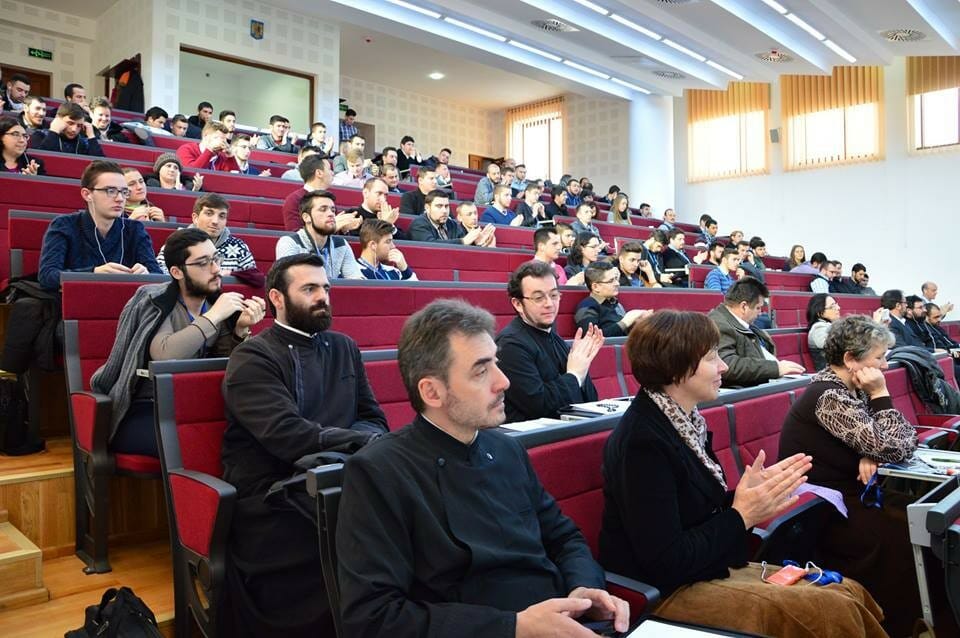
Romania, new developments between the Orthodox and Catholics
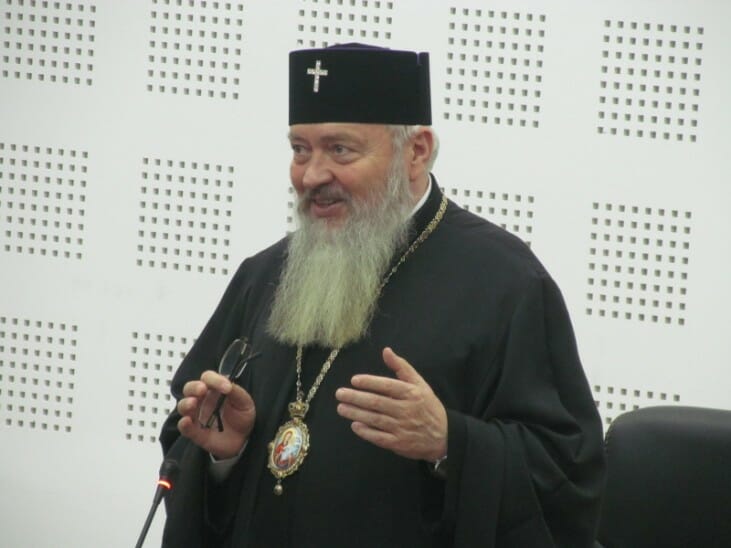 Already in 2004, getting to know each other, establishing dialogue and intensifying the spirit of communion were the objectives that had pushed the Orthodox Faculty of Theology of University Babeş – Bolyai of Cluj-Napoca and the members of the Focolare Movement to start a fruitful spiritual exchange of ideas and experiences. With time, this relationship was enriched by an ecumenical course that led to a dialogue at a theological level especially in recent years. In the common desire to bring Chiara Lubich’s charism of unity to Orthodox theology, this year both parties agreed to foster joint activities between the Romanian Faculty and the Sophia University Institute (SUI) in Loppiano (Florence), in a Symposium between the two academic institutions in Cluj-Napoca from 26 to 28 November. The symposium was opened by the Metropolitan of Cluj-Napoca, Andrei Andreicut who conveyed encouraging words for the precious effort to reach this deep communion. Also present was Bishop Vasile Somesanul, who has been a protagonist for many years in this undertaking. The lessons were entrusted to SUI professors on the part of the Movement, among whom was the Institute’s Rector, Piero Coda. On the Orthodox side, was the Dean of the Faculty, Fr Vasile Stanciu, with three qualified professors of three of the theological faculties in Romania, Cluj, Sibiu and Alba Iulia. Some lessons like those on ecumenism and the sacred scriptures were jointly expounded.
Already in 2004, getting to know each other, establishing dialogue and intensifying the spirit of communion were the objectives that had pushed the Orthodox Faculty of Theology of University Babeş – Bolyai of Cluj-Napoca and the members of the Focolare Movement to start a fruitful spiritual exchange of ideas and experiences. With time, this relationship was enriched by an ecumenical course that led to a dialogue at a theological level especially in recent years. In the common desire to bring Chiara Lubich’s charism of unity to Orthodox theology, this year both parties agreed to foster joint activities between the Romanian Faculty and the Sophia University Institute (SUI) in Loppiano (Florence), in a Symposium between the two academic institutions in Cluj-Napoca from 26 to 28 November. The symposium was opened by the Metropolitan of Cluj-Napoca, Andrei Andreicut who conveyed encouraging words for the precious effort to reach this deep communion. Also present was Bishop Vasile Somesanul, who has been a protagonist for many years in this undertaking. The lessons were entrusted to SUI professors on the part of the Movement, among whom was the Institute’s Rector, Piero Coda. On the Orthodox side, was the Dean of the Faculty, Fr Vasile Stanciu, with three qualified professors of three of the theological faculties in Romania, Cluj, Sibiu and Alba Iulia. Some lessons like those on ecumenism and the sacred scriptures were jointly expounded.  The various papers focused on the theme of the Holy Spirit, as expressed in the Symposium’s title: St Basil the Great’s theological writings on the Holy Spirit. The work of the Holy Spirit in the Church and in creation. All felt that “the presence of the Holy Spirit was tangible, and evidenced not only in the luminosity of the papers presented, but also in the communion with God that everyone experienced”. One of the participants said, “We all felt that an encounter was possible since there was the real intent to give of oneself,” while another participant underlined “the great harmony that reigned, and the joy of being able to share the wealth of our single churches”. In the days before the Symposium lessons were given by Piero Coda at the Orthodox Faculty of Theology especially students of the Faculty itself, and also those of the Roman-Catholic, Greek-Catholic and Evangelical faculties of the University. During the week in the town of Sibiu an event focused on the debate on the future of Europe, organised by the Ecumenical Centre of Sibiu, at which among the main speakers were Professor Piero Coda and the writer, Andrei Pleşu, an outstanding Romanian academic. The Symposium was also the occasion to plan future projects and in this regard intense collaboration was foreseen. The next academic year will see an exchange of professors between the Orthodox Faculty and SUI. Prospects are for a joint seminar in Sophia in the first half of 2017.
The various papers focused on the theme of the Holy Spirit, as expressed in the Symposium’s title: St Basil the Great’s theological writings on the Holy Spirit. The work of the Holy Spirit in the Church and in creation. All felt that “the presence of the Holy Spirit was tangible, and evidenced not only in the luminosity of the papers presented, but also in the communion with God that everyone experienced”. One of the participants said, “We all felt that an encounter was possible since there was the real intent to give of oneself,” while another participant underlined “the great harmony that reigned, and the joy of being able to share the wealth of our single churches”. In the days before the Symposium lessons were given by Piero Coda at the Orthodox Faculty of Theology especially students of the Faculty itself, and also those of the Roman-Catholic, Greek-Catholic and Evangelical faculties of the University. During the week in the town of Sibiu an event focused on the debate on the future of Europe, organised by the Ecumenical Centre of Sibiu, at which among the main speakers were Professor Piero Coda and the writer, Andrei Pleşu, an outstanding Romanian academic. The Symposium was also the occasion to plan future projects and in this regard intense collaboration was foreseen. The next academic year will see an exchange of professors between the Orthodox Faculty and SUI. Prospects are for a joint seminar in Sophia in the first half of 2017.
Dori Zamboni Born to Heaven
“I’m dictating this letter since I can’t move my hand anymore, but my head thinks and prays for all of you as you come into my mind with your joys, your sorrows and your difficulties.” This is the beginning of a Christmas letter of Dori’s from a few days ago. It is addressed to her “Dearest friends,” people she had met over the course of her life and now tried to reach around the world. Doriana Zamboni, known simply as “Dori”, was born in Trent, Italy, in 1926. She met Chiara Lubich when she was a very young and rebellious student in upper secondary school and was taking Philosophy lessons from Chiara. That was in 1943, the beginning of a spiritual adventure that would lead to the birth of the Focolare Movement. “Jesus and Our Lady will help you through my prayers too,” the letter continues. “And even if I don’t know your needs, I place them inside Her heart so that she keep faithful your love towards Jesus abandoned on the Cross.” That faithfulness had marked the life of Dori. Indeed, she was the person to whom Chiara first confided her intuition that Jesus greatest suffering was His abandonment on the Cross, and it quickly become the secret and cornerstone of Chiara’s life and the life of those who followed her path. “Remain in my love” (Jn 15:9) was the Word of Life that Chiara had suggested to her as a guide for her life because it seemed to reflect who Dori was. She travelled the world to spread the ideal of unity: 1956 in France; 1965 in England; 1971 in Belgium. In all of these places, together with the focolares, she opened new paths on the ecumenical journey and in the dialogue with other cultures. She accompanied thousands of people on their spiritual journey. From 1976 the Focolare foundress entrusted to her the Branch of the Volunteers of God, lay people actively engaged in the midst of society, and the New Humanity Movement. In 1956 she was a member of the team that began Città Nuova and was therefore amongst the pioneers of the publishing house and magazine of the Focolare Movement. Dori continued to encourage and support the work of publication up until the last days of her life. “Wherever you are, remember me,” her letter continues, “because my health is failing and I would like it to be in many of your prayers to help me make the climb. . . I feel you all very close to me, desirous to help me to bear and suffer whatever God may send to me.”. Thus, enveloped in the love and prayers of those who had assisted her until the end she passed away peacefully on the morning of December 26th. Focolare president Maria Voce announced her death to the Movement while expressing her gratitude for Dori’s life and inviting everyone to join in prayer. The funeral will be held at the Mariapolis Centre in Castel Gandolfo, Rome, on Monday, December 28th at 10:30 am (Italian time).Economy of Comunione in Guatemala: the Company Becomes a Family
 Nine business owners have enrolled in an EoC course in the small Central American country of Guatemala, a land with a strong indigeneous ancestry and sharp social contrasts.They have been delving into the fundamentals of the project on a monthly basis and examining experiences that are currently underway in other parts of the world. “The basic text,” course director, Sandra Macario, explains, “is Il prezzo della gratuità (Bruni), but we often have Skype link-ups with other EoC business owners in Mexico City and other Latin American countries.” An Open Day was held on November 26th for people who might be interested in an End-of-the-Year Breakfast which is customary in this area of the world with its traditional beans and corn dishes. The breakfast was attended by forty people. Maria Luisa Altamirano from Mexico was the guest of honour, who presented her experience as a business owner and responded to questions from the audience. Besides course members, Brazilian business owner, Ismael Yos, who attended the same course in Brazil, also spoke. The testimony of Guatamalen architect, Jose Mario Contreras, was exceptionally moving. He does not always have steady work, so he depends on a pool of workers whom he can call when he needs them. They know that work is scarce and realise that when they are not working for him, they must find whatever work can be found. At times workers are urgently needed, such as the time they had to restructure and fit out a Dyalisis Centre. Due to a cancellation of a contract with another company and susequent suspension of service, it became even more pressing. They were in need of builders to restructure the building and engineers to operate machinery. Contreras presented his bid, and all voted in favour, except for the delivery time which was reduced by half or else forfiet the job. It was an impossible problem. The last card he had to play was dialoging with the workers. Dialogue was a concept that Contreras had been implementing for some time, and he had introduced it as one of the foundations of his work activity, a lifestyle that has proven to be efficacious at such critical times. His proposal to the workers of working double shifts was unanimously accepted, not only because they did not want to lose out on the job, but because they trusted him and one another. Contrary to all technical predictions the job was finished on time, and the patients who were waiting recieved treatment on the date that had previously been agreed on. On another occasion Contreras had received a telephone call from one of his employees. It was early in the morning, too early to disturb the boss. But it was serious: his small daughter was ill and in urgent need of a certain medication that was too costly for the employee. Contreras listened to him like a brother: “For now I’ll begin to pray for your daughter,” he told him. “As soon as the bank opens, I’ll send you the money you need.” Contreras had the feeling that his company “had become a family.”
Nine business owners have enrolled in an EoC course in the small Central American country of Guatemala, a land with a strong indigeneous ancestry and sharp social contrasts.They have been delving into the fundamentals of the project on a monthly basis and examining experiences that are currently underway in other parts of the world. “The basic text,” course director, Sandra Macario, explains, “is Il prezzo della gratuità (Bruni), but we often have Skype link-ups with other EoC business owners in Mexico City and other Latin American countries.” An Open Day was held on November 26th for people who might be interested in an End-of-the-Year Breakfast which is customary in this area of the world with its traditional beans and corn dishes. The breakfast was attended by forty people. Maria Luisa Altamirano from Mexico was the guest of honour, who presented her experience as a business owner and responded to questions from the audience. Besides course members, Brazilian business owner, Ismael Yos, who attended the same course in Brazil, also spoke. The testimony of Guatamalen architect, Jose Mario Contreras, was exceptionally moving. He does not always have steady work, so he depends on a pool of workers whom he can call when he needs them. They know that work is scarce and realise that when they are not working for him, they must find whatever work can be found. At times workers are urgently needed, such as the time they had to restructure and fit out a Dyalisis Centre. Due to a cancellation of a contract with another company and susequent suspension of service, it became even more pressing. They were in need of builders to restructure the building and engineers to operate machinery. Contreras presented his bid, and all voted in favour, except for the delivery time which was reduced by half or else forfiet the job. It was an impossible problem. The last card he had to play was dialoging with the workers. Dialogue was a concept that Contreras had been implementing for some time, and he had introduced it as one of the foundations of his work activity, a lifestyle that has proven to be efficacious at such critical times. His proposal to the workers of working double shifts was unanimously accepted, not only because they did not want to lose out on the job, but because they trusted him and one another. Contrary to all technical predictions the job was finished on time, and the patients who were waiting recieved treatment on the date that had previously been agreed on. On another occasion Contreras had received a telephone call from one of his employees. It was early in the morning, too early to disturb the boss. But it was serious: his small daughter was ill and in urgent need of a certain medication that was too costly for the employee. Contreras listened to him like a brother: “For now I’ll begin to pray for your daughter,” he told him. “As soon as the bank opens, I’ll send you the money you need.” Contreras had the feeling that his company “had become a family.”
“Be a family this Christmas”
«If I should have to leave this world today and you were to ask me for a single word, one last word that sums up our Ideal, I would say – certain of being perfectly understood – ‘Be a family’. Are there among you those who are suffering spiritual or moral trials? Understand them as a mother and more than a mother would, enlighten them with your words or example. Do not leave them alone; indeed, surround them with the warmth of a family. Are there among you those who are suffering physically? They should be your preference. Suffer with them. Seek to understand their sufferings in depth. Share with them the fruits of your apostolic endeavors so that they may realize that they, more than others, contributed to its success. Are there those who are dying? Imagine yourself in their place and do all that you would want others to do to you, to the very last instant. Are there those who are happy because of a particular achievement or for any other reason? Share in their happiness, so that their consolation may not be saddened and their heart closed, but that the joy may be of all.

“Are some people leaving? Let them go, but first fill their heart with this one heritage: a sense of the family, so that they may bring it to their future destination. Never put any kind of activity– neither spiritual, nor apostolic – before the spirit of being a family with the brothers or sisters with whom you live. And wherever you go to bring the ideal of Christ, […] you can do nothing better than to seek to create with discretion, with prudence, but with determination, the spirit of a family. It is a humble spirit, it wants the good of the others, it is not proud… in short, it is charity, true, complete charity. In conclusion, if I should have to leave you, I would have Jesus in me repeat to you: ‘Love one another… so that all may be one‘». Chiara Lubich (La dottrina spirituale – Città Nuova Ed. pp.92-93)
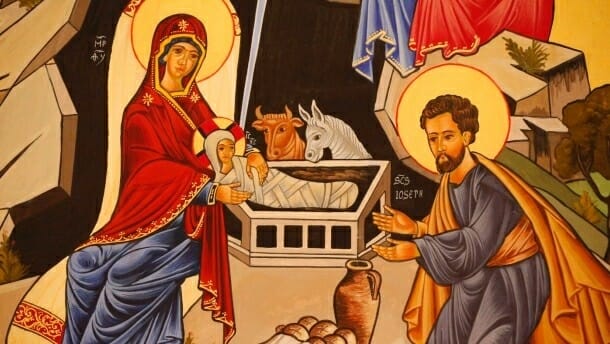
Christmas – a time for sharing
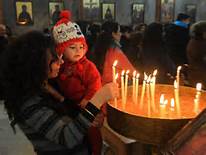
Christmas in Syria
 “The life of each day varies, because the danger varies. On some days nothing happens, and you could even forget that there was a war. On other days you could be on your way to work and get hit by stray bullets, or walk into a battle, or under falling bombs in the middle of a civilian area,” Pascal reports. He has been living in a focolare in Syria for several years. How are we preparing for Christmas? In Aleppo, Kafarbou and Damascus our communities are focusing mostly on the children, because in spite of the fact that it’s such a celebrated feast in Syria, families are finding it hard to experience the joy of Christmas. Therefore, the young people have done a lot of projects to raise funds which, joined to the donations that have come in from outside, has allowed them to expand their project of giving back the meaning of Christmas to the children and their families. In Aleppo, for example, there will be a feast for around 70 families; in Kafarbou they will visit houses in small groups, with food and gifts. In Damascus, where there are more possibilities, they’ve organised a Christmas concert and, in the meantime, will visit families with food, gifts, songs and games. . .” And in recent months with the escalation of violence, have you focolarini ever reconsidered your decision to stay in Syria? “No, never. The focolare’s presence is so important! There mere presence even without doing anything. It’s a sign that the Movement around the world is with them, with the Syrian people. I don’t know how to explain it. . . We’re not obliged to stay; we can leave. We’ve shared so many hardships with them over these years that they feel like we belong to the them, and we feel that they belong to us. Our reasons aren’t rational but affective, a matter of the heart. There’s no rational reason for staying in Aleppo. The Syrian families that stay do it because of their connection to the land, to their people, because everything else says: get out! Here, everything is disappearing, day by day there is less and less of a future for your children. I saw some remain out of a choice of love, to give witness. For example, some remained so that a school for deaf children could continue. Living for others gives you the meaning to life, it gives meaning to your existence.”
“The life of each day varies, because the danger varies. On some days nothing happens, and you could even forget that there was a war. On other days you could be on your way to work and get hit by stray bullets, or walk into a battle, or under falling bombs in the middle of a civilian area,” Pascal reports. He has been living in a focolare in Syria for several years. How are we preparing for Christmas? In Aleppo, Kafarbou and Damascus our communities are focusing mostly on the children, because in spite of the fact that it’s such a celebrated feast in Syria, families are finding it hard to experience the joy of Christmas. Therefore, the young people have done a lot of projects to raise funds which, joined to the donations that have come in from outside, has allowed them to expand their project of giving back the meaning of Christmas to the children and their families. In Aleppo, for example, there will be a feast for around 70 families; in Kafarbou they will visit houses in small groups, with food and gifts. In Damascus, where there are more possibilities, they’ve organised a Christmas concert and, in the meantime, will visit families with food, gifts, songs and games. . .” And in recent months with the escalation of violence, have you focolarini ever reconsidered your decision to stay in Syria? “No, never. The focolare’s presence is so important! There mere presence even without doing anything. It’s a sign that the Movement around the world is with them, with the Syrian people. I don’t know how to explain it. . . We’re not obliged to stay; we can leave. We’ve shared so many hardships with them over these years that they feel like we belong to the them, and we feel that they belong to us. Our reasons aren’t rational but affective, a matter of the heart. There’s no rational reason for staying in Aleppo. The Syrian families that stay do it because of their connection to the land, to their people, because everything else says: get out! Here, everything is disappearing, day by day there is less and less of a future for your children. I saw some remain out of a choice of love, to give witness. For example, some remained so that a school for deaf children could continue. Living for others gives you the meaning to life, it gives meaning to your existence.”
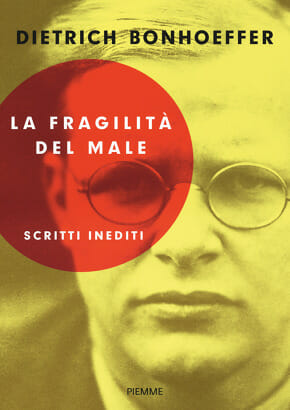
I have received mercy
 Bonhoeffer was among the first to criticise the Third Reich and was in the United States when the Second World War broke out. He returned to his homeland to suffer with his people. Conscious of the risk, he faced it in a spirit of freedom and with a strong sense of justice. A theologian and Lutheran pastor, he died at a concentration camp in Flossenbürg on April 9, 1945 after being condemned for his opposition to the Nazi regime. We remember him with some of his thoughts on mercy published in “La fragilità del male, raccolta di scritti inediti”. “Each day the Christian community sings: ‘I have received mercy.’ I have obtained this gift even when I closed my heart to God: when I took up the path of sin; when I loved my faults more than God; when I encountered misery and suffering in exchange for what I had done; when I was lost and was not able to find the path of return. Therefore, it was the word of the Lord that came out to meet me. Therefore, I understood: He loves me. Jesus has found me: he was near to me, only Him. He gave me comfort, forgave all my errors and did not find me guilty of evil. When I was his enemy and did not respect his commandments, he treated me like a friend. When I did him wrong, he returned to me only goodness. He did not condemn me for my misdeeds, but unceasingly sought me out and without rancour. He suffered for me and died for me. He put up with everything for me. He won me. The Father had found his son again. We think of all these things when we intone that song. I can hardly fathom why the Lord loves me in this way, why I am so dear to him. I cannot understand how he managed to and wanted to win my heart with his love, all I can say is: ‘I have received mercy.” Dietrich Bonhoeffer, La fragilità del male, raccolta di scritti inediti (Piemme, 2015)
Bonhoeffer was among the first to criticise the Third Reich and was in the United States when the Second World War broke out. He returned to his homeland to suffer with his people. Conscious of the risk, he faced it in a spirit of freedom and with a strong sense of justice. A theologian and Lutheran pastor, he died at a concentration camp in Flossenbürg on April 9, 1945 after being condemned for his opposition to the Nazi regime. We remember him with some of his thoughts on mercy published in “La fragilità del male, raccolta di scritti inediti”. “Each day the Christian community sings: ‘I have received mercy.’ I have obtained this gift even when I closed my heart to God: when I took up the path of sin; when I loved my faults more than God; when I encountered misery and suffering in exchange for what I had done; when I was lost and was not able to find the path of return. Therefore, it was the word of the Lord that came out to meet me. Therefore, I understood: He loves me. Jesus has found me: he was near to me, only Him. He gave me comfort, forgave all my errors and did not find me guilty of evil. When I was his enemy and did not respect his commandments, he treated me like a friend. When I did him wrong, he returned to me only goodness. He did not condemn me for my misdeeds, but unceasingly sought me out and without rancour. He suffered for me and died for me. He put up with everything for me. He won me. The Father had found his son again. We think of all these things when we intone that song. I can hardly fathom why the Lord loves me in this way, why I am so dear to him. I cannot understand how he managed to and wanted to win my heart with his love, all I can say is: ‘I have received mercy.” Dietrich Bonhoeffer, La fragilità del male, raccolta di scritti inediti (Piemme, 2015)
Children and the real Christmas story
https://vimeo.com/140678777 A child recounted: «I only knew about Santa Claus, but nobody has ever told me the real story of Christmas, the birth of Jesus!» Another child said, «Oh yes, people have forgotten, but we can remind them about it! Still another added «All the other kids in the world have already started!» These are the gen4 boys and girls “who love everybody the way Jesus does and want to show everyone that He is the greatest gift of all!” They learnt this from Chiara Lubich, founder of the Focolare Movement, who had urged them to “Let Jesus be born in your midst with your love, so that it will always be Christmas! […] We can offer Jesus in our midst to the whole world, and bring this love and joy to the streets, schools, and to the big and small… everywhere!” Years ago at Christmas, while walking through the streets of Zurich, Switzerland, Chiara had seen the shop windows adorned with lights and toys, and snow on the trees, Santa Claus… and had asked herself: But where is Jesus? He was not there. And so she wrote: «This wealthy world has taken Christmas for itself, but has dislodged Jesus.» «What does it mean to ”dislodge?”» A child asked. It means that Jesus has no place to go to, like when he was born and there was no room for him anywhere.» It was then that Chiara told us «So we must welcome him, and celebrate his coming! We, gen4 around the world, wish to do this and invite everyone to do the same.». Then came the idea of making a statue of Baby Jesus and nativity scenes to offer to those who do not know or do not remember that at Christmas, Jesus is more important than buying gifts. «We want to recall that Christmas is the feast of Jesus. And we tell people: do you want to bring him home with you? Some answer no, some keep walking on and do not even stop, but others stop and so we give these little statues of Jesus, or the nativity scenes we have made. We do this in the main squares of the big cities and in the shopping centers; we even give it to our mayors and go to the homes for the aged. We attract attention with our stands and concerts, and organise Christmas parties for many children. It is like a wave of happiness that overwhelms us all with happiness and brings the “celebrated Guest” back as the central point of Christmas.» On Sunday, 20 December, St. Peter’s Square will celebrate the Children’s Jubilee and Pope Francis will bless the statues of Baby Jesus. On the same day, the TV programme Sua Immagine (Rai Channel 1 at 10.30), will be dedicated to children, and will broadcast the reportage on the project “They Have dislodged Jesus.”
11th School of Inculturation in Nairobi, Kenya
The 11th edition of the School of Inculturation will be held in Kenya at the Mariapolis Piero, from 17 to 23 May 2016. Maria Voce and Jesús Morán will also attend. In May 2016 the “Mariapolis Piero” in Kenya, close to Nairobi – will host the 11th edition of the School of Inculturation, a reality which Chiara Lubich prophetically foresaw. The 250 or more delegates from Sub-Saharian Africa will focus on the theme, “The African Family,” and will reflect on the relationships of “man-woman” in their roles and responsibilities in family life, and the challenge of educating towards values. It will be held as part of the Pan-African meeting of the continent’s New Families. The national commission will present the speeches and dissertations that will trace the roots of the cultures, to be demonstrated through the concrete experiences of men and women who have embraced the charism of unity. There are great expectations and a particular joy in knowing that Maria Voce and Jesús Morán, President and Co-President, respectively, will attend together with some central councilors. Further details to be announced.
2016 United World Week
This year, the usual appointment promoted by the youth of the Focolare and aims to involve the greatest number of people and institutions in their journey towards fraternity, will be cantered in Quito, Ecuador. The theme of inculturality, with a manifestation of the youth at the so-called “Other half of the world,” where one can enter with one foot in the boreal hemisphere and the other in the austral hemisphere. There will be days of dialogue among young people of different cultures, through work sessions, sharing and community tourism in a setting of exuberant nature. Complete information on the Ecuador programme is given on the site, www.munodunido2016.com. “Link Cultures – un camino para la paz” is the title that expresses the core of all the fraternity initiatives that will ensure simultaneously throughout the world, uniting generations and cultures in a unique workshop and can be traced through the hashtag #4peace. Run4Unity – Another novelty this year is the involvement of the kids: the wold sports event, Run4Unity, the world relay race for peace which in the previous editions saw the participation of thousands of teens, which will be held annually from now on, and will be inserted in the United World Week. The La Run4Unity 2016 will take place next 8 May. The Youth for a United World hope that this on-the-road International Expo, now running on its 20th anniversary be also recognised by the UN. The initiatives that come about during the year, and on which the United World Week focuses its spotlight, are all part of the United World Project.
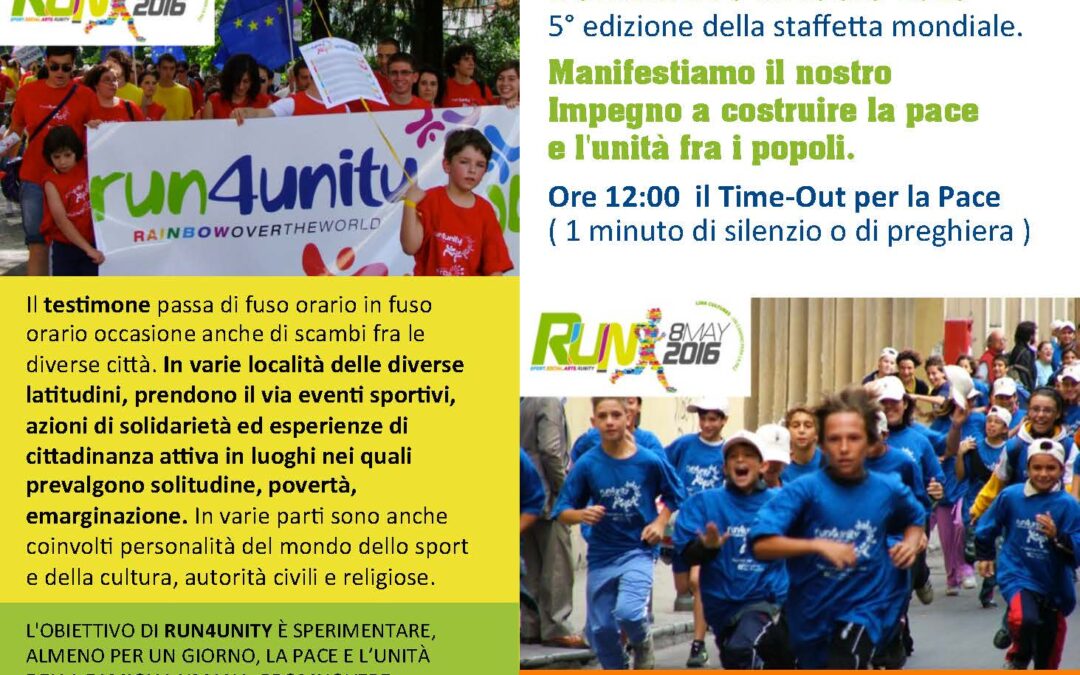
Run4Unity: passing the baton for peace
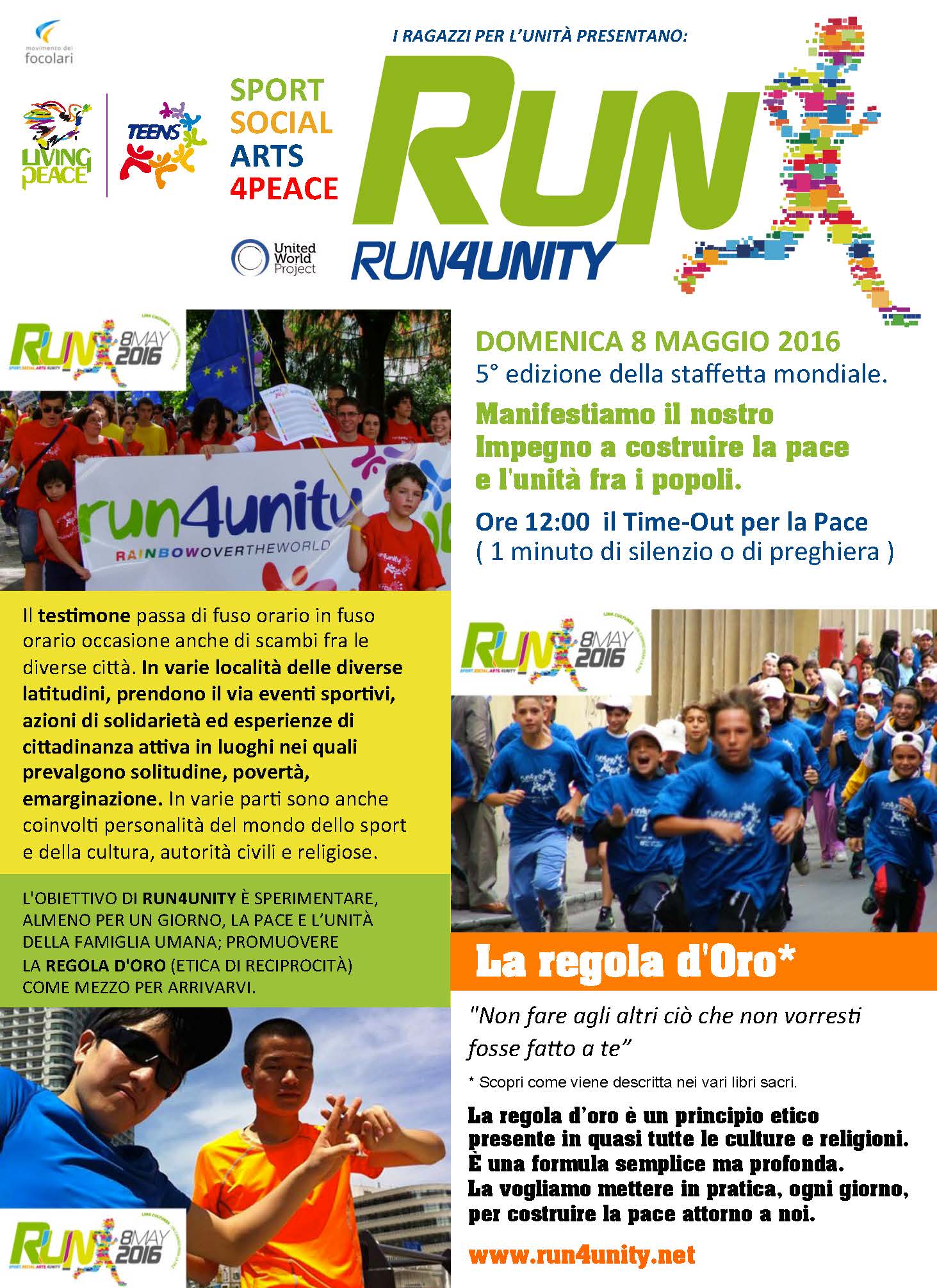 From 11 am to 12 noon in all the time zones, children throughout the world will run for peace (a stretch of the itinerary will be done on foot or by bike, roller skates, and canoe) with an extraordinary passing of the baton, from the cities situated in a preceding time zone to another. How? Through a phone call, or text message or at least “ideally linking up” with the others. 12 noon is the Time-Out, a minute of silence or prayer for peace. The day on which the Run4unity will be held will be called “World Day of the Golden Rule”: upon putting it into practice and promoting it, we will silently but effectively build Peace and a more united world. The web site http://www.run4unity.net is the tool which will highlight the world demonstration, in continual connection with social media, to allow all the boys and girls to be active in building and spreading the Event. There have been four international editions of this project: in 2005, 2008, 2012 and 2015. The R4U event is really quite unique since it links kids throughout the world, and who in a time span of 24 hours, from one time zone to the other, undertake to achieve a sole objective: unity of the human family. This explains the great interest of the mass media, and civil, religious and political authorities. Run4Unity is part of the activities of the United World Week and United World Project. Info: http://www.run4unity.net/ https://www.youtube.com/watch?v=SYR8R-_Rg_M
From 11 am to 12 noon in all the time zones, children throughout the world will run for peace (a stretch of the itinerary will be done on foot or by bike, roller skates, and canoe) with an extraordinary passing of the baton, from the cities situated in a preceding time zone to another. How? Through a phone call, or text message or at least “ideally linking up” with the others. 12 noon is the Time-Out, a minute of silence or prayer for peace. The day on which the Run4unity will be held will be called “World Day of the Golden Rule”: upon putting it into practice and promoting it, we will silently but effectively build Peace and a more united world. The web site http://www.run4unity.net is the tool which will highlight the world demonstration, in continual connection with social media, to allow all the boys and girls to be active in building and spreading the Event. There have been four international editions of this project: in 2005, 2008, 2012 and 2015. The R4U event is really quite unique since it links kids throughout the world, and who in a time span of 24 hours, from one time zone to the other, undertake to achieve a sole objective: unity of the human family. This explains the great interest of the mass media, and civil, religious and political authorities. Run4Unity is part of the activities of the United World Week and United World Project. Info: http://www.run4unity.net/ https://www.youtube.com/watch?v=SYR8R-_Rg_M
Castel Gandolfo: International convention for adherents of the Focolare Movement
“Unity”, the basic point of the spirituality of the Focolare Movement, will be deepened during this meeting, with experiences of people from various cities, where the spirituality lived by many has affected the life of those regions. This is the case of the community of Szeged, Hungary, or Loppiano, in Valdarno, Tuscany and again on ecumenism in Great Britain, and the social field in Brazil. One of the many themes to be discussed is the aspect of communications as a tool used to reach unity; dialogue especially in the ecumenical and interreligious field, and the Focolare Movement’s commitment for peace. The great majority of those participating will be from Italy but also from France, Hungary, Greece and England. For information and bookings: info@focolare.org www.centromariapoli.org
Castel Gandolfo: congress of the followers of the Focolare
«Unity» the basic point of the spirituality of the Focolare Movement, will be deepened during this meeting, with experiences of people from various cities, where the spirituality lived by many has affected the life of those regions. This is the case of the community of Szeged, Hungary, or Loppiano, in Valdarno, Tuscany and again on ecumenism in Great Britain, and the social field in Brazil. One of the many themes to be discussed is the aspect of communications as a tool used to reach unity; dialogue especially in the ecumenical and interreligious field, and the Focolare Movement’s commitment for peace. The great majority of those participating will be from Italy but also from France, Hungary, Greece and England. Another congress on the same themes will be held from 3- 5 March. Info: info@focolare.org www.centromariapoli.org
Castel Gandolfo: Bishops’ Convention
About 60 Bishops from all over the word will meet in Castel Gandolfo to go deeper in mutual communion, and share and reflect on the theme of «unity,» the element which is central to the charism of the Focolare. For those who are interested, the program will continue up to the 28th with a visit to the international town of Loppiano.
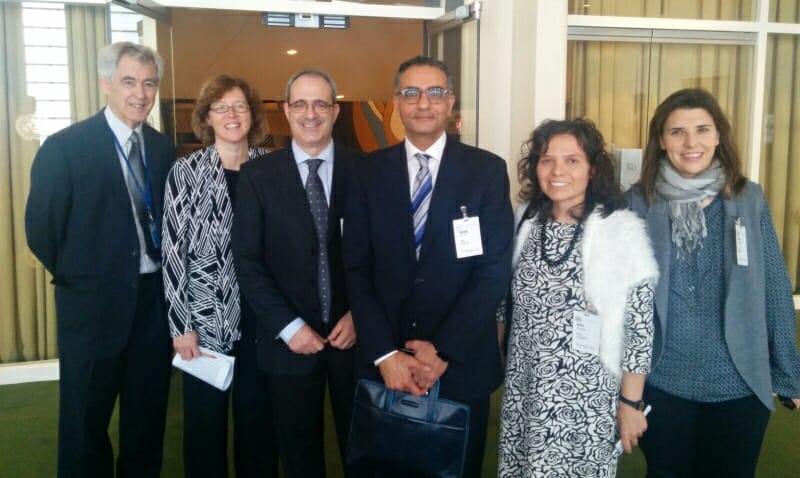
New York Conference on the Information Society
Taking stock 10 years from the World Summit on the Information Society (Tunis, 2004): building an information society that is focused on the human person; inclusive and oriented towards development; finding adequate forms of funding equitable development of communications infrastructures; identifying common mechanisms and the effective management of the Internet. How far have we come in the past 10 years? This was the question the General Assembly of the United Nations tried to answer at the Meeting dedicated to the WSIS+10 on the information society, at the United Nations General Headquarters, December 15-16, in New York. The work of evaluating was complex, with contributions from many analysts. It concluded with a final document that was unanimously adopted by the delegations of different countries. We spoke with Cesare Borin, who attended the forum with the New Humanity delegation, an NGO of the Focolare Movement. “Ever since WISIS 2003 in Geneva, and Tunis in 2005, the work of the United Nations has adopted a more open approach open to collaboration amongst a variety of players including members of civil society, such as New Humanity, the private sector, governments and international organisations. Already in Tunis we were part of a large group from NetOne that collaborated in experimental projects by the European Space Agency (ESA) and Alcatel. In the years that followed, we took part in several Internet Governance Forum (IGF) events always on behalf of New Humanity, and we established contacts with a number of people.” And now? What is the contribution of New Humanity to the specific topics that were discussed? ”There were six of us on the delegation: myself, a Brazilian, Maria Luiza Bigati; a Mexican, Maria del Rocio Ortega, both computer engineers; Betsy Dugas from the United States, who is also a computer engineer; Joe Klock and Anne Marie Cottone from the Permanent Representation of New Humanity at the United Nations Headquarters in New York.” In the preceding months, New Humanity had submitted its own contribution to the final document. The document is the result of a mediation process that examined important current issues of today such as terrorism, protecting human rights, protecting individual freedom. Comparing and contrasting a wide variety of sensibilities that each country emphasizes, and finding a common shared point signifies a great and important result. The WSIS has become a place of dialogue, no matter how strenuous, that can enable us to come up with new forms of ‘governance’.” The International New Humanity NGO has worked on community capacity building projects for over ten years, in the poorest communities of Africa’s Sub-Sahara region, in Asia and in Latin America. . . “Access to information has become one of the basic human rights of our age. Access is just as important as the basic rights of health and education. In our projects the main objective has always been to fully engage the local community, to say that the principles we talk about are not just wishful thinking.”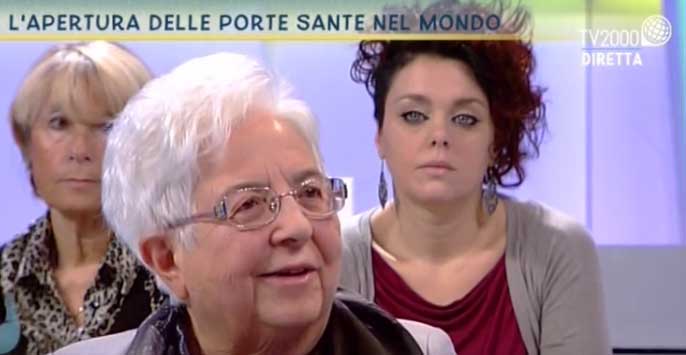
The Opening Of the Holy Doors: an interview with Maria Voce
 “Bel tempo si spera”, [Hoping for good times] is a programme broadcast by the Catholic Television Company TV2000. The programme on 14th December focused on subjects concerning the Jubilee, taking the viewers on a journey to several Cathedrals in the world, on the day after the opening of their Holy Doors. Maria Voce was in the studio, at the invitation of the presenter Lucia Ascione. Between one stage and another of this symbolic tour a dialogue took place on various subjects, starting with the meaning of the Jubilee. Maria Voce said, “The Year of Mercy gives us new courage to believe that God is Love. Now, when it seems that everything has become relative, we need to go back to what really matters, to believe in Love”. Later on, she added: “Unfortunately, modern culture speaks of anger, revenge, rights that have been trampled on, things that lead to sadness and despondency. We want to bring trust, forgiveness and mutual love. We want to look at the world as one family, the family of God’s children. And God is mercy, God is love.” “I like to recall – she went on – that the Pope did not open “the” Holy Door” but many holy doors. Pope Francis has said even the door of a prison cell can be a Holy Door. The door is a sign of the merciful love of the Father who is waiting for us all to come home, no-one excluded.” Lucia Ascione referred to Pope Francis’ words at the Angelus the previous day concerning the Focolare’s dialogue with Muslims. Maria Voce affirmed, “This harmonious encounter between people of different faiths that we experience did not happen yesterday, but has been built up day by day, over the years and in many places, through friendships; respecting difference.” Ascione insisted: “If it is so simple for you, why is it so hard for the world?” Maria Voce: “The Pope has said that unfortunately there is much self-interest. Instead we need to learn how to go beyond ourselves and be ready to welcome others, even if they are different. It is a love that we learn by loving, going towards others. Certainly, differences can make us fearful, that is true for everyone. It is a fear that can only be overcome with love. Taking up arms is of no use.” The presenter asked “You went to the United Nations and spoke there. What did you say to them? “I said that we need to convert ourselves, but not superficially. I said we must not see dialogue as one of many ways but as the only real way forward. It is difficult to accept this viewpoint because the “scandal of the cross” has not been understood. Mercy makes us do the part that the other should do, as Jesus did who died for each one of us.” Maria Voce explained “It is the experience that we have on a daily basis with those who knock on our doors. Recently 170 unaccompanied minors stayed in our little town in Holland and were made welcome”. Recalling the words of the press release that Maria Voce had issued after the Paris attacks, Ms Ascione asked: “What did you mean when you said we should ask ourselves whether everything that could have been done to avoid such violent reactions had been done?” “Very often we are affected by things that happen nearby, forgetting those that happen in other places where the horror of war is lived every day. We have communities in those places and we know that it is still possible to build something positive. We have doctors who don’t check to see whether a wounded person is a Christian or a Muslim; people who make their wells available to others when water is scarce, regardless of the religion they practice. Maybe we don’t know how to ask ourselves the right questions. That is why we questioned ourselves first of all. Perhaps we did not follow through with these things in the past. Being able to make an examination of conscience can open us up to hope. Seeing those who suffer, who are poor, we must not be afraid to open our hearts. We must not be afraid to empty our pockets and our wallets, to live simply and with respect for creation, seeing other people as brothers and sisters, part of the same family.”
“Bel tempo si spera”, [Hoping for good times] is a programme broadcast by the Catholic Television Company TV2000. The programme on 14th December focused on subjects concerning the Jubilee, taking the viewers on a journey to several Cathedrals in the world, on the day after the opening of their Holy Doors. Maria Voce was in the studio, at the invitation of the presenter Lucia Ascione. Between one stage and another of this symbolic tour a dialogue took place on various subjects, starting with the meaning of the Jubilee. Maria Voce said, “The Year of Mercy gives us new courage to believe that God is Love. Now, when it seems that everything has become relative, we need to go back to what really matters, to believe in Love”. Later on, she added: “Unfortunately, modern culture speaks of anger, revenge, rights that have been trampled on, things that lead to sadness and despondency. We want to bring trust, forgiveness and mutual love. We want to look at the world as one family, the family of God’s children. And God is mercy, God is love.” “I like to recall – she went on – that the Pope did not open “the” Holy Door” but many holy doors. Pope Francis has said even the door of a prison cell can be a Holy Door. The door is a sign of the merciful love of the Father who is waiting for us all to come home, no-one excluded.” Lucia Ascione referred to Pope Francis’ words at the Angelus the previous day concerning the Focolare’s dialogue with Muslims. Maria Voce affirmed, “This harmonious encounter between people of different faiths that we experience did not happen yesterday, but has been built up day by day, over the years and in many places, through friendships; respecting difference.” Ascione insisted: “If it is so simple for you, why is it so hard for the world?” Maria Voce: “The Pope has said that unfortunately there is much self-interest. Instead we need to learn how to go beyond ourselves and be ready to welcome others, even if they are different. It is a love that we learn by loving, going towards others. Certainly, differences can make us fearful, that is true for everyone. It is a fear that can only be overcome with love. Taking up arms is of no use.” The presenter asked “You went to the United Nations and spoke there. What did you say to them? “I said that we need to convert ourselves, but not superficially. I said we must not see dialogue as one of many ways but as the only real way forward. It is difficult to accept this viewpoint because the “scandal of the cross” has not been understood. Mercy makes us do the part that the other should do, as Jesus did who died for each one of us.” Maria Voce explained “It is the experience that we have on a daily basis with those who knock on our doors. Recently 170 unaccompanied minors stayed in our little town in Holland and were made welcome”. Recalling the words of the press release that Maria Voce had issued after the Paris attacks, Ms Ascione asked: “What did you mean when you said we should ask ourselves whether everything that could have been done to avoid such violent reactions had been done?” “Very often we are affected by things that happen nearby, forgetting those that happen in other places where the horror of war is lived every day. We have communities in those places and we know that it is still possible to build something positive. We have doctors who don’t check to see whether a wounded person is a Christian or a Muslim; people who make their wells available to others when water is scarce, regardless of the religion they practice. Maybe we don’t know how to ask ourselves the right questions. That is why we questioned ourselves first of all. Perhaps we did not follow through with these things in the past. Being able to make an examination of conscience can open us up to hope. Seeing those who suffer, who are poor, we must not be afraid to open our hearts. We must not be afraid to empty our pockets and our wallets, to live simply and with respect for creation, seeing other people as brothers and sisters, part of the same family.”
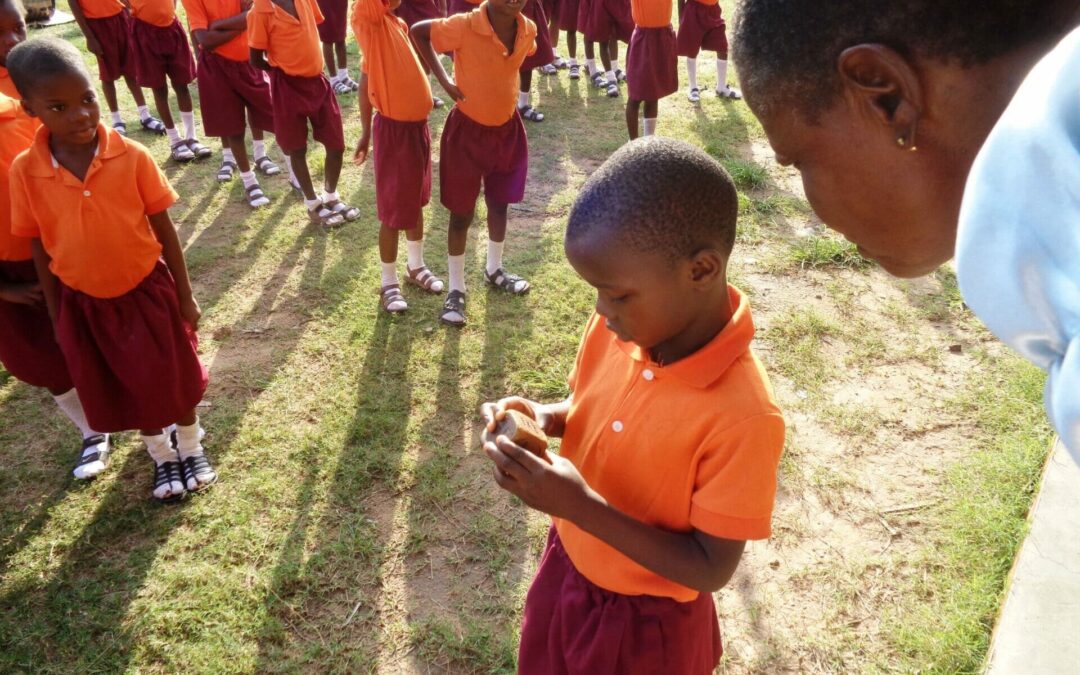
Nigeria: educating towards a culture of peace
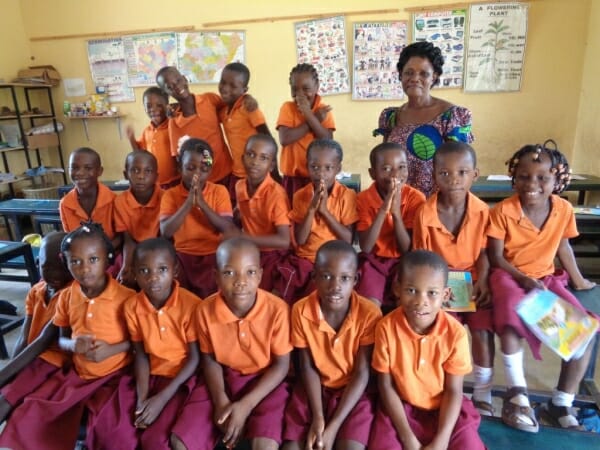 Education is one of the most important challenges the Nigerian schooling system has to face, and where at times Nigerian society has to deal with aggressive behavior and religious traditions that imbue fear and a sense of helplessness in the face of evil. “One day,” Christiane recounts, ” a mother stopped bringing her daughter to school because we had asked the parents to cut the hair of the children who were about to start the first year of nursery school. She said that someone who was believed to be in contact with spirits had told her that her daughter would die if she cut her hair. And this explained why the child no longer went to school.” Christiane who is of German origin, had worked for many years in the youth section of the Focolare. Through support from a distance project of the New Families association, today she still works with children in Igbariam, a village 40 km away from Onithsa city, south-east of Nigeria, and where the “Fraternity School” is established. The project started in 1995 as a result of the efforts of a group of the Focolare, which started in the 1980s a human promotion process to offer concrete development opportunities through deep relationships with the local people and respect for local traditions. “Through concrete acts of love for some children, an after-school club was formed, which later, slowly turned into a nursery and then an elementary school. Starting from the nursery school, the endeavour is to give the children a global education, preparing them to face the many challenges of this great nation.” Instituted in 2006, today the school counts 223 students, with 75 in the nursery and 148 in the primary school. With time, also the parents became involved in an educational and social project which avails of an educational method based on human values, a teaching style that believes in and respects the dignity of the child as a person. Attention is paid particularly to the smaller ones, just as the Gospel says, offering new tools for global human growth. For example, the “dice of love” is used, with which students and teachers live their daily commitment to peace and solidarity.
Education is one of the most important challenges the Nigerian schooling system has to face, and where at times Nigerian society has to deal with aggressive behavior and religious traditions that imbue fear and a sense of helplessness in the face of evil. “One day,” Christiane recounts, ” a mother stopped bringing her daughter to school because we had asked the parents to cut the hair of the children who were about to start the first year of nursery school. She said that someone who was believed to be in contact with spirits had told her that her daughter would die if she cut her hair. And this explained why the child no longer went to school.” Christiane who is of German origin, had worked for many years in the youth section of the Focolare. Through support from a distance project of the New Families association, today she still works with children in Igbariam, a village 40 km away from Onithsa city, south-east of Nigeria, and where the “Fraternity School” is established. The project started in 1995 as a result of the efforts of a group of the Focolare, which started in the 1980s a human promotion process to offer concrete development opportunities through deep relationships with the local people and respect for local traditions. “Through concrete acts of love for some children, an after-school club was formed, which later, slowly turned into a nursery and then an elementary school. Starting from the nursery school, the endeavour is to give the children a global education, preparing them to face the many challenges of this great nation.” Instituted in 2006, today the school counts 223 students, with 75 in the nursery and 148 in the primary school. With time, also the parents became involved in an educational and social project which avails of an educational method based on human values, a teaching style that believes in and respects the dignity of the child as a person. Attention is paid particularly to the smaller ones, just as the Gospel says, offering new tools for global human growth. For example, the “dice of love” is used, with which students and teachers live their daily commitment to peace and solidarity. 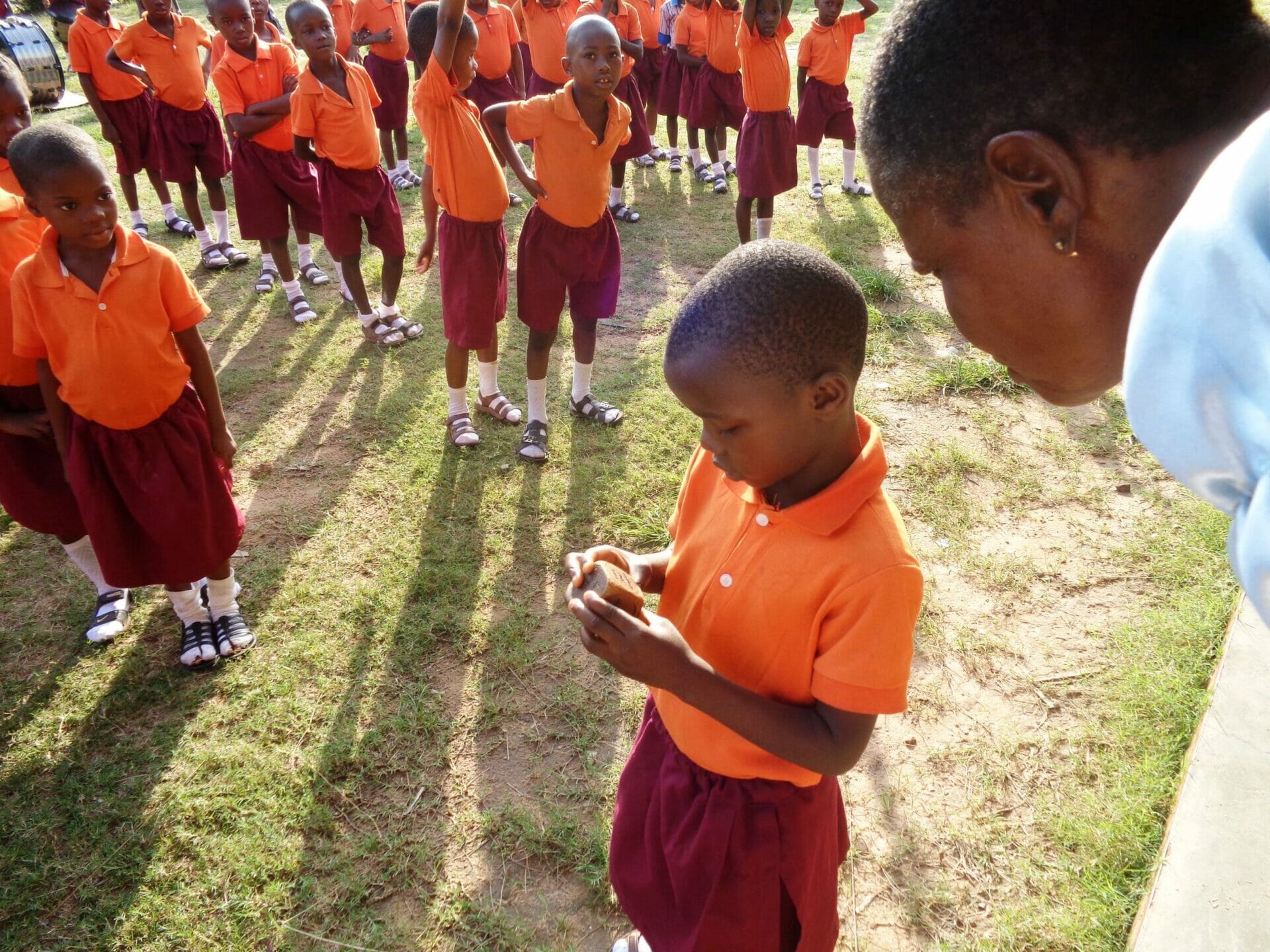 It is also a novelty since in many Nigerian schools, physical punishment is considered a necessary practice in the educational process. The idea in force is “Spare the rod and spoil the child,” and it is not easy to change this mentality. However, in an interview with the newly instituted “New City Nigeria,” Mrs. Akwobi of the Nwafor Orizu College of Education Nsugbe, affirmed that “current psychological studies have demonstrated that the negative effects of these corrective measures surpass the positive ones and that the children often become tense and aggressive with physical punishments. They are unable to empathise with the teachers and transfer this rejection to the subjects they teach.” Mrs Akwobi went on to say: “Instead, it is important that they are able to develop awareness in choosing the good and not only to avoid punishment. The teacher should behave as one who always has something to learn, because teaching is a two-way process. Listening to others, patience, and comprehension have a positive effect on the children and their learning abilities. Furthermore, adopting nonviolent measures in school relationships helps to also reduce the rate of violence in society. These educational principles are being implemented in the Fraternity School in Nigeria.” Christiane concluded by saying: “Here, many people leave to look for a better life in Europe. Our job aims at helping people to build a liveable experience in their own countries. Thank you for whatever help you can give! You cannot imagine how much it is helping us to proceed with social works, spread a new culture, and contribute to the development of this country based on Christian love.” Solidarity at a distance: http://www.afnonlus.org/
It is also a novelty since in many Nigerian schools, physical punishment is considered a necessary practice in the educational process. The idea in force is “Spare the rod and spoil the child,” and it is not easy to change this mentality. However, in an interview with the newly instituted “New City Nigeria,” Mrs. Akwobi of the Nwafor Orizu College of Education Nsugbe, affirmed that “current psychological studies have demonstrated that the negative effects of these corrective measures surpass the positive ones and that the children often become tense and aggressive with physical punishments. They are unable to empathise with the teachers and transfer this rejection to the subjects they teach.” Mrs Akwobi went on to say: “Instead, it is important that they are able to develop awareness in choosing the good and not only to avoid punishment. The teacher should behave as one who always has something to learn, because teaching is a two-way process. Listening to others, patience, and comprehension have a positive effect on the children and their learning abilities. Furthermore, adopting nonviolent measures in school relationships helps to also reduce the rate of violence in society. These educational principles are being implemented in the Fraternity School in Nigeria.” Christiane concluded by saying: “Here, many people leave to look for a better life in Europe. Our job aims at helping people to build a liveable experience in their own countries. Thank you for whatever help you can give! You cannot imagine how much it is helping us to proceed with social works, spread a new culture, and contribute to the development of this country based on Christian love.” Solidarity at a distance: http://www.afnonlus.org/
The Netherlands: Giving a home
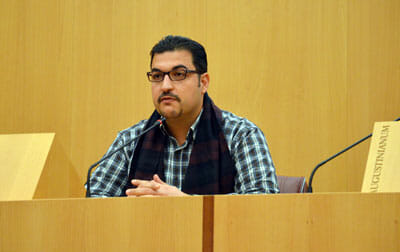
Muslims and Christians Step Onto the Field for Fraternity
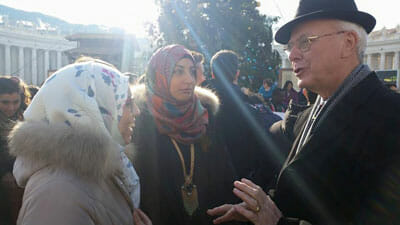 “Carry on! Carry on with courage along the road of dialogue and brotherhood, because we are all children of God!” Pope Francis forcefully told the hundred people from the Focolare and several Italian Muslim communities at the end of the December 13th Angelus. They had come together to testify to their common journey that has been underway for many years, “Christians and Muslims Together in Building Peace,” as the banner they held read on Saint Peter’s Square. There were imams with their communities from Rome, Trieste, Teramo, and Catania, young women and teenagers from the Mosque of Centocelle in Rome, families and children, scholars and journalists. There was also a delegation from the Buddhist, Risho Kosei Kai Movement, and representatives from Religions for Peace and from other religions. From the festive atmosphere on Saint Peter’s Square, the group of 400 people moved to the seat of the Augustinianum which is just a few hundred metres from the colonnade surrounding Saint Peter’s Square. The lunch they shared provided a setting for some jovial interaction that everyone was looking forward to; there was a prayer room for Muslims; Mass for Catholics – such an unusual event that it was widely covered in the press.
“Carry on! Carry on with courage along the road of dialogue and brotherhood, because we are all children of God!” Pope Francis forcefully told the hundred people from the Focolare and several Italian Muslim communities at the end of the December 13th Angelus. They had come together to testify to their common journey that has been underway for many years, “Christians and Muslims Together in Building Peace,” as the banner they held read on Saint Peter’s Square. There were imams with their communities from Rome, Trieste, Teramo, and Catania, young women and teenagers from the Mosque of Centocelle in Rome, families and children, scholars and journalists. There was also a delegation from the Buddhist, Risho Kosei Kai Movement, and representatives from Religions for Peace and from other religions. From the festive atmosphere on Saint Peter’s Square, the group of 400 people moved to the seat of the Augustinianum which is just a few hundred metres from the colonnade surrounding Saint Peter’s Square. The lunch they shared provided a setting for some jovial interaction that everyone was looking forward to; there was a prayer room for Muslims; Mass for Catholics – such an unusual event that it was widely covered in the press.
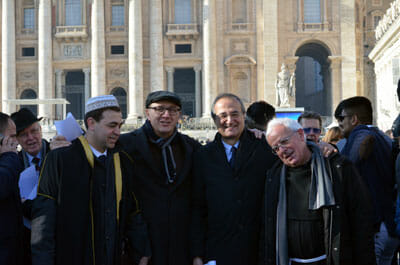
From left: Imam Maher Akkad, Antonio Olivero, Michele Zanzucchi, father Egidio Canil

Amjad Zedan, a Syrian student from Sophia University Institute
Pope Francis to gathering of Christians and Muslims: “Go ahead with courage and through dialogue”
https://vimeo.com/148880588 ITALIAN with ENGLISH subtitles
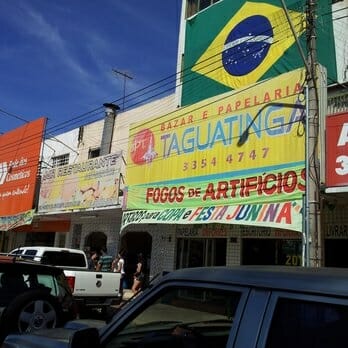
Economy of Communion: on the side of the beneficiaries
 It is impressive to discover that not only is there no exploitation and unfair competition, but also no play on interest rates. These entrepreneurs, like those who have signed up for an Economy of Communion (EoC) – about a thousand throughout the world – pursue the objective of profits that ensure vitality and continuity to their businesses, and wish to live the ”culture of giving” according to the finalities of the project itself: to help the formation and education of the young generations towards this new mentality. Thus they freely and concretely place a part of their turnover at the service of the project. Socoro and Gomes, Brazilians live in Taguantinga City, in the Federal District. They already had six children when he lost his job because he was an alcoholic. To maintain the family, she worked as a household helper, but earned very little. Left by themselves, the children became so disoriented to the point that the eldest, an adolescent, got involved in drugs. The Focolare came to their aid and offered the boy a job in the Fazenda da Esperança, a rehab community inspired by the spirituality of the Focolare. The family also had to shoulder serious housing problems, since their house was not only a makeshift one but also too small for such a big family. They also risked losing the house since they had stopped paying the person who had given them a loan. They presented this problem to the EoC Commission of their region. After a careful analysis, they were offered a loan to cover the late payments, to be paid back according to their capacity to do so. Meanwhile, Gomes started a small business with gas bottles, but because of his alcoholism was unable to keep up with it. Those were really difficult times for them. In addition to their serious economic difficulties, there were squabbles and lack of dialogue. Amid all this, Gomes suffered a heart attack. Unexpectedly, Socoro was offered a permanent job, as a household helper to a Cardinal, who employed her with a regular contract and a just salary. One day when he went to visit the family, he had an important chat with Gomes, who decided to give up his addiction and change his lifestyle. Later on the EoC Commission also visited them to verify their housing situation, and on that occasion offered to insert them in the Habitaçao project within the EoC framework, which provides for the restructuring or renovation of houses for extremely poor families. «When I was told about this– confided Socoro – I was really moved. I had the sensation that God himself was giving us this possibility.» The renovation work was mostly done by members of the Focolare community, some of them worked from 5.30 am to 7 pm. Now the house has a living room, bathroom, master’s bedroom and one for the boys and another for the girls. Living in a house with these requisites helps its inhabitants to regain their personal dignity. Gomes is completely rehabilitated, and has become another person altogether. The couple’s older daughters are now in university, thanks to a scholarship. «Seeing our daughters so committed to their studies– says Gomes – made me also feel the urge to enroll in a course for adults to obtain a diploma.» Even though he had not studied for 38 years, it was a challenge he wanted to meet. In the class, he learned to overcome his shame for being the oldest among the students. His kindness helped him to achieve his goal. When the results of the exams for the Bank of Brasilia and the Ministry of Tourism were given, he managed to classify among the top 200 and was employed in the bank as a clerk.
It is impressive to discover that not only is there no exploitation and unfair competition, but also no play on interest rates. These entrepreneurs, like those who have signed up for an Economy of Communion (EoC) – about a thousand throughout the world – pursue the objective of profits that ensure vitality and continuity to their businesses, and wish to live the ”culture of giving” according to the finalities of the project itself: to help the formation and education of the young generations towards this new mentality. Thus they freely and concretely place a part of their turnover at the service of the project. Socoro and Gomes, Brazilians live in Taguantinga City, in the Federal District. They already had six children when he lost his job because he was an alcoholic. To maintain the family, she worked as a household helper, but earned very little. Left by themselves, the children became so disoriented to the point that the eldest, an adolescent, got involved in drugs. The Focolare came to their aid and offered the boy a job in the Fazenda da Esperança, a rehab community inspired by the spirituality of the Focolare. The family also had to shoulder serious housing problems, since their house was not only a makeshift one but also too small for such a big family. They also risked losing the house since they had stopped paying the person who had given them a loan. They presented this problem to the EoC Commission of their region. After a careful analysis, they were offered a loan to cover the late payments, to be paid back according to their capacity to do so. Meanwhile, Gomes started a small business with gas bottles, but because of his alcoholism was unable to keep up with it. Those were really difficult times for them. In addition to their serious economic difficulties, there were squabbles and lack of dialogue. Amid all this, Gomes suffered a heart attack. Unexpectedly, Socoro was offered a permanent job, as a household helper to a Cardinal, who employed her with a regular contract and a just salary. One day when he went to visit the family, he had an important chat with Gomes, who decided to give up his addiction and change his lifestyle. Later on the EoC Commission also visited them to verify their housing situation, and on that occasion offered to insert them in the Habitaçao project within the EoC framework, which provides for the restructuring or renovation of houses for extremely poor families. «When I was told about this– confided Socoro – I was really moved. I had the sensation that God himself was giving us this possibility.» The renovation work was mostly done by members of the Focolare community, some of them worked from 5.30 am to 7 pm. Now the house has a living room, bathroom, master’s bedroom and one for the boys and another for the girls. Living in a house with these requisites helps its inhabitants to regain their personal dignity. Gomes is completely rehabilitated, and has become another person altogether. The couple’s older daughters are now in university, thanks to a scholarship. «Seeing our daughters so committed to their studies– says Gomes – made me also feel the urge to enroll in a course for adults to obtain a diploma.» Even though he had not studied for 38 years, it was a challenge he wanted to meet. In the class, he learned to overcome his shame for being the oldest among the students. His kindness helped him to achieve his goal. When the results of the exams for the Bank of Brasilia and the Ministry of Tourism were given, he managed to classify among the top 200 and was employed in the bank as a clerk.
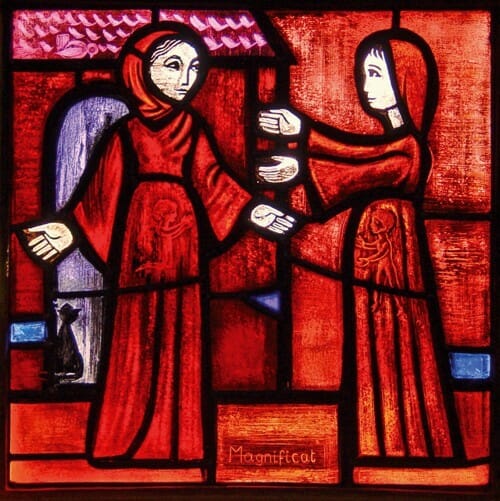
Igino Giordani: Mercy in the Magnificat
At the centre of the Magnificat, which gathers momentum from the prophets with the promise of salvation, there is a mention of Divine Mercy that could seem like a rhetorical addition. It seems to me that the reference to the mercy of the Father, at the centre of Mary’s song, is of capital importance and contains the concise explanation for all the exuberant divine facts that give unheard of beauty and steady immediacy to the poetic outburst of the fifteen year old girl who carried and grew Jesus in her womb. In the first part, Mary exalts “the Almighty who has done great things” to His “servant” so that all generations shall call her blessed. God had done the miracle of the Incarnation of the Word, through a poor and humble girl from an obscure village of Israel; an act that will lead to the salvation of humanity of all times. Thus she observes: “His name is holy – and his mercy extends from generation to generation …”. Redemption originates in an act of compassion by the Heavenly Father towards his children. If He accomplished that prodigy of love, which only a God could accomplish, of his Son being born of a woman of the people and have him die for the sake of the people, it is all due to an act of mercy, a miracle of mercy that is love raised to its peak. This demands that we pardon our brother not only seven times, but up to seventy times seven time; that is, always, all the way to infinity; that we love him to the point of giving up our life for him. God “has helped his servant, Israel – ever mindful of his mercy. . .” Everything in the divine government everything leads back to mercy. This will be clarified and confirmed in the demeanour of Jesus – out of love for whom Mary speaks – when He will feed the crowds and cure the sick; when he will drive the sellers from the Temple and raise his voice against the Pharisees and the proud. The Magnificat is the anthem of the Christian revolution. But its most revolutionary aspect lies in its origin: mercy. This is why it does not destroy, but creates; because love for God and man does not produce anything else but good. The Magnificat gives the directives of the evolutionary process, mutation and rebirth, in which the Gospel ideal is translated socially and politically, as well as spiritually; a mutation that originates in love and is embodied in mercy. There is a new urgent need for such an ideal today. Ideologies and protests, guerrilla warfare and revolt are breaking out everywhere. They call for greater and beautiful aspirations while they introduce hateful programs of destruction. Mary teaches how to orient and construct this revolution. She is a woman, the Mother of God, who teaches both with word and life: the life of the Mother of Mercy. Her example is worth even more today, as it revalues femininity. Mary teaches us the path of mercy. By now the absurdity and uselessness of wars is acknowledge, that is, hatred, and the need for rational systems focused on dialogue, negotiation and, above all, of intervention and gifts from those who have, in favour of those who have not. We can see it: sending arms and money to help this or that population serves only to increase the conflicts in which people suffer, agonise and die; and to plant seeds of hatred against the very givers. The perspective of that young woman, who sang her Magnificat, the method of mercy, amongst the poor, is the perspective of the divine and human intelligence, the only one capable of resolving the problem of a world threatened by the ultimate definitive catastrophe, provoked by the stupidity of hatred and the drug of suicide. To have peace and wellbeing again, we need to take care of the material and moral wounds of those who suffer, from whatever side of the ocean, in Europe and in Asia, in America and in Africa, using a compassion that is the fruit of understanding; a charity that was not grow weak, but abolishes injustices and selfishness, to transform coexistence into community, and nations into a family. Jesus, the Son of Mary wants it to be so, as Mary his Mother assures. Igino Giordani, in Mater Ecclesiae, 4, 1970. www.iginogiordani.infoEnvironmental protection is also a matter of justice
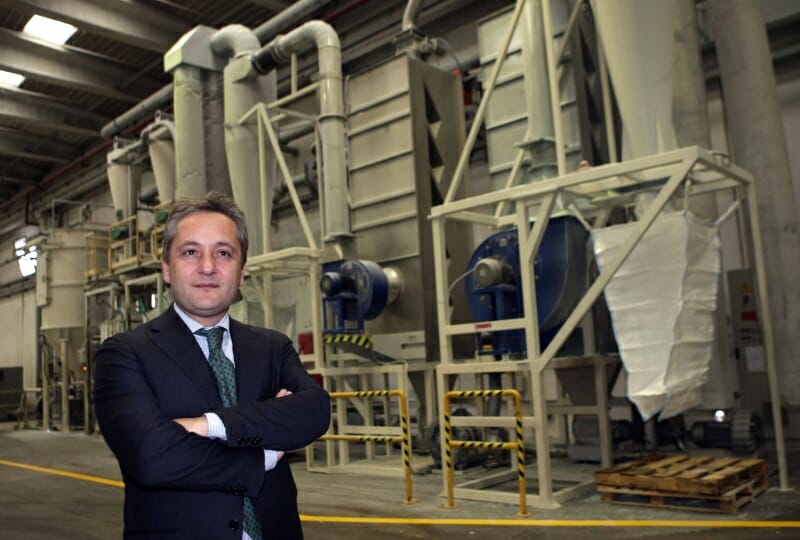
Business, Legality, Environment: A Win-Win Challenge
Doing business today is no easy “business.” Especially in Caserta, a region of southern Italy known as the “land of fire” because of its toxic waste dumps. Yet, it is a “splendid land,” said Bishop D’Alise during the visit of Pope Francis – that has become a dumping ground of waste. The unemployment takes your breath away and steals away the hope of upcoming generations.” An interview with Antonio Diana, president of Erreplast, a local waste recycling industry: How did it happen that you found yourself at the head of a business like yours? On June 26, 1985, my father, Mario Diana, a business owner, became an innocent victim of the camorra, leaving our family at a crossroads: to seek a future in more peaceful territories, or continue to bear witness that the social, moral and cultural rebirth of this region is possible. Along with many honest people, after thirty years we can say that we have also contributed in some modest way to restoring hope to the youth and to the territories of this province.” But really, can you run a business in an ethical manner in a context that is so problematic, and in such a critical sector as waste? “You can, provided you don’t comply with the common practices of staying on the market while falling into comprimises. Even though the risk of appearing folly, it is concrete. At present, the group consists of 5 businesses, more than 160 people, a volume of deals amounting to 40 million Euros, 5 industiral collection and recycling plants fore recycling and waste packaging of more than 80,000 tons per year.” “We know that in your programmes besides the ongoing innovation in work practices, particular attention is given to the environment, sustainability. . . “In June 2013 we created a Foundation named after my father, whose goal is to promote projects in favour of the environment and of the local region, appreciation of botht the national and local historical and artistical culture, and the education of young people with projects carried out in collaboration with universities.” How can you manage to stay afloat despite the competitiveness? “We know that the so-called black market, counterfeiting, money lender loans and corruption interfere with the mechanisims of the market and disrupt competition. Those who act illegally do have advantages when it comes to competition, but they never generate a healthy industrial system, which is the backbone of advanced societies. But, whereas illegal behavour in the long run dulls the ability to grow skill and creativity, the best practices of legality lead to flexibility and efficiency that lead to improvement in the quality of processes and products. Long-term projects, regular hiring and paying, avoiding waste, disposing of waste properly – all this allows the business to be competitive in the real market economy.” You you say a few words about human resources? “I’ve always tried to create a workplace that combines economic results with the advancement of society. I’m convinced that a business needs to discover that it is essentially a community of flesh –and-blood people, people who give meaning to what they do when they recognise the contribution they are giving to society. And this is achieved by acknowledging and appreciating the dignity of each person’s work, through transparency and sharing of the projects.”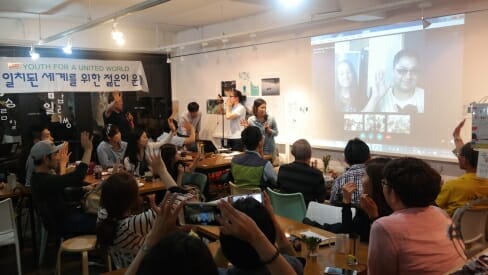
South Korea: families and young people in solidarity
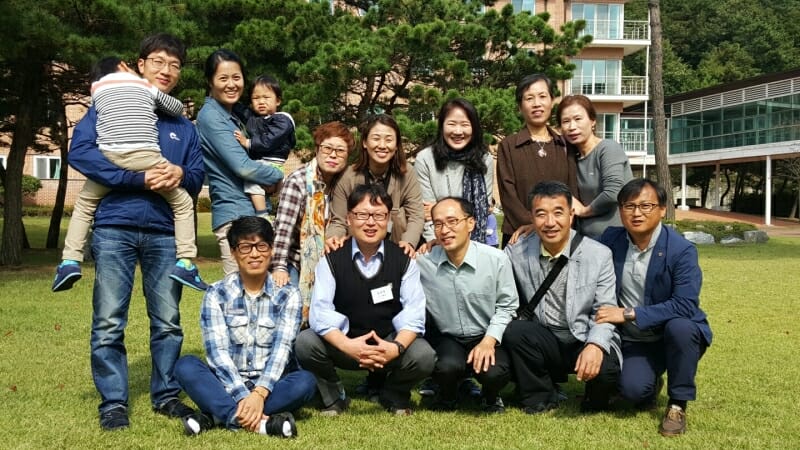 In 2015, in conjunction with the Synod on the Family, the activities certainly could not have gone by without some exclusive event organised by the Focolare families that are very active in South Korea. In this time of crisis in family relationships, in the Chong Hasang Education Center of Seoul, and simultaneously in Pohang, the 2-4 October weekend was dedicated to a ”School of forgiveness for couples” held for 120 couples. In the end, the couples all agreed on the need for true dialogue between spouses. “Instead of burying pettiness and hurt feelings – a couple said – we have to face the situation with courage, discuss it, and ask and receive pardon.” It was a dialogue we experimented on and which they now believe to be essential to renew, and be able to communicate to each other, the things they are unable to say.
In 2015, in conjunction with the Synod on the Family, the activities certainly could not have gone by without some exclusive event organised by the Focolare families that are very active in South Korea. In this time of crisis in family relationships, in the Chong Hasang Education Center of Seoul, and simultaneously in Pohang, the 2-4 October weekend was dedicated to a ”School of forgiveness for couples” held for 120 couples. In the end, the couples all agreed on the need for true dialogue between spouses. “Instead of burying pettiness and hurt feelings – a couple said – we have to face the situation with courage, discuss it, and ask and receive pardon.” It was a dialogue we experimented on and which they now believe to be essential to renew, and be able to communicate to each other, the things they are unable to say. 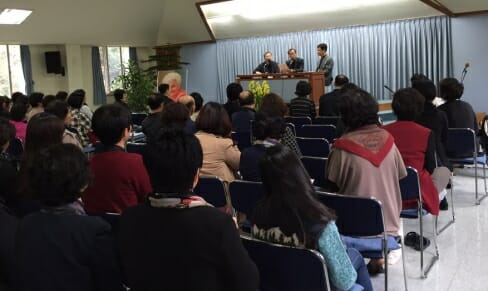 Also the people involved in the parish – 119 of them from all the dioceses of South Korea – had their moment of growth. Accompanied by 18 priests and five religious, on 26 October they reflected on the ”Parish, home of friendship, school of communion.” It was a day lived in the spirituality of unity to contribute to the quality of service to the parish, in full communion of the laity amongst themselves and with the priests, beyond all differences in roles, age, and viewpoints. The testimonials confirmed that misunderstanding and conflicts can be overcome through mutual charity, and unity be reached through reconciliation. All of this was to the benefit of the parish community.
Also the people involved in the parish – 119 of them from all the dioceses of South Korea – had their moment of growth. Accompanied by 18 priests and five religious, on 26 October they reflected on the ”Parish, home of friendship, school of communion.” It was a day lived in the spirituality of unity to contribute to the quality of service to the parish, in full communion of the laity amongst themselves and with the priests, beyond all differences in roles, age, and viewpoints. The testimonials confirmed that misunderstanding and conflicts can be overcome through mutual charity, and unity be reached through reconciliation. All of this was to the benefit of the parish community.  “A day at the cafe for Nepal.” Objective: to raise funds for Ramjung where there had been that terrible earthquake last April. This was the invitation launched by the Youth for a united world on Saturday, 5 September, in a bar in Seoul. The key moment was the video-connection with three other Asian cities, Katmandu, Mumbai and precisely India, from which came the story of those who managed to send aid to Nepal: doing part-time jobs, and organizing dinners and concerts. One of them was Natasha who despite being jobless donated 5,000 rupees, and after that experienced the gospel’s hundredfold: three days later she was hired by a company. It has now become a tradition. In a dining hall reserved for the deputies of the Korean parliament, the Focolare held, for those who wished to attend, the monthly Social Forum for unity that reached its 32nd edition on 17 September. In that session they presented the “Rainbow Dream Project,” an educational, recreational program for schools that started out from an integral vision of the person (white, as the colour of light) intercepting the seven main educational aspects (corresponding to the seven colours of the rainbow). Each colour was matched with a behavioural attitude which in turn embraced multifaceted dimensions, while keeping a unitary focus that adjusts to the specific situations the student has to face. The project also provided a community reading session of a phrase from the Gospel at the start of each month, which alternated with the sharing of concrete experiences on this phrase, broadcasted on radio. This project has been ongoing in the Maegoe High School of Chungbuk since 2009. At that time, someone who was worried about the new assignment as Dean, had suggested to Fr. Matteo Park to introduce the spirituality of unity in the school syllabus. Saturday, 28 November saw the launch of the “Bring carbon” Project of the Youth for a united world. Carbon and fuel were donated to the elderly abandoned people living alone, to heat up their homes. But it is just an excuse to touch base, and to arouse awareness in the youth. “Open the taps – one of them surprisingly wrote – and there is abundant hot water running; press a button and the heater warms up the whole house, and you can stretch out under a comforter and watch TV. This was what I used to consider as an ordinary winter day. And I thought that it was but natural for everyone … but now I know that there is someone next to me who needs my love…..”
“A day at the cafe for Nepal.” Objective: to raise funds for Ramjung where there had been that terrible earthquake last April. This was the invitation launched by the Youth for a united world on Saturday, 5 September, in a bar in Seoul. The key moment was the video-connection with three other Asian cities, Katmandu, Mumbai and precisely India, from which came the story of those who managed to send aid to Nepal: doing part-time jobs, and organizing dinners and concerts. One of them was Natasha who despite being jobless donated 5,000 rupees, and after that experienced the gospel’s hundredfold: three days later she was hired by a company. It has now become a tradition. In a dining hall reserved for the deputies of the Korean parliament, the Focolare held, for those who wished to attend, the monthly Social Forum for unity that reached its 32nd edition on 17 September. In that session they presented the “Rainbow Dream Project,” an educational, recreational program for schools that started out from an integral vision of the person (white, as the colour of light) intercepting the seven main educational aspects (corresponding to the seven colours of the rainbow). Each colour was matched with a behavioural attitude which in turn embraced multifaceted dimensions, while keeping a unitary focus that adjusts to the specific situations the student has to face. The project also provided a community reading session of a phrase from the Gospel at the start of each month, which alternated with the sharing of concrete experiences on this phrase, broadcasted on radio. This project has been ongoing in the Maegoe High School of Chungbuk since 2009. At that time, someone who was worried about the new assignment as Dean, had suggested to Fr. Matteo Park to introduce the spirituality of unity in the school syllabus. Saturday, 28 November saw the launch of the “Bring carbon” Project of the Youth for a united world. Carbon and fuel were donated to the elderly abandoned people living alone, to heat up their homes. But it is just an excuse to touch base, and to arouse awareness in the youth. “Open the taps – one of them surprisingly wrote – and there is abundant hot water running; press a button and the heater warms up the whole house, and you can stretch out under a comforter and watch TV. This was what I used to consider as an ordinary winter day. And I thought that it was but natural for everyone … but now I know that there is someone next to me who needs my love…..”
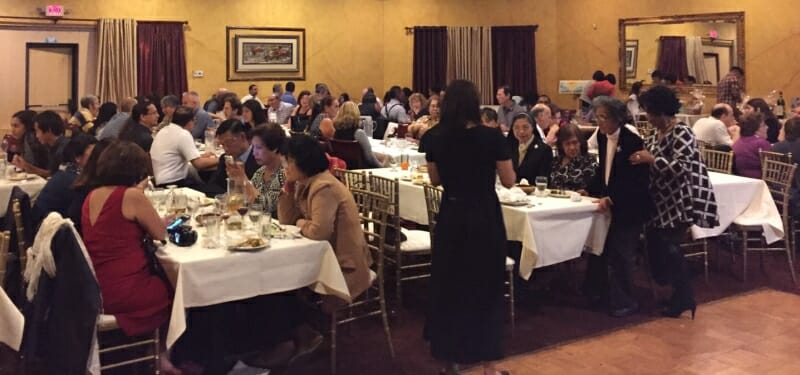
Artisans of peace on the increase
All of us here are involved in helping refugees to integrate in our coundry,” they write from Germany. “Some of us give German lessons, some provide lodging, some give of their time to be with the refugees. We are currently waiting for the arrival of 9 unaccompanied minors from Syria and Afghanistan. They’ll live for six months at our centre in Ottmaring where they will be assisted by social workers from the city.” 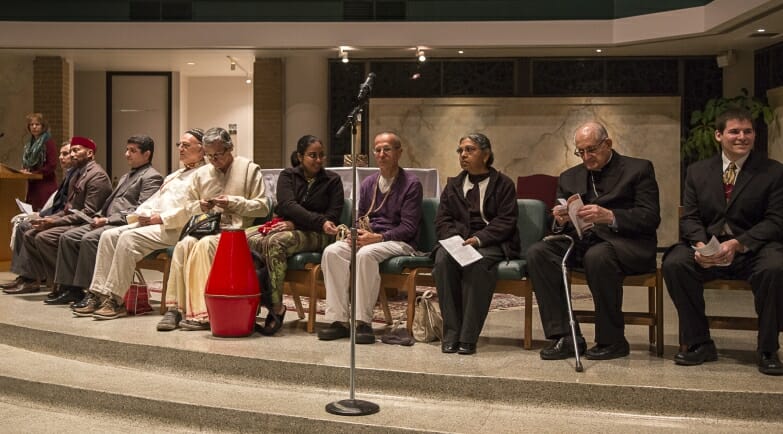 “Here in Dallas,” they write from Texas, “we held a peace march to raise funds for Syrian refugees.” “In Houston “We got together for a day of team building. With games, work groups, and so forth we learned how to be a team. On November 22 we held an interreligious prayer for peace. It was attended by Jews, Muslims, Hindus and Christians. The Archbishop also joined us.”
“Here in Dallas,” they write from Texas, “we held a peace march to raise funds for Syrian refugees.” “In Houston “We got together for a day of team building. With games, work groups, and so forth we learned how to be a team. On November 22 we held an interreligious prayer for peace. It was attended by Jews, Muslims, Hindus and Christians. The Archbishop also joined us.”  From California they tell us that the benefit dinner for refugees from the Middle East included a hundred people from different cultures and Churches. After praying for the victims of the terrorist attacks in Beirut and Paris, some young people presented several of their projects for refugees, from around the world, which are connected to the United World Project, an international platform for providing visibility to small and large-scale projects. Everyone agreed that through dialogue everyone can sow hope in their own corners of the world. A benefit dinner will also be held in San Francisco in December. “From October 30th, at Centro Luminosa in Spain, a community prayer service will be held every Saturday evening, animated by different groups of people each time: youth, families, priests. . .) It will be the starting point for becoming more actively involved in concrete efforts for peace. There was a very energetic response from Bahia Blanca, Argentina, following the November 20th event in the Square. The idea was to invite everyone – absolutely everyone – to learn more about building peace. The launching of the event which was covered by a local radio station, was then broadcast on social media. At 19:30 the Square began to be covered in colour and music. Banners, posters and fliers offered ideas on how to resolve conflicts through dialogue and thus generate peace: giving a smile, discussing without shouting, doing to others what you would have done to you, and so on. On stage there were songs, brief presentations and dances (one choir offered to sing because of an invitation on Facebook.) “The experience of today is only a first step, which confirms that when you are together small things become powerful. And so it is urgent that we get moving beginning with our daily life.” In Parana, Argentina, the local community organised two ecumenical evenings of prayer for peace and for the persecuted because of their faith, animated by members of the different Churches with whom they are in contact. With testimonies of refugees and the families that took them in, besides the heartfelt prayer, they wanted to give visibility to the amount of road we have already covered in learning about, welcoming and including others. From Tokyo, Japan, they report a large sum of money that was gathered at the “Syrian Cafe” (a place for encounter and dialogue), which will be sent to Damascus. And we add that in Asunción, Paraguay, on December 18-20 there will be a camp for peace, organised by Teens for Unity, one of the junior sections of the Focolare.
From California they tell us that the benefit dinner for refugees from the Middle East included a hundred people from different cultures and Churches. After praying for the victims of the terrorist attacks in Beirut and Paris, some young people presented several of their projects for refugees, from around the world, which are connected to the United World Project, an international platform for providing visibility to small and large-scale projects. Everyone agreed that through dialogue everyone can sow hope in their own corners of the world. A benefit dinner will also be held in San Francisco in December. “From October 30th, at Centro Luminosa in Spain, a community prayer service will be held every Saturday evening, animated by different groups of people each time: youth, families, priests. . .) It will be the starting point for becoming more actively involved in concrete efforts for peace. There was a very energetic response from Bahia Blanca, Argentina, following the November 20th event in the Square. The idea was to invite everyone – absolutely everyone – to learn more about building peace. The launching of the event which was covered by a local radio station, was then broadcast on social media. At 19:30 the Square began to be covered in colour and music. Banners, posters and fliers offered ideas on how to resolve conflicts through dialogue and thus generate peace: giving a smile, discussing without shouting, doing to others what you would have done to you, and so on. On stage there were songs, brief presentations and dances (one choir offered to sing because of an invitation on Facebook.) “The experience of today is only a first step, which confirms that when you are together small things become powerful. And so it is urgent that we get moving beginning with our daily life.” In Parana, Argentina, the local community organised two ecumenical evenings of prayer for peace and for the persecuted because of their faith, animated by members of the different Churches with whom they are in contact. With testimonies of refugees and the families that took them in, besides the heartfelt prayer, they wanted to give visibility to the amount of road we have already covered in learning about, welcoming and including others. From Tokyo, Japan, they report a large sum of money that was gathered at the “Syrian Cafe” (a place for encounter and dialogue), which will be sent to Damascus. And we add that in Asunción, Paraguay, on December 18-20 there will be a camp for peace, organised by Teens for Unity, one of the junior sections of the Focolare.
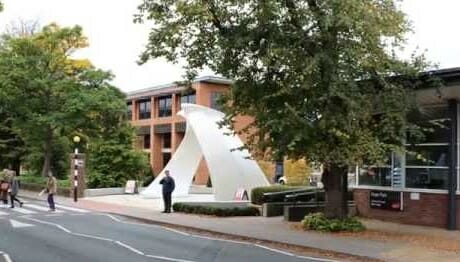
A new gate for Hope Park designed by Ave Art Centre
 A new gate has been opened at Hope Park, Liverpool, to replace the tall walls that have historically separated the colleges of Hope University , England. The new architectural structure joins two university schools, one Roman Catholic and the other Anglican, which comprise the first and only ecumenical university of Europe. The exhibition, which was inaugurated on 28 September, was organised by the Ave Arts Centre in Loppiano. The seven artists who work there aim to express, through their artwork, the ideals of unity and universal brotherhood which inspired Chiara Lubich. The partnership with the art studio was born from a visit by Vice-Chancellor and Rector, Dr. Phillay to the Internationanl Centre of Loppiano for a conference at Sophia University Institute. At the dedication ceremony of the New Gate, the Vice-Chancellor explained the inspiration for the shape and design of the gate which stems from the tradition of the Maori people in New Zealand, whose villages had “Waharoa,” an open gate that became a symbol of the village and a sign of openness and welcome to guests and visitors. “In the same way,” continued Dr. Phillay, “this new gate marks the entrance for students and professors into the ‘community of life’ of Hope University, focused – in accordance with the orientation of Cardinal John Henry Newman, towards a wholisitc cultural and human formation, capable of ‘accepting the value of one’s own academic discipline within the context of all the others.” Nunzia Bertali, from the Italian Consulate, officially inaugurated the New Gate by cutting the ribbon. She said: “What a great occasion and privilege to be asked to inaugurate the New Gate. I can only be proud of this link between England and Italy. It is a fantastic idea and great opportunity to link the two countries.” Watch the video. New Gate, inspiration at the service of unity Sculptress Erika Ivacson from the Ave Centre, described the New Gate in this way: “It is an arch, a bridge that is born from the encounter between two similar yet distinct elements. In the language of sculpture the two distinct forms have reached a harmony and a unity in diversity. Passing through the New Gate, anyone should find themself in a fulfilling experience that points to something greater, to belonging and identity. The Biblical texts inserted on the interior of the sculpture echo the message. And as the plaque at the side of the sculpture states: May passing through this gate each day be a living affirmation of the ecumenical foundations of this univeristy.
A new gate has been opened at Hope Park, Liverpool, to replace the tall walls that have historically separated the colleges of Hope University , England. The new architectural structure joins two university schools, one Roman Catholic and the other Anglican, which comprise the first and only ecumenical university of Europe. The exhibition, which was inaugurated on 28 September, was organised by the Ave Arts Centre in Loppiano. The seven artists who work there aim to express, through their artwork, the ideals of unity and universal brotherhood which inspired Chiara Lubich. The partnership with the art studio was born from a visit by Vice-Chancellor and Rector, Dr. Phillay to the Internationanl Centre of Loppiano for a conference at Sophia University Institute. At the dedication ceremony of the New Gate, the Vice-Chancellor explained the inspiration for the shape and design of the gate which stems from the tradition of the Maori people in New Zealand, whose villages had “Waharoa,” an open gate that became a symbol of the village and a sign of openness and welcome to guests and visitors. “In the same way,” continued Dr. Phillay, “this new gate marks the entrance for students and professors into the ‘community of life’ of Hope University, focused – in accordance with the orientation of Cardinal John Henry Newman, towards a wholisitc cultural and human formation, capable of ‘accepting the value of one’s own academic discipline within the context of all the others.” Nunzia Bertali, from the Italian Consulate, officially inaugurated the New Gate by cutting the ribbon. She said: “What a great occasion and privilege to be asked to inaugurate the New Gate. I can only be proud of this link between England and Italy. It is a fantastic idea and great opportunity to link the two countries.” Watch the video. New Gate, inspiration at the service of unity Sculptress Erika Ivacson from the Ave Centre, described the New Gate in this way: “It is an arch, a bridge that is born from the encounter between two similar yet distinct elements. In the language of sculpture the two distinct forms have reached a harmony and a unity in diversity. Passing through the New Gate, anyone should find themself in a fulfilling experience that points to something greater, to belonging and identity. The Biblical texts inserted on the interior of the sculpture echo the message. And as the plaque at the side of the sculpture states: May passing through this gate each day be a living affirmation of the ecumenical foundations of this univeristy.
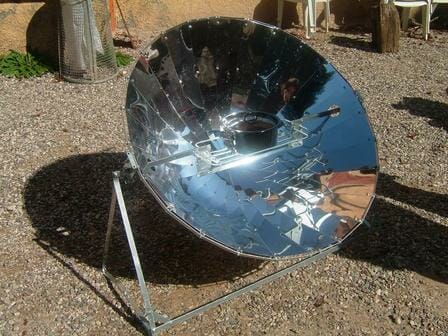
Cop21: solar kitchens for Haiti
 The Solar kitchen project for Mont-Organisé (Haiti) «was conceived due to the desire to help Haiti counter its social and environmental crisis related to deforestation, through the introduction of kitchens powered by solar energy. This device is based on solar energy concentration that generates thermal energy from the sunlight passed through a lens. The energy is amassed in a thermal “battery” that can withhold the heat for 20 hours, thus enabling cooking to be done also at night. The materials chosen to make the kitchens are sustainable and biodegradable, and the device obviously does not require fuel, explained the report drafted in view of the climate conference in Paris (30 November – 11 December 2015). It is dedicated to a series of excellent experiences in the Italian electrical supply chain to produce or optimise energy without emissions. The project, in fact, was singled out from the “100 Italian energy stories” of Enel and the Symbola Foundation. The Solar Kitchens project for Mont-Organisé (Haiti) was presented last 4 July at the Expo 2015 in Milan by AFNonlus, in collaboration with the National Microcredit Agency, the Federico II University of the Agricultural Dept. of Naples, Tesla IA Ltd. and PACNE ONG. It has now landed in the World Climate Conference (Cop21) of Paris, where political leaders and experts of 190 countries are involved in delineating a programme that can save the planet. «The climate challenge which from 30 November to 11 December will see the world gathered in Paris for the COP21, does not only regard the environment,» the Report underlined, but «is a geopolitical, technological, economic and social challenge. It is a challenge for the future, which we can overcome if we firmly undertake a green economy, and clean and efficient energy.” Enel and Symbola recount a new course consisting of innovation and quality, and research and competitiveness in the search for the ”100 Italian Energy Stories.” It is a programme for sustainable energy undertaken in our country [Italy] by enterprises, research agencies and associations.» AFNonlus (Association of Action for New Families non-profit org.) was inspired by the principles of the Focolare Movement which has been operating for over 30 years in 50 countries to support the disadvantaged families and children through projects of cooperation for development.
The Solar kitchen project for Mont-Organisé (Haiti) «was conceived due to the desire to help Haiti counter its social and environmental crisis related to deforestation, through the introduction of kitchens powered by solar energy. This device is based on solar energy concentration that generates thermal energy from the sunlight passed through a lens. The energy is amassed in a thermal “battery” that can withhold the heat for 20 hours, thus enabling cooking to be done also at night. The materials chosen to make the kitchens are sustainable and biodegradable, and the device obviously does not require fuel, explained the report drafted in view of the climate conference in Paris (30 November – 11 December 2015). It is dedicated to a series of excellent experiences in the Italian electrical supply chain to produce or optimise energy without emissions. The project, in fact, was singled out from the “100 Italian energy stories” of Enel and the Symbola Foundation. The Solar Kitchens project for Mont-Organisé (Haiti) was presented last 4 July at the Expo 2015 in Milan by AFNonlus, in collaboration with the National Microcredit Agency, the Federico II University of the Agricultural Dept. of Naples, Tesla IA Ltd. and PACNE ONG. It has now landed in the World Climate Conference (Cop21) of Paris, where political leaders and experts of 190 countries are involved in delineating a programme that can save the planet. «The climate challenge which from 30 November to 11 December will see the world gathered in Paris for the COP21, does not only regard the environment,» the Report underlined, but «is a geopolitical, technological, economic and social challenge. It is a challenge for the future, which we can overcome if we firmly undertake a green economy, and clean and efficient energy.” Enel and Symbola recount a new course consisting of innovation and quality, and research and competitiveness in the search for the ”100 Italian Energy Stories.” It is a programme for sustainable energy undertaken in our country [Italy] by enterprises, research agencies and associations.» AFNonlus (Association of Action for New Families non-profit org.) was inspired by the principles of the Focolare Movement which has been operating for over 30 years in 50 countries to support the disadvantaged families and children through projects of cooperation for development.

Mercy from the viewpoint of a nonbeliever
 The Indiction of the Jubilee of Mercy has taken the word “mercy” far beyond Vatican walls, and to the ears of the secular world it can sound outdated and laden with religious significance. The nonbeliever tends from the start to not accept the mystical meanings with which this word is usually invested, especially now as it is raised to disturbing centrality in worldly society. The nonbeliever finds synonyms, or presumed synonyms, that would allow the word to be taken beyond the borders of Christianity: pity, compassion, empathy . . . in a growing confusion that the online dictionaries are not able to reduce. The first impulse is to identify it with “pity,” the sentiment of people with “compassion,” of people who emotionally perceives the sufferings of others as their own and would like to alleviate them (and, by the way, in Christianity the term “pity” is close to the term “mercy”.) Well, then, why not “empathy” which is not a feeling but an ability to fully understand the state of soul of others, to place oneself in someone else’s shoes especially after the discovery by neurosurgeons on the mirror neurons that tends to confirm that empathy does not have its origins in intellectual effort but in the genetic code of the species? Words such as pity, mercy compassion, like all respectable words, will have their positive and negative meanings. Just think of the derogatory meaning of phrases such as: “I feel pity for you;” or “I pity you;” “He needs to be pitied.” What about the misericorde weapon that was used in medie-val times to deliver the death stroke, the “mercy stroke”? You will say that “mercy” is compassion, yes, but “active” compassion that is substantiated by action, by works. And it may be that it represents a fundamental concept, which is key to the Christian life, as the Dr. Cardinal W. Kasper underscores. Well, then you would need to distinguish between a Christian mercy and a secular mercy based on humanitarian values which, while they march side by side and intertwine, nevertheless belong to two different orders that are to be re-spected in their nature. Therefore, it is not a matter of contrasting secular good works with Christian good works, but of “searching for that hidden harmony that brings relief to the world;” and harmony – like dialogue – “is not given in homogeneity, but it lives in diversity. . .” Mario Frontini
The Indiction of the Jubilee of Mercy has taken the word “mercy” far beyond Vatican walls, and to the ears of the secular world it can sound outdated and laden with religious significance. The nonbeliever tends from the start to not accept the mystical meanings with which this word is usually invested, especially now as it is raised to disturbing centrality in worldly society. The nonbeliever finds synonyms, or presumed synonyms, that would allow the word to be taken beyond the borders of Christianity: pity, compassion, empathy . . . in a growing confusion that the online dictionaries are not able to reduce. The first impulse is to identify it with “pity,” the sentiment of people with “compassion,” of people who emotionally perceives the sufferings of others as their own and would like to alleviate them (and, by the way, in Christianity the term “pity” is close to the term “mercy”.) Well, then, why not “empathy” which is not a feeling but an ability to fully understand the state of soul of others, to place oneself in someone else’s shoes especially after the discovery by neurosurgeons on the mirror neurons that tends to confirm that empathy does not have its origins in intellectual effort but in the genetic code of the species? Words such as pity, mercy compassion, like all respectable words, will have their positive and negative meanings. Just think of the derogatory meaning of phrases such as: “I feel pity for you;” or “I pity you;” “He needs to be pitied.” What about the misericorde weapon that was used in medie-val times to deliver the death stroke, the “mercy stroke”? You will say that “mercy” is compassion, yes, but “active” compassion that is substantiated by action, by works. And it may be that it represents a fundamental concept, which is key to the Christian life, as the Dr. Cardinal W. Kasper underscores. Well, then you would need to distinguish between a Christian mercy and a secular mercy based on humanitarian values which, while they march side by side and intertwine, nevertheless belong to two different orders that are to be re-spected in their nature. Therefore, it is not a matter of contrasting secular good works with Christian good works, but of “searching for that hidden harmony that brings relief to the world;” and harmony – like dialogue – “is not given in homogeneity, but it lives in diversity. . .” Mario Frontini
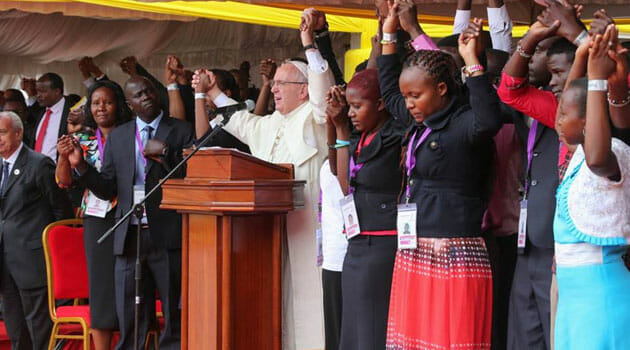
Opening of the Holy Year of Mercy
 We can still vividly see the images that reached us from Bangui, the capital of the Central African Republic, where Pope Francis demonstrated great courage, and where he opened the first “Door of Mercy.” On that day, 29 November, he said: «Today Bangui has become the spiritual capital of the world. The Holy Year of Mercy was opened in advance in this land which also represents all the countries that are undergoing the cross of war. Bangui has become the spiritual capital of prayer for the Father’s mercy.» And in referring to the chosen date of 8 December, the Pope explained in the Bull that «This liturgical feast indicates the concrete mercy God has always shown to mankind from the very first dawning of the history of humanity. After the sin of Adam and Eve, God did not want to leave humanity alone in the hands of evil. This is why he ideated and made Mary holy and immaculate (see Eph 1.4), so she would be the Mother of man’s Redeemer. Before the gravity of sin, God responded with the fullness of forgiveness. Mercy will always be greater than sin, and nobody can ever place a limit to the love of God who forgives.» «On the feast of the Immaculate Conception – continued Francis – I will have the joy of opening the Holy Door. It will be on this occasion that whoever will enter the first Door of Mercy will experience the love of God who consoles, forgives and gives hope. » But opening the first “holy door” in faraway Bangui is not an amazing novelty, since Francis wishes many doors to open throughout the world, to give all Christians the chance to enter them with the same effects of interior renewal as for those who will enter the door in Rome, the centre of Christendom. In fact, in the “Bull” the Pope continued by indicating that “on the next Sunday, the third of Advent, ‘the Holy Door’ in the Cathedral of Rome, the Basilica of St. John Lateran will be opened. In the subsequent days, the Holy Door in the other Papal Basilicas will also be opened. On the same Sunday, I establish that in the local Cathedrals in every particular diocese in the world, other ‘Doors of Mercy’ will be opened for all the faithful, for the entire Holy Year.». He requested that this also be done in the Sanctuaries where pilgrims go, and in all the «sacred places where people are often blessed with grace and find the path of conversion.» Every country will thus be directly involved in «living this Holy Year as an extraordinary moment of grace and spiritual renewal.» The jubilee will, however, be celebrated in Rome «as in all the local Churches worldwide as a visible sign of the communion of the entire Church.» Read the entire text: The Bull
We can still vividly see the images that reached us from Bangui, the capital of the Central African Republic, where Pope Francis demonstrated great courage, and where he opened the first “Door of Mercy.” On that day, 29 November, he said: «Today Bangui has become the spiritual capital of the world. The Holy Year of Mercy was opened in advance in this land which also represents all the countries that are undergoing the cross of war. Bangui has become the spiritual capital of prayer for the Father’s mercy.» And in referring to the chosen date of 8 December, the Pope explained in the Bull that «This liturgical feast indicates the concrete mercy God has always shown to mankind from the very first dawning of the history of humanity. After the sin of Adam and Eve, God did not want to leave humanity alone in the hands of evil. This is why he ideated and made Mary holy and immaculate (see Eph 1.4), so she would be the Mother of man’s Redeemer. Before the gravity of sin, God responded with the fullness of forgiveness. Mercy will always be greater than sin, and nobody can ever place a limit to the love of God who forgives.» «On the feast of the Immaculate Conception – continued Francis – I will have the joy of opening the Holy Door. It will be on this occasion that whoever will enter the first Door of Mercy will experience the love of God who consoles, forgives and gives hope. » But opening the first “holy door” in faraway Bangui is not an amazing novelty, since Francis wishes many doors to open throughout the world, to give all Christians the chance to enter them with the same effects of interior renewal as for those who will enter the door in Rome, the centre of Christendom. In fact, in the “Bull” the Pope continued by indicating that “on the next Sunday, the third of Advent, ‘the Holy Door’ in the Cathedral of Rome, the Basilica of St. John Lateran will be opened. In the subsequent days, the Holy Door in the other Papal Basilicas will also be opened. On the same Sunday, I establish that in the local Cathedrals in every particular diocese in the world, other ‘Doors of Mercy’ will be opened for all the faithful, for the entire Holy Year.». He requested that this also be done in the Sanctuaries where pilgrims go, and in all the «sacred places where people are often blessed with grace and find the path of conversion.» Every country will thus be directly involved in «living this Holy Year as an extraordinary moment of grace and spiritual renewal.» The jubilee will, however, be celebrated in Rome «as in all the local Churches worldwide as a visible sign of the communion of the entire Church.» Read the entire text: The Bull
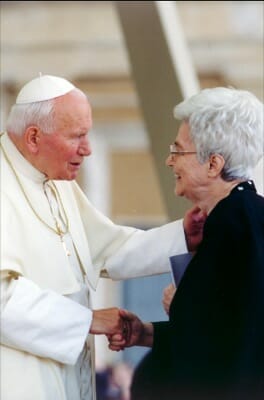
Light and giving oneself to God

(C) CSC Audiovisivi
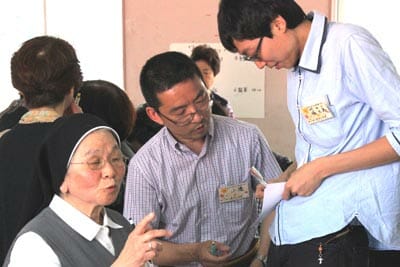
Amami, the isle of Bonds
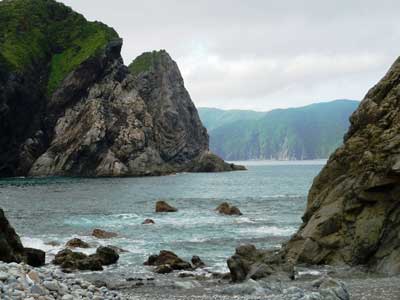 If you want to go to Okinawa from Kagoshima, midway along the route – after spending a night on the ship – you will come across the island of Amami. It is an enchanting place for its natural beauty, and the profound bond between the inhabitants themselves and with the environment. They say that in the rice planting season, the inhabitants had the custom of helping one another by going to each other’s homes when necessary. It was a lifestyle which the islanders still call the “bonding” spirit. Missionaries have landed on the Island ever since the 19th century, bringing the Christian message which took root among the population. With pride, the inhabitants of Amami boast of three bishops born on their island, besides a great number of priests, religious men and women. It was precisely one of these priests, who launched an idea in 1996 during a retreat held on the island: “Why don’t you look into the Focolare? It’s a place where people live evangelical love and unity.”
If you want to go to Okinawa from Kagoshima, midway along the route – after spending a night on the ship – you will come across the island of Amami. It is an enchanting place for its natural beauty, and the profound bond between the inhabitants themselves and with the environment. They say that in the rice planting season, the inhabitants had the custom of helping one another by going to each other’s homes when necessary. It was a lifestyle which the islanders still call the “bonding” spirit. Missionaries have landed on the Island ever since the 19th century, bringing the Christian message which took root among the population. With pride, the inhabitants of Amami boast of three bishops born on their island, besides a great number of priests, religious men and women. It was precisely one of these priests, who launched an idea in 1996 during a retreat held on the island: “Why don’t you look into the Focolare? It’s a place where people live evangelical love and unity.” 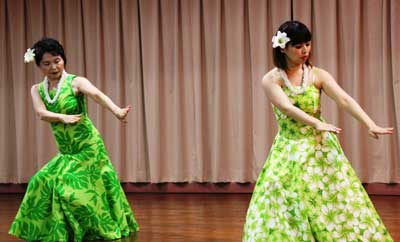 Immediately some of those present contacted the centre of Nagasaki and the following year, two of them, after a night on the ship and travel of more than five hours by car, arrived at Sasebo, two hours away from Nagasaki. A Mariapolis was then underway: a happening of a few days for those who wanted to know more about the spirituality of the Focolare. These two people certainly never imagined that 19 years later a Mariapolis would be held also in Amami! 19 years in which the road has not always been easy. Joys, new spiritual energies, but also misunderstandings and all types of suffering – overcome by mutual love intensively lived – consolidated the new community in unity. And since unity is always diffusive, the community expanded with the desire to let all know what they had discovered. They spoke with friends and acquaintances. They visited seven parishes. Last May, 150 people of the island and some from outside, participated in the Amami Mariapolis. Some of these did not frequent religious groups; others were Buddhists, and still others were of diverse beliefs. There were also five priests and the Bishop of Kagoshima, Bishop Koriyama who confirmed: “The Focolare really suits the bonding spirit of Amami.”
Immediately some of those present contacted the centre of Nagasaki and the following year, two of them, after a night on the ship and travel of more than five hours by car, arrived at Sasebo, two hours away from Nagasaki. A Mariapolis was then underway: a happening of a few days for those who wanted to know more about the spirituality of the Focolare. These two people certainly never imagined that 19 years later a Mariapolis would be held also in Amami! 19 years in which the road has not always been easy. Joys, new spiritual energies, but also misunderstandings and all types of suffering – overcome by mutual love intensively lived – consolidated the new community in unity. And since unity is always diffusive, the community expanded with the desire to let all know what they had discovered. They spoke with friends and acquaintances. They visited seven parishes. Last May, 150 people of the island and some from outside, participated in the Amami Mariapolis. Some of these did not frequent religious groups; others were Buddhists, and still others were of diverse beliefs. There were also five priests and the Bishop of Kagoshima, Bishop Koriyama who confirmed: “The Focolare really suits the bonding spirit of Amami.”  Suddenly, sometime later, he wrote a letter of thanks to the community: “…among the fruits the Focolare brings I saw a new culture of faith take root, and the possibility also for non-Christians to freely come in contact with the Church without fear.” And he hoped that the Mariapolis would not remain an isolated event, but be repeated under some other form of activity during the year. This encouragement filled all with joy. After discussing the matter, a letter was sent to all the parish priests of Amami, communicating the bishop’s augur, and the plan to hold a one-day Mariapolis, an event which took place last 25 October. The same letter also reached the Bishop who replied: “Congratulations! I am happy about this Mariapolis day, worthy to be celebrated and go down in the history of a new faith… I urge you to build, with a sole heart, the tradition of a new faith for the evangelization of the Amami Island.”
Suddenly, sometime later, he wrote a letter of thanks to the community: “…among the fruits the Focolare brings I saw a new culture of faith take root, and the possibility also for non-Christians to freely come in contact with the Church without fear.” And he hoped that the Mariapolis would not remain an isolated event, but be repeated under some other form of activity during the year. This encouragement filled all with joy. After discussing the matter, a letter was sent to all the parish priests of Amami, communicating the bishop’s augur, and the plan to hold a one-day Mariapolis, an event which took place last 25 October. The same letter also reached the Bishop who replied: “Congratulations! I am happy about this Mariapolis day, worthy to be celebrated and go down in the history of a new faith… I urge you to build, with a sole heart, the tradition of a new faith for the evangelization of the Amami Island.”

Living the Gospel: God, first of all
 What pushed you to become a priest? A 13-year-old girl asked Don Marco, during an informal interview on the many “anecdotes” that have dotted his life and priesthood. «I was not counting on becoming a priest. I had only asked some advice from the people who were older and had more worldly experience than me, so as to see what humanity needs most today. I could have become a teacher or an engineer. I also liked architecture, or travelling. I liked so many things, and was doing well in school. Those were the years of the economic boom and I had all the possibilities. I was uncertain since I had received a university scholarship, but I wanted to be useful. So I booked an appointment with the Bishop. I wanted to ask him what he thought, about what humanity needs most. He was so busy that he did not have time to talk to me, and I was alone for hours, so much so that I thought: “surely humanity doesn’t need me, but perhaps not even the church needs me, and whoever said that you are so important? Perhaps I am not worth anything… but I love Jesus and will love him always, even if I turned out to be useless.” Finally, when the Bishop found time to speak with me, and asked me what I wanted, I didn’t want anything anymore! And so I told him that I could probably collaborate… He was surprised, undecided, but in the end he said: “Yesterday I laid the cornerstone of a church. When this church, will be finished six years from now, it will have no priest. Would you like to be the parish priest of that church?” But my first experience had been a choice of God, first of all, and not that of becoming a priest, but to follow God and love Jesus, even if I was useless, since Jesus in the end, will make you do something. » (Fr. Marco – Italy)
What pushed you to become a priest? A 13-year-old girl asked Don Marco, during an informal interview on the many “anecdotes” that have dotted his life and priesthood. «I was not counting on becoming a priest. I had only asked some advice from the people who were older and had more worldly experience than me, so as to see what humanity needs most today. I could have become a teacher or an engineer. I also liked architecture, or travelling. I liked so many things, and was doing well in school. Those were the years of the economic boom and I had all the possibilities. I was uncertain since I had received a university scholarship, but I wanted to be useful. So I booked an appointment with the Bishop. I wanted to ask him what he thought, about what humanity needs most. He was so busy that he did not have time to talk to me, and I was alone for hours, so much so that I thought: “surely humanity doesn’t need me, but perhaps not even the church needs me, and whoever said that you are so important? Perhaps I am not worth anything… but I love Jesus and will love him always, even if I turned out to be useless.” Finally, when the Bishop found time to speak with me, and asked me what I wanted, I didn’t want anything anymore! And so I told him that I could probably collaborate… He was surprised, undecided, but in the end he said: “Yesterday I laid the cornerstone of a church. When this church, will be finished six years from now, it will have no priest. Would you like to be the parish priest of that church?” But my first experience had been a choice of God, first of all, and not that of becoming a priest, but to follow God and love Jesus, even if I was useless, since Jesus in the end, will make you do something. » (Fr. Marco – Italy)
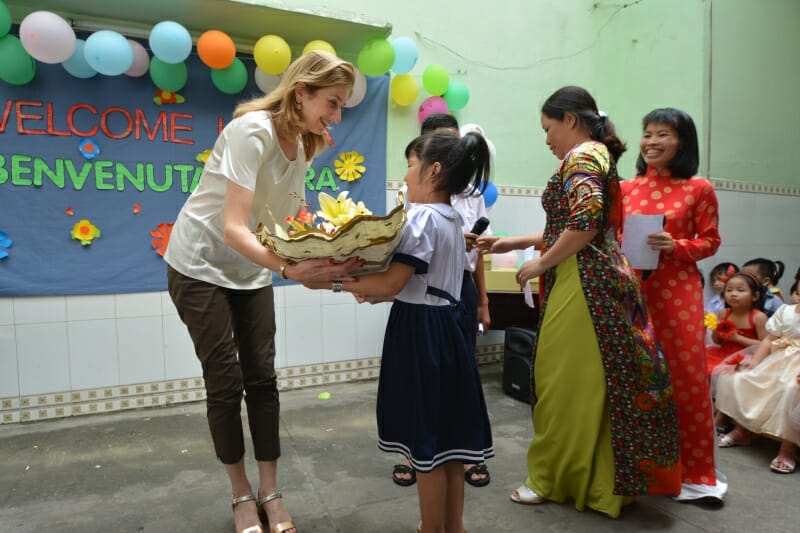
Vietnam: a suburban school
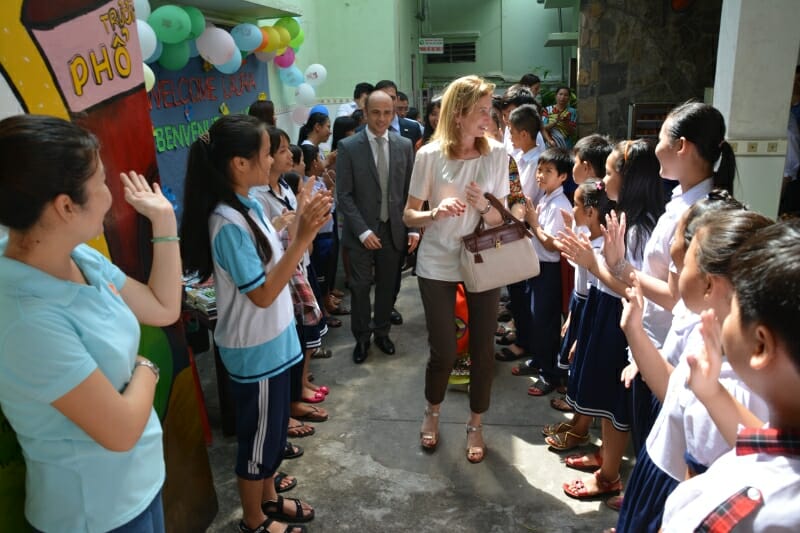 It was not at all easy to delineate a social project from the start, as it occurred for the Pho Cap School in Ho Chi Minh City, Vietnam. A few days ago, this project was honoured by the private visit of Laura Mattarella, daughter of the Italian Republic’s President, who accompanied her father on an official visit to the country. Laura Mattarella who came to visit the 100 children of the school, was welcomed simply – without protocols – by some members of the Focolare Movement, the current heads and collaborators of the School. Pho Cap School was established in 1998 by a Focolare priest, with the help of some university students who were among the first to adhere to the spirituality of unity: a project inspired by love for the poor who filled the Binh Thanh district. The school facility was an abandoned house, and once cleaned from the numerous syringes, the youth rebuilt the roof, then the toilets and electric and water systems. All was done with small donations received, and a lot of sacrifice. The youth became whitewashers, labourers, plumbers and electricians… One of them, now a Focolarino, remembers those days: “It was tough work, but the spirit of the Movement pushed us to love concretely. Also some labourers gave a hand. The project was really achieved together!” In a few weeks, the facilities became liveable and so schooling activities started. It was a matter of convincing the people to send their children, and making them understand that it was better for them to study rather than work. In fact, many of those children passed their days on the street of Saigon selling lottery tickets and did not go to school. The young people had to go from house to house to look for the “students.” After the first group was formed, soon also some girls joined in, and gave their time and enthusiasm to the project.
It was not at all easy to delineate a social project from the start, as it occurred for the Pho Cap School in Ho Chi Minh City, Vietnam. A few days ago, this project was honoured by the private visit of Laura Mattarella, daughter of the Italian Republic’s President, who accompanied her father on an official visit to the country. Laura Mattarella who came to visit the 100 children of the school, was welcomed simply – without protocols – by some members of the Focolare Movement, the current heads and collaborators of the School. Pho Cap School was established in 1998 by a Focolare priest, with the help of some university students who were among the first to adhere to the spirituality of unity: a project inspired by love for the poor who filled the Binh Thanh district. The school facility was an abandoned house, and once cleaned from the numerous syringes, the youth rebuilt the roof, then the toilets and electric and water systems. All was done with small donations received, and a lot of sacrifice. The youth became whitewashers, labourers, plumbers and electricians… One of them, now a Focolarino, remembers those days: “It was tough work, but the spirit of the Movement pushed us to love concretely. Also some labourers gave a hand. The project was really achieved together!” In a few weeks, the facilities became liveable and so schooling activities started. It was a matter of convincing the people to send their children, and making them understand that it was better for them to study rather than work. In fact, many of those children passed their days on the street of Saigon selling lottery tickets and did not go to school. The young people had to go from house to house to look for the “students.” After the first group was formed, soon also some girls joined in, and gave their time and enthusiasm to the project.  From a small group of students who were not given any meals, the school started to hand out daily snacks, and then lunch. The project continually developed, overcoming many difficulties. It was a success and became a school of “prestige” but which remained poor and for the poor just the same, though managing to give a convincing testimonial in a difficult suburban context. Most of the children come from Buddhist families but in the eyes of the children of Pho Cap, one can see trust, serenity and zest for life. Laura Mattarella noticed this and wanted to keep the photos of this “beautiful” meeting, as she said, in its simplicity, and so full of humanity, gentleness and relationships. The school directress commented: “The visit of the daughter of the Italian Republic President encouraged us to continue in the spirit that inspires us: living fraternity among us, the collaborators, and transmitting it to the students, so they in turn become messengers of this spirit in their families and in society.”
From a small group of students who were not given any meals, the school started to hand out daily snacks, and then lunch. The project continually developed, overcoming many difficulties. It was a success and became a school of “prestige” but which remained poor and for the poor just the same, though managing to give a convincing testimonial in a difficult suburban context. Most of the children come from Buddhist families but in the eyes of the children of Pho Cap, one can see trust, serenity and zest for life. Laura Mattarella noticed this and wanted to keep the photos of this “beautiful” meeting, as she said, in its simplicity, and so full of humanity, gentleness and relationships. The school directress commented: “The visit of the daughter of the Italian Republic President encouraged us to continue in the spirit that inspires us: living fraternity among us, the collaborators, and transmitting it to the students, so they in turn become messengers of this spirit in their families and in society.”
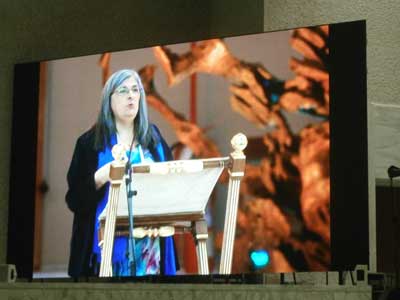
The passion to educate
 The profession of educators is a poorly paid one. This speaks volumes about the regard given to education by society and by governments. From November 18th to 21st, 2500 people gathered in Rome for a convention organised by the Congregation for Catholic Education, to commemorate the 50th anniversary of the Vatican Council II Declaration on Christian education, and the 25th of the Apostolic Constitution on Catholic Universities. “I came here with a Jewish colleague, and from India there were Catholics and a few Hindus,” said Nieves Tapia from Argentina, director of CLAYSS (Latin American Center for Service-Learning). “I felt that this was already a fruit of the Council: the Church in dialogue. With the motto, ‘Educating today and tomorrow: a renewing passion,’ we came together from all over the world, from very different situations.” The experiences from Catholic schools in frontier locations demonstrated the challenge of dialogue in action. As in Morocco, where teachers and students are Muslims; or in the Philippines, a Catholic country by majority, where the universities, also open to Muslims, encourage students to fast during Ramadan and reserve a place of prayer not only for Christians but also for Muslims. “It was an experience in a universal context,” affirmed Nieves Tapia, “not only because of our geographical origins, but also because of the types of schools and universities represented: public, private, and many schools who also work with the poor.” Pope Francis’ passion for education shone through in his address: “The pope responded to a few questions, and he spoke off the cuff, from his heart and with passion. He highlighted the need to go to the periphery, not to do charity, but because there, a new culture will be born. There we learn what profound wisdom there is in suffering. If we think about the great educational reforms (Don Bosco, Freire) we can say that they all came from the outskirts. Francis stressed furthermore the importance of working for the unity of the person, taking into account the mind, the heart, the hands; the importance of rebuilding the educational pact, that is the unity between the school and the family, the school and the community, the relationship with real life without closing oneself in the classroom. In addition, the importance of going out, which is also a response to the culture of the elite, the great danger of many educational systems, with the risk of leaving people out.” Among the subjects discussed in the convention, the pope implicitly underlined that of service learning, an educational program which actively involves the individual in the frontline… “It is a pedagogy that we have sought to enrich with the Latin American experience and with the spirituality of unity: service learning. It is necessary to allow the student to leave the classroom and begin to serve: to learn to do, to live, to be a better citizen. Research demonstrates that the learning cycle is not completed until the individual is able to practice what he has learned.” “This is confirmed when the teens learn to use their classroom knowledge to serve others. For example, in a technical school, instead of making a robot prototype, the youth construct wheelchairs for people who need them.” Service learning has been in use for almost 50 years, and there are thousands of universities and schools throughout the world that put into practice what is learned in order to serve others.” What prospects have emerged from the Convention? “The guidelines are those which the pope gave us. Above all, the necessity to renew our passion for education came into relief. ‘We must change education in order to change the world,’ said Pope Francis. We are already on the way and this is a sign of hope.”
The profession of educators is a poorly paid one. This speaks volumes about the regard given to education by society and by governments. From November 18th to 21st, 2500 people gathered in Rome for a convention organised by the Congregation for Catholic Education, to commemorate the 50th anniversary of the Vatican Council II Declaration on Christian education, and the 25th of the Apostolic Constitution on Catholic Universities. “I came here with a Jewish colleague, and from India there were Catholics and a few Hindus,” said Nieves Tapia from Argentina, director of CLAYSS (Latin American Center for Service-Learning). “I felt that this was already a fruit of the Council: the Church in dialogue. With the motto, ‘Educating today and tomorrow: a renewing passion,’ we came together from all over the world, from very different situations.” The experiences from Catholic schools in frontier locations demonstrated the challenge of dialogue in action. As in Morocco, where teachers and students are Muslims; or in the Philippines, a Catholic country by majority, where the universities, also open to Muslims, encourage students to fast during Ramadan and reserve a place of prayer not only for Christians but also for Muslims. “It was an experience in a universal context,” affirmed Nieves Tapia, “not only because of our geographical origins, but also because of the types of schools and universities represented: public, private, and many schools who also work with the poor.” Pope Francis’ passion for education shone through in his address: “The pope responded to a few questions, and he spoke off the cuff, from his heart and with passion. He highlighted the need to go to the periphery, not to do charity, but because there, a new culture will be born. There we learn what profound wisdom there is in suffering. If we think about the great educational reforms (Don Bosco, Freire) we can say that they all came from the outskirts. Francis stressed furthermore the importance of working for the unity of the person, taking into account the mind, the heart, the hands; the importance of rebuilding the educational pact, that is the unity between the school and the family, the school and the community, the relationship with real life without closing oneself in the classroom. In addition, the importance of going out, which is also a response to the culture of the elite, the great danger of many educational systems, with the risk of leaving people out.” Among the subjects discussed in the convention, the pope implicitly underlined that of service learning, an educational program which actively involves the individual in the frontline… “It is a pedagogy that we have sought to enrich with the Latin American experience and with the spirituality of unity: service learning. It is necessary to allow the student to leave the classroom and begin to serve: to learn to do, to live, to be a better citizen. Research demonstrates that the learning cycle is not completed until the individual is able to practice what he has learned.” “This is confirmed when the teens learn to use their classroom knowledge to serve others. For example, in a technical school, instead of making a robot prototype, the youth construct wheelchairs for people who need them.” Service learning has been in use for almost 50 years, and there are thousands of universities and schools throughout the world that put into practice what is learned in order to serve others.” What prospects have emerged from the Convention? “The guidelines are those which the pope gave us. Above all, the necessity to renew our passion for education came into relief. ‘We must change education in order to change the world,’ said Pope Francis. We are already on the way and this is a sign of hope.”
Silvana Veronesi: in the beginnings with Chiara Lubich
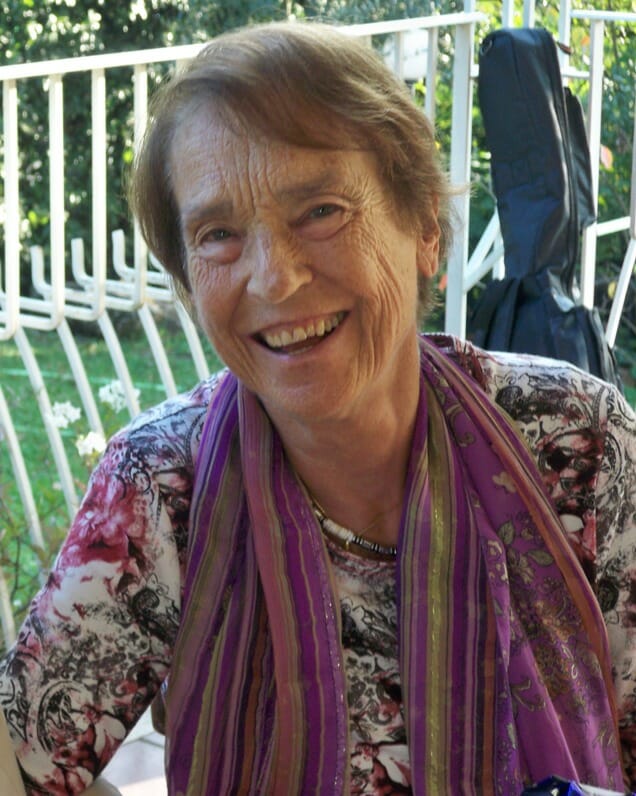 Silvana Veronesi has passed away at the age of 86. She was one of the close collaborators of the founder of the Focolare, Chiara Lubich. The news of her passing was communicated by Focolare president, Maria Voce, to the worldwide Focolare Movement: “We accompany her with the certainty that there will much rejoicing in heaven.” Her first meeting with Chiara Lubich was in 1945. She was only 16 years old and in search for something great to live for. From that moment, fascinated by the spirituality of unity, she entered the initial group that gave life to the Focolare Movement. In 1949, she moved to Florence, Italy, to attend Medical School. With great simplicity she bore witness to the novelty of her new life to young men and women, giving rise to the first Focolare community in Tuscany. She then spent some time in Turin and Milan.
Silvana Veronesi has passed away at the age of 86. She was one of the close collaborators of the founder of the Focolare, Chiara Lubich. The news of her passing was communicated by Focolare president, Maria Voce, to the worldwide Focolare Movement: “We accompany her with the certainty that there will much rejoicing in heaven.” Her first meeting with Chiara Lubich was in 1945. She was only 16 years old and in search for something great to live for. From that moment, fascinated by the spirituality of unity, she entered the initial group that gave life to the Focolare Movement. In 1949, she moved to Florence, Italy, to attend Medical School. With great simplicity she bore witness to the novelty of her new life to young men and women, giving rise to the first Focolare community in Tuscany. She then spent some time in Turin and Milan.
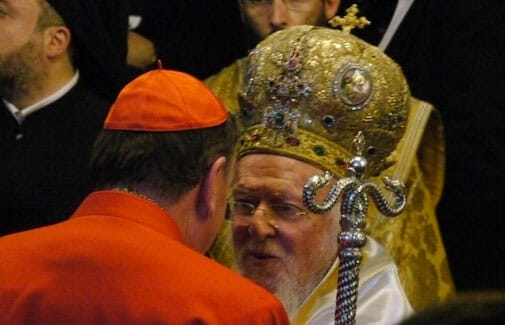
The Commandment of Unity

(C) CSC Audiovisivi
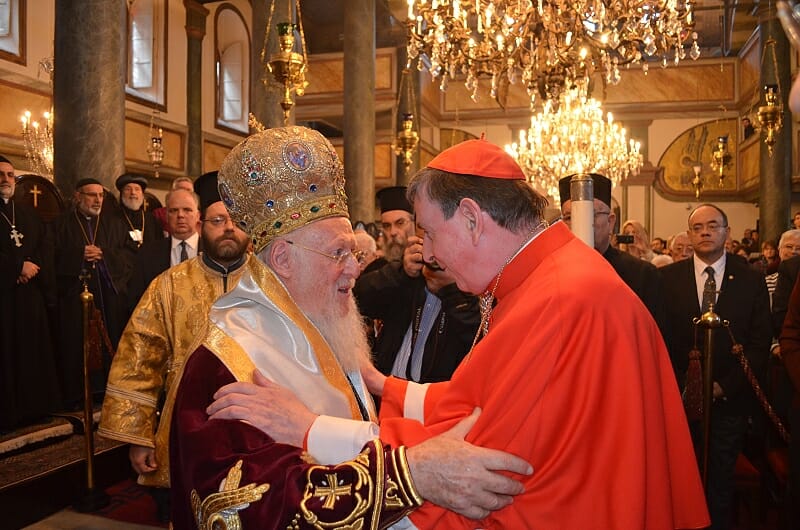
The path to unity according to Pope Francis
 According to Pope Francis, the four tenets of the ecumenical undertaking are ecumenism of charity, concreteness, truth and spirituality. In his in-depth dissertation, Cardinal Kurt Koch, President of the Pontifical Council for the Promotion of Unity among Christians, delineated the objective of the total unity of the churches as the perspective of ecumenical dialogue. According to Pope Francis, in line with his predecessors “divisions are a scandal, and the ecumenical endeavour should, in short, target the common celebration of the Eucharist and reach unity always through the reconciliation of our differences.” Unity is a journey, and his deep conviction is based on the fact that: “Unity will not come about as a miracle, but as a journey during which the Holy Spirit will achieve unity.” The Pope places as first and foremost, fraternal dialogue in words and actions, inspired by charity: the encounter of Christians of different churches since “the truth is an encounter between persons. The truth is not concocted in a laboratory, but in concrete life, in the search of Jesus who will help us find it.” Theological dialogue is important but is always interpreted as an “exchange of gifts”, which is just a “mere theoretical exercise” but helps us to know the basics of mutual traditions so as to understand, and at times, also learn from them.” Above all, we can cooperate concretely by praying and working together in searching for peace, protecting creation, helping the poor, and defending our religious freedom, marriage and the family. But unity “is primarily a gift of God, which we must always pray for.” Today, many Christians are persecuted. Why does the Pope stress the importance of ecumenism of blood? “We have to be aware that in the world, 80% of those persecuted in the name of faith are Christians. There are more persecutions today than in the first centuries of Christianity. This fact should stir up a great solidarity between all the churches because the martyrs are not persecuted because they are Catholics, Armenians, Orthodox, Anglicans, Pentecostals, or Lutherans, but because they are Christians. Their blood does not divide but unites. The martyrs are already celebrating the first communion in heaven, which we need to find once again on earth. They will help us on our journey towards unity.” After 50 years of preparation, in 2016 the Pan-Orthodox Synod will take place. What effects will this have on the ecumenical movement? “If the Orthodox churches will regain a slightly stronger unity among them, this will be a great help also for ecumenism and for progress toward the joint celebration of the Eucharist between Catholics and the Orthodox. I am convinced the Ecumenical Patriarch Bartholomew is working with all his heart for this Pan-Orthodox Synod. And we, as the Catholic Church, want to help as much as possible and are praying intensely for it.” The 34th Convention of the Ecumenical Bishops of the Focolare has come to an end. How will these types of meetings contribute to unity among the churches? “The ministry of the bishops is a ministry of unity in their own Churches and unity among the churches is, likewise a big obligation for all Christians because this is what the Lord wants of us. And all the bishops want to fulfill God’s will. Meetings like this can help us build that unity, about which the various churches take on different concepts. The endeavour to reach a unified idea through dialogue is very important at this stage of ecumenism. And I am really grateful to the Focolare for its commitment in the field of ecumenism.”
According to Pope Francis, the four tenets of the ecumenical undertaking are ecumenism of charity, concreteness, truth and spirituality. In his in-depth dissertation, Cardinal Kurt Koch, President of the Pontifical Council for the Promotion of Unity among Christians, delineated the objective of the total unity of the churches as the perspective of ecumenical dialogue. According to Pope Francis, in line with his predecessors “divisions are a scandal, and the ecumenical endeavour should, in short, target the common celebration of the Eucharist and reach unity always through the reconciliation of our differences.” Unity is a journey, and his deep conviction is based on the fact that: “Unity will not come about as a miracle, but as a journey during which the Holy Spirit will achieve unity.” The Pope places as first and foremost, fraternal dialogue in words and actions, inspired by charity: the encounter of Christians of different churches since “the truth is an encounter between persons. The truth is not concocted in a laboratory, but in concrete life, in the search of Jesus who will help us find it.” Theological dialogue is important but is always interpreted as an “exchange of gifts”, which is just a “mere theoretical exercise” but helps us to know the basics of mutual traditions so as to understand, and at times, also learn from them.” Above all, we can cooperate concretely by praying and working together in searching for peace, protecting creation, helping the poor, and defending our religious freedom, marriage and the family. But unity “is primarily a gift of God, which we must always pray for.” Today, many Christians are persecuted. Why does the Pope stress the importance of ecumenism of blood? “We have to be aware that in the world, 80% of those persecuted in the name of faith are Christians. There are more persecutions today than in the first centuries of Christianity. This fact should stir up a great solidarity between all the churches because the martyrs are not persecuted because they are Catholics, Armenians, Orthodox, Anglicans, Pentecostals, or Lutherans, but because they are Christians. Their blood does not divide but unites. The martyrs are already celebrating the first communion in heaven, which we need to find once again on earth. They will help us on our journey towards unity.” After 50 years of preparation, in 2016 the Pan-Orthodox Synod will take place. What effects will this have on the ecumenical movement? “If the Orthodox churches will regain a slightly stronger unity among them, this will be a great help also for ecumenism and for progress toward the joint celebration of the Eucharist between Catholics and the Orthodox. I am convinced the Ecumenical Patriarch Bartholomew is working with all his heart for this Pan-Orthodox Synod. And we, as the Catholic Church, want to help as much as possible and are praying intensely for it.” The 34th Convention of the Ecumenical Bishops of the Focolare has come to an end. How will these types of meetings contribute to unity among the churches? “The ministry of the bishops is a ministry of unity in their own Churches and unity among the churches is, likewise a big obligation for all Christians because this is what the Lord wants of us. And all the bishops want to fulfill God’s will. Meetings like this can help us build that unity, about which the various churches take on different concepts. The endeavour to reach a unified idea through dialogue is very important at this stage of ecumenism. And I am really grateful to the Focolare for its commitment in the field of ecumenism.”
By our correspondent Aurelio Molè
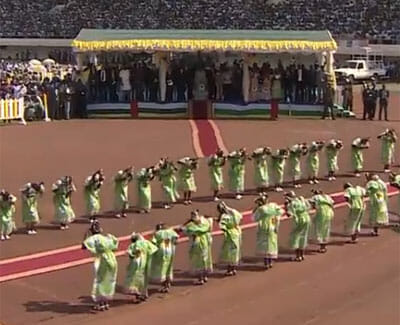
Central African Republic: Experts in Mercy
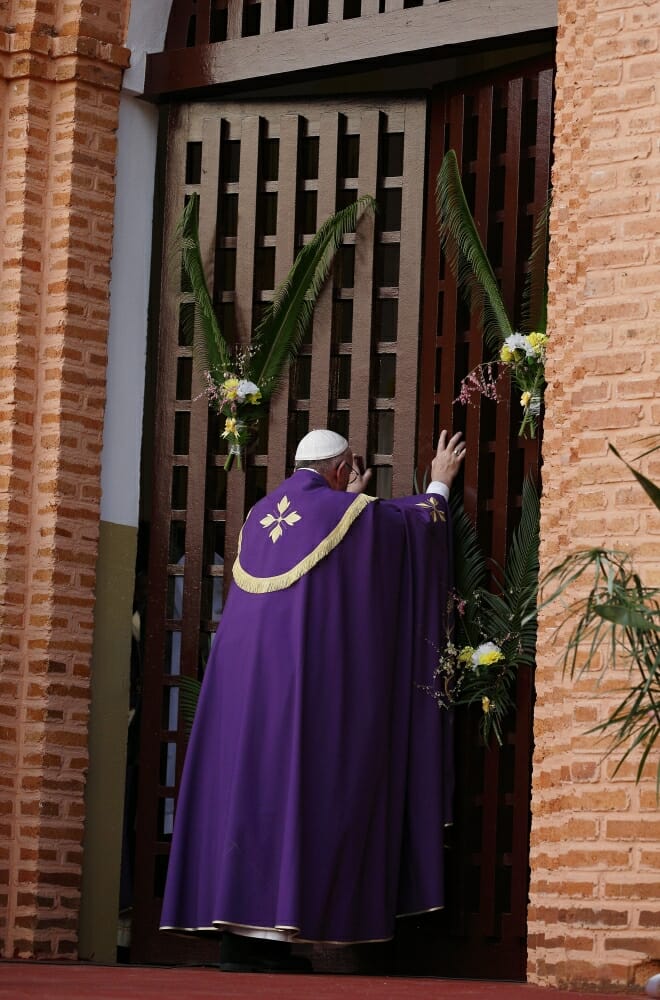 Today Bangui becomes the spiritual capital of the world. The Holy Year of Mercy is anticipated in this land, a land that suffers from several years of hatred and war, misunderstanding and lack of peace. But there are also all the lands that are bearing the cross of war. Bangui becomes the spiritual capital of the prayer to the Father for mercy. All of us ask for peace, mercy, reconciliation, pardon and love. For Bangui, for the Central African Republic, for the whole world, for the lands that suffer from war, we ask for peace!” These were the words of Pope Francis before the opening of the Holy Door in the Cathedral of Bangui, on November 29. Then, in a gesture charged with meaning, the Pope was the first to walk alone through that Holy Door. While the Pope is still on his return flight we have telephoned Bangui Geneviève Sanzé in Bangui. She is originally from the Central African Republic and is a member of the Pontifical Council for the Laity, and lends her services to the International Centre of the Focolare in Italy. “Nobody could have imagined what happened in the people,” she told us. “He brought back joy to us, peace!” Expectations were high, both on the Christian and the Muslim side: “Now, the man of God comes,” they said. “This is the supreme opportunity that God is sending.” It was a dangerous journey for security reasons, but “even though everyone was worried and the whole world discouraged it, the Pope wished to come.” “And the people feel that he came for them, not for some task or special event, but as a father who wants to encourage,” Geneviève explained. “He went to the Christians, Catholic and Protestant, but also to the Muslims. All of us prepared for his coming with enthusiasm, Christians on one side and Muslims on the other and the Pope went to everyone. Many thought it would have been better if he cancelled the visit to the Mosque located in a quarter where no Christian can enter. But he went anyway and was outstanding.”
Today Bangui becomes the spiritual capital of the world. The Holy Year of Mercy is anticipated in this land, a land that suffers from several years of hatred and war, misunderstanding and lack of peace. But there are also all the lands that are bearing the cross of war. Bangui becomes the spiritual capital of the prayer to the Father for mercy. All of us ask for peace, mercy, reconciliation, pardon and love. For Bangui, for the Central African Republic, for the whole world, for the lands that suffer from war, we ask for peace!” These were the words of Pope Francis before the opening of the Holy Door in the Cathedral of Bangui, on November 29. Then, in a gesture charged with meaning, the Pope was the first to walk alone through that Holy Door. While the Pope is still on his return flight we have telephoned Bangui Geneviève Sanzé in Bangui. She is originally from the Central African Republic and is a member of the Pontifical Council for the Laity, and lends her services to the International Centre of the Focolare in Italy. “Nobody could have imagined what happened in the people,” she told us. “He brought back joy to us, peace!” Expectations were high, both on the Christian and the Muslim side: “Now, the man of God comes,” they said. “This is the supreme opportunity that God is sending.” It was a dangerous journey for security reasons, but “even though everyone was worried and the whole world discouraged it, the Pope wished to come.” “And the people feel that he came for them, not for some task or special event, but as a father who wants to encourage,” Geneviève explained. “He went to the Christians, Catholic and Protestant, but also to the Muslims. All of us prepared for his coming with enthusiasm, Christians on one side and Muslims on the other and the Pope went to everyone. Many thought it would have been better if he cancelled the visit to the Mosque located in a quarter where no Christian can enter. But he went anyway and was outstanding.”  At Mass in the stadium, the Pope invited the “dear Central Africans” to “look to the future and, strengthened by the distance you have already come, resolutely determine to begin a new chapter in the Christian history of your country, to set out towards new horizons and he exhorted every person to be “an artisan of human and spiritual renewal.” The day before, he recalled: “love for our enemies which guards against the temptation of revenge and against the unending spiral of reprisal,” and also that “everywhere, especially where hatred and violence reign, injustice and persecution, Christians are called to witness to the God who is Love.” With these words in her heart, Geneviève recounted an event that she witnessed with her own eyes: A Muslim man walked in during the Mass, and he was clearly visible holding a sign with the words: “God is great.” The Christians applauded him and went up to him and embraced him. They want to live what the Pope is asking, this responsibility in love and in mercy; that open door that leads us all into that grace. And they showed it with that gesture.” “When I arrived I found hardened hearts. Seeing the change that has taken place in the people in just two days has been extraordinary. The Pope’s gesture, opening the Holy Door, was not merely a gesture but a life that he himself has testified to, in the mercy with which he reached out to everyone: he brought this love from God to everyone.”
At Mass in the stadium, the Pope invited the “dear Central Africans” to “look to the future and, strengthened by the distance you have already come, resolutely determine to begin a new chapter in the Christian history of your country, to set out towards new horizons and he exhorted every person to be “an artisan of human and spiritual renewal.” The day before, he recalled: “love for our enemies which guards against the temptation of revenge and against the unending spiral of reprisal,” and also that “everywhere, especially where hatred and violence reign, injustice and persecution, Christians are called to witness to the God who is Love.” With these words in her heart, Geneviève recounted an event that she witnessed with her own eyes: A Muslim man walked in during the Mass, and he was clearly visible holding a sign with the words: “God is great.” The Christians applauded him and went up to him and embraced him. They want to live what the Pope is asking, this responsibility in love and in mercy; that open door that leads us all into that grace. And they showed it with that gesture.” “When I arrived I found hardened hearts. Seeing the change that has taken place in the people in just two days has been extraordinary. The Pope’s gesture, opening the Holy Door, was not merely a gesture but a life that he himself has testified to, in the mercy with which he reached out to everyone: he brought this love from God to everyone.”  The speech by the Mayor of Bangji (and president of the state of transition),” Geneviève explained “placed before the Pope all the sins of our country, and the Mayor didn’t leave out his own responsibility. He asked for God’s pardon, asking the Pope that with his blessing he would invoke pardon upon the whole nation. With all of this in mind, watching Pope Francis open the Holy Door of Mercy was truly exceptional. He didn’t say much, but he knew how to put his finger on the weak point and launch an appeal to all the nations that produce weapons of war. And he called Bangui the spiritual capital of the world. Listening to a country that has shed so much innocent blood being called spiritual capital of the world, was like seeing God coming down to meet us.
The speech by the Mayor of Bangji (and president of the state of transition),” Geneviève explained “placed before the Pope all the sins of our country, and the Mayor didn’t leave out his own responsibility. He asked for God’s pardon, asking the Pope that with his blessing he would invoke pardon upon the whole nation. With all of this in mind, watching Pope Francis open the Holy Door of Mercy was truly exceptional. He didn’t say much, but he knew how to put his finger on the weak point and launch an appeal to all the nations that produce weapons of war. And he called Bangui the spiritual capital of the world. Listening to a country that has shed so much innocent blood being called spiritual capital of the world, was like seeing God coming down to meet us.
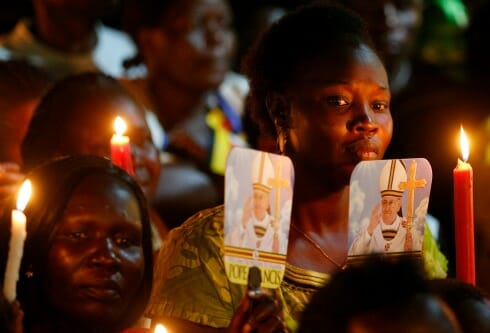
Pope Francis in Uganda
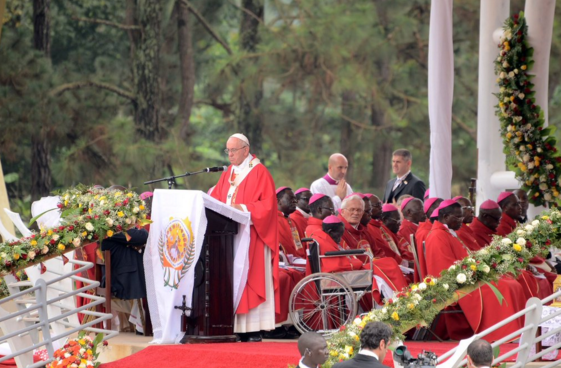
Pope Francis at Munyonyo Catholic Shrine were the first Christians were martyred.
 In his sermon, the Pope, “recognized the Anglican Martyrs who gave their life’s to God’s work and the Catholic Martyrs, whose deaths for Christ testify to the ecumenism of blood. All these witnesses nurtured the gift of the Holy Spirit in their lives and freely gave testimony of their faith in Jesus Christ, even at the cost of their lives, many at such a young age,” commented Simon. “The Ugandan Martyrs are the first martyrs of contemporary Africa who give a witness, as lay people, of a simple faith that is very powerful,” Fr Lombardi, Vatican spokesperson, explains. The Pope’s draws his inspiration from them in his address to the young people when he challenges them to “transform what is negative into positive in their lives”, “hatred into love”, “war into peace”. Among the impressions gathered by Simon was that of a young person called Alinda: “With Jesus we can tear down any obstacle that might stand between us and this will transform our lives. We should not be afraid to ask for help and prayers.”
In his sermon, the Pope, “recognized the Anglican Martyrs who gave their life’s to God’s work and the Catholic Martyrs, whose deaths for Christ testify to the ecumenism of blood. All these witnesses nurtured the gift of the Holy Spirit in their lives and freely gave testimony of their faith in Jesus Christ, even at the cost of their lives, many at such a young age,” commented Simon. “The Ugandan Martyrs are the first martyrs of contemporary Africa who give a witness, as lay people, of a simple faith that is very powerful,” Fr Lombardi, Vatican spokesperson, explains. The Pope’s draws his inspiration from them in his address to the young people when he challenges them to “transform what is negative into positive in their lives”, “hatred into love”, “war into peace”. Among the impressions gathered by Simon was that of a young person called Alinda: “With Jesus we can tear down any obstacle that might stand between us and this will transform our lives. We should not be afraid to ask for help and prayers.”
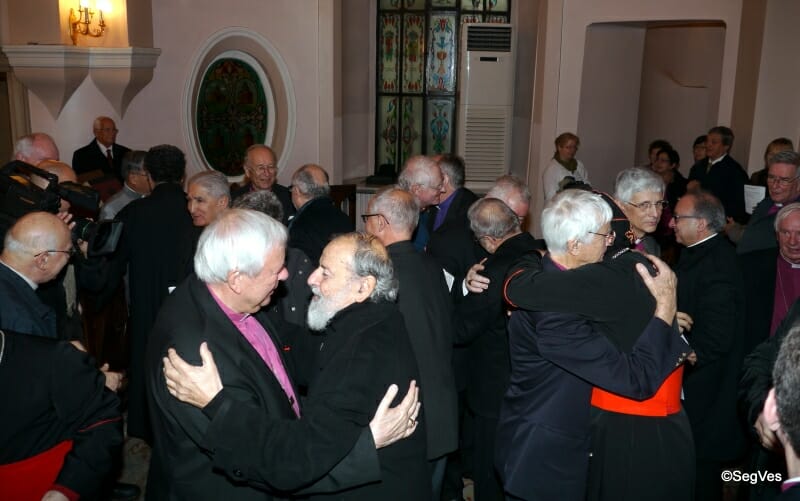
Chalcedon: new pact between Christian Bishops
The course of the 34th convention of Bishops of various churches promoted by the Focolare, is heading towards solid ground. A rainy and gloomy day saw the relocation from the Monastery of Halki towards Chalcedon. It took an hour by boat to reach Kadikoy, Istanbul, the old Bithynia where the 4th Ecumenical Council took place in 451. The group of 35 bishops of 16 churches were welcomed in the Church of Christ the King, which is in charge of a vast area with a population of 3,000 people of the local Armenian community. The parish priest explained why the Council of Chalcedon was held, not far from this Church. They had to discuss a fundamental issue for Christianity regarding the human and divine nature of Christ. Since the pre-council fathers could not reach an agreement, they entrusted the resolution to the Holy Spirit, which the people in the East perceive as a feminine being. Such a significant and historical site is a source of inspiration in comprehending the “journey toward unity in diversity” – which, as Cardinal Francis Kriengsak explained – is at times difficult and painful, but if we remain faithful, can generate fruits for centuries to come.». As tradition would have it, these bishop conventions are followed by a solemn pact of mutual love amongst all present, with the promise to “be ready to give one’s life for the others” according to the commandment of Jesus “love one another as I have loved you.” This inspirational motto was accompanied by the reading of the words of Patriarch Athenagoras: «If we disarm ourselves, if we strip ourselves of all things, if we open out to God-man who makes all things new, it is then that He can cancel the evils of the past and restore a new era where all things are possible. » Before a Marian icon, each bishop signed the pact. «The pact of mutual love between bishops of various churches – explained Brendan Leahy, Catholic Bishop of Limerick, Ireland –is a constant reminder to open out and not lock myself up in my diocese. It means avoiding superficiality in order to get to the roots of our being Christians and bishops.» Michael Grabow, Lutheran bishop of Augsburg said «it is a commitment to live the radicalism of love and a reminder that if we belong to different churches, we are brothers and sisters.» Geoffrey Rowell, Anglican bishop and theologian from England, recalled «we are united by the same pact also with the Orthodox bishops who were kidnapped in Aleppo, Syria, and of whom we have not received any news. While the media has forgotten, we always remember them since we are bound by a common fraternity.» Theophilose Kuriakose, the Indian Metropolitan bishop of the Coptic-Orthodox Syrian Church commented – we listen to many people in order to solve their problems, but at times we feel lonely because no one is there to listen to our own problems. We need to feel the unity and brotherhood that bind us, of course without falling short of our communion with God and our choice of Jesus crucified and abandoned. This pact will be sealed in my heart and gives me strength and makes me feel also responsible in communion with others.». Written by : Aurelio Molè
Awaiting Christmas
 “We often have the tendency, due to the language we use, to have an inexact notion of what happened in Nazareth when the angel relayed to the Holy Virgin that the Word had become flesh. An anthropomorphic mentality makes us think of God as a distant person up there in the heavens, who sends his Son to a far-off place to become man. It is not so. God is everywhere. He is in heaven, on earth and in every place. God was thus in the little room of the Virgin in Nazareth, when the angel appeared to her. He was, however, infinitely distant from mankind due to the abyss of sin and because of their natural smallness. The instant in which the Virgin pronounced her ‘fiat,’ God espoused human nature in her pure womb, espoused the creature, and undertook an unimaginable act of bridging the divinity withthe universe. Since then, he is always in our midst. That infinite distance which our imagination expressed, almost placing God far from us, above in the heavens, has been negated: he is on earth, he is our co-citizen.” Pasquale Foresi, Theology of sociality (Teologia della socialità), Città Nuova 1963, p. 66
“We often have the tendency, due to the language we use, to have an inexact notion of what happened in Nazareth when the angel relayed to the Holy Virgin that the Word had become flesh. An anthropomorphic mentality makes us think of God as a distant person up there in the heavens, who sends his Son to a far-off place to become man. It is not so. God is everywhere. He is in heaven, on earth and in every place. God was thus in the little room of the Virgin in Nazareth, when the angel appeared to her. He was, however, infinitely distant from mankind due to the abyss of sin and because of their natural smallness. The instant in which the Virgin pronounced her ‘fiat,’ God espoused human nature in her pure womb, espoused the creature, and undertook an unimaginable act of bridging the divinity withthe universe. Since then, he is always in our midst. That infinite distance which our imagination expressed, almost placing God far from us, above in the heavens, has been negated: he is on earth, he is our co-citizen.” Pasquale Foresi, Theology of sociality (Teologia della socialità), Città Nuova 1963, p. 66
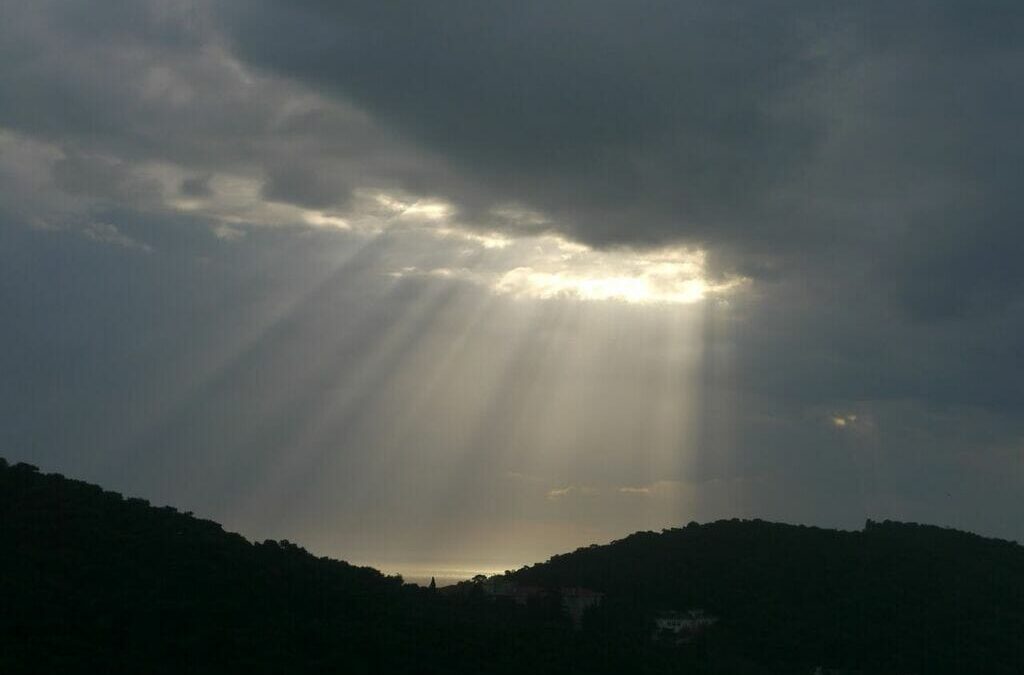
An Appeal for Peace from the Monastery of Halki, Turkey
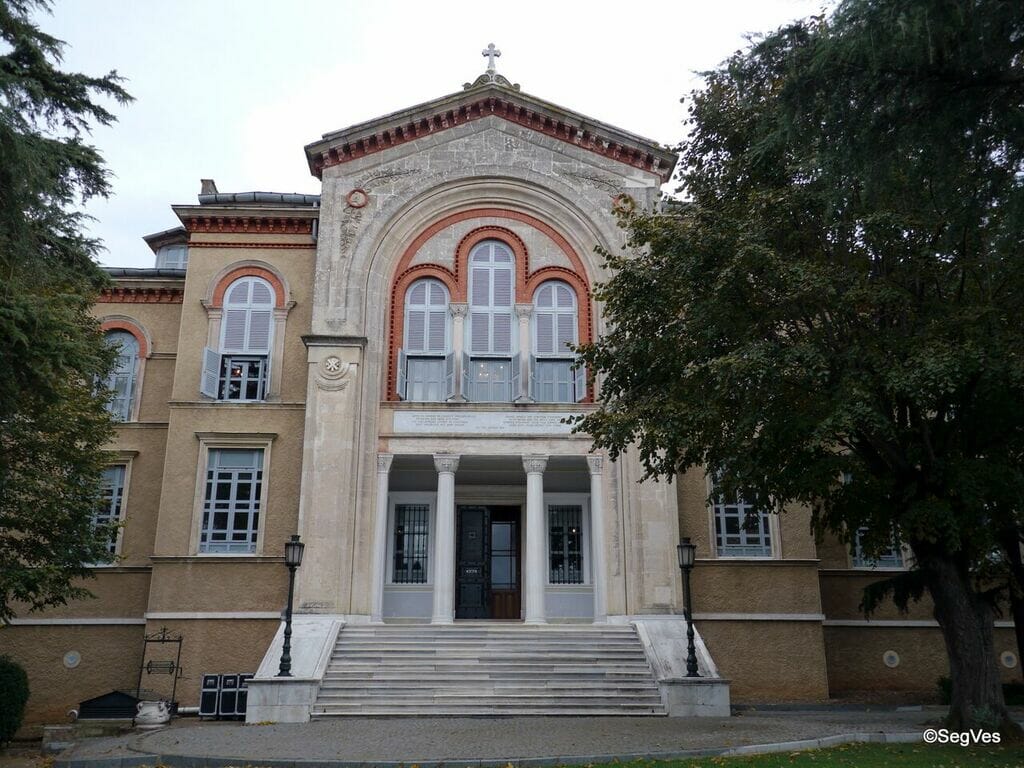 The first part of the Ecumenical Meeting of Bishop Friends of the Focolare concluded on November 27th in the Monastery of the Most Holy Trinity on Halki Island. Cardinal Francis Kriengsak evidenced how the unity amongst the different Christian Churches is at the service of the whole human family. “The diversity is a gift and a mutual enrichment,” he said “but that is possible only by listening without judgement, with the dialogue of life, with the sharing of experiences, with an acceptance that brings the different charisms into harmony.” The challenges and particularities of every church concerning pressing issues are contained in this mutual understanding.
The first part of the Ecumenical Meeting of Bishop Friends of the Focolare concluded on November 27th in the Monastery of the Most Holy Trinity on Halki Island. Cardinal Francis Kriengsak evidenced how the unity amongst the different Christian Churches is at the service of the whole human family. “The diversity is a gift and a mutual enrichment,” he said “but that is possible only by listening without judgement, with the dialogue of life, with the sharing of experiences, with an acceptance that brings the different charisms into harmony.” The challenges and particularities of every church concerning pressing issues are contained in this mutual understanding. 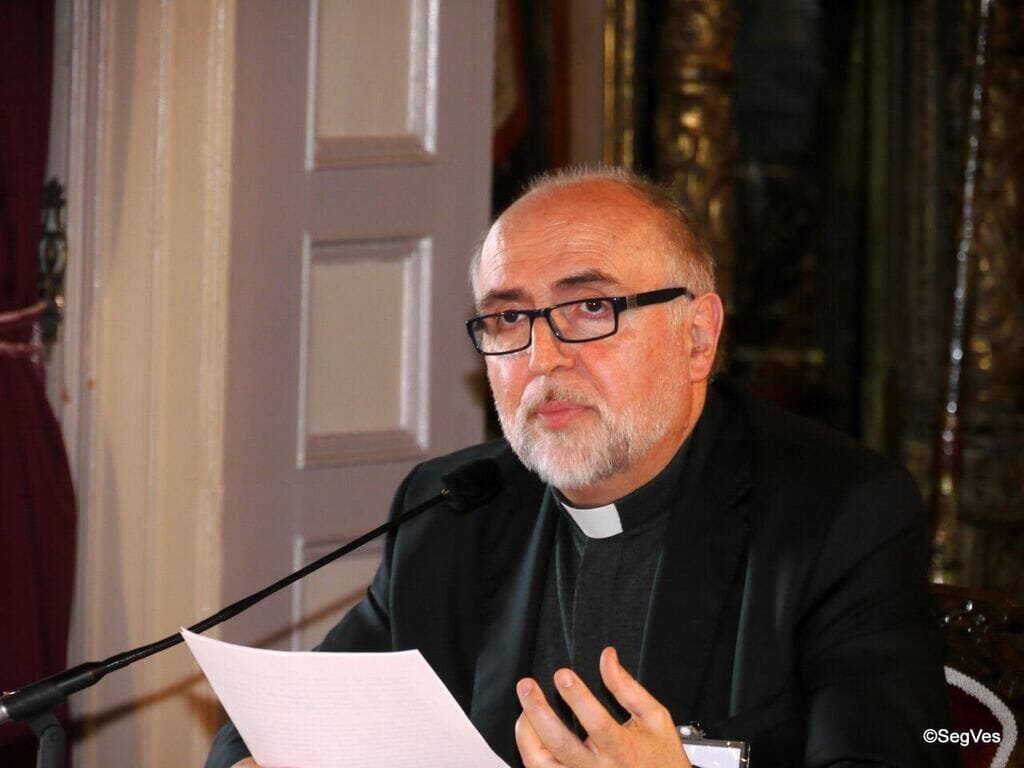 In the morning, Focolare co-president, Jesús Morán, identified several challenges of today’s world, including: globalisation, ultra-modernity, the advent of a piecemeal third world war; and he presented the answers that a culture of unity can give. Quoting from Bishop Klaus Hemmerle, who was a pioneer of the Meeting, he showed the necessity of a listening attitude in today’s world, “Teach me your thought,” Hemmerle would say, “so that I can learn my own proclamation again,” only in this way, claimed Morán, would it be possible to achieve an “inexcusable operation of purification from the religious incrustations” present in our churches. It is these that divide us; the world no longer allows us not only to be disunited, but not even to proclaim the message of Christ as we have up until now. After all, the first Christians did not proclaim a new religion, but a full life, the life they had found in Jesus.” In the dialogue that followed it was clear how deeply those words entered, and there was a strong desire to smooth the way for full and visible communion. Even though the world scene seems to point to the opposite, the co-president invited everyone to hope: “The world as it is today leads me to be more Christian because of this identification with Jesus crucified who permits me to live the deepest Trinitarian communion with my brothers and sisters.” The bishops learned the history of the Monastery of the Most Holy Trinity during their short visit. From 1844 it was a seminary for the formation of Greek Orthodox clergy until 1971 when the Turkey Constitutional Court decided that all private institutes of high education be included in the offer of free public education. The Seminary Council was opposed and the famous school of theology where theologians from around the world studied was closed. In 127 years of activity, 950 students graduated from this school; 330 became bishops; 12 were chosen to be Ecumenical Patriarchs; 2 were elected Patriarchs of Alessandria and 3 from Antioch were ordained priests. The current Abbot of the monastery, Metropolitan Elpidophoros Lambriniadis, gave a presentation titled: “The love of mercy and communion amongst Christians,” an interesting historical reading of the path of dialogue between the Church of the East and the West with a particular mentioning of the role played by Chiara Lubich, foundress of the Focolare, in the rapprochement of the two Churches.
In the morning, Focolare co-president, Jesús Morán, identified several challenges of today’s world, including: globalisation, ultra-modernity, the advent of a piecemeal third world war; and he presented the answers that a culture of unity can give. Quoting from Bishop Klaus Hemmerle, who was a pioneer of the Meeting, he showed the necessity of a listening attitude in today’s world, “Teach me your thought,” Hemmerle would say, “so that I can learn my own proclamation again,” only in this way, claimed Morán, would it be possible to achieve an “inexcusable operation of purification from the religious incrustations” present in our churches. It is these that divide us; the world no longer allows us not only to be disunited, but not even to proclaim the message of Christ as we have up until now. After all, the first Christians did not proclaim a new religion, but a full life, the life they had found in Jesus.” In the dialogue that followed it was clear how deeply those words entered, and there was a strong desire to smooth the way for full and visible communion. Even though the world scene seems to point to the opposite, the co-president invited everyone to hope: “The world as it is today leads me to be more Christian because of this identification with Jesus crucified who permits me to live the deepest Trinitarian communion with my brothers and sisters.” The bishops learned the history of the Monastery of the Most Holy Trinity during their short visit. From 1844 it was a seminary for the formation of Greek Orthodox clergy until 1971 when the Turkey Constitutional Court decided that all private institutes of high education be included in the offer of free public education. The Seminary Council was opposed and the famous school of theology where theologians from around the world studied was closed. In 127 years of activity, 950 students graduated from this school; 330 became bishops; 12 were chosen to be Ecumenical Patriarchs; 2 were elected Patriarchs of Alessandria and 3 from Antioch were ordained priests. The current Abbot of the monastery, Metropolitan Elpidophoros Lambriniadis, gave a presentation titled: “The love of mercy and communion amongst Christians,” an interesting historical reading of the path of dialogue between the Church of the East and the West with a particular mentioning of the role played by Chiara Lubich, foundress of the Focolare, in the rapprochement of the two Churches. 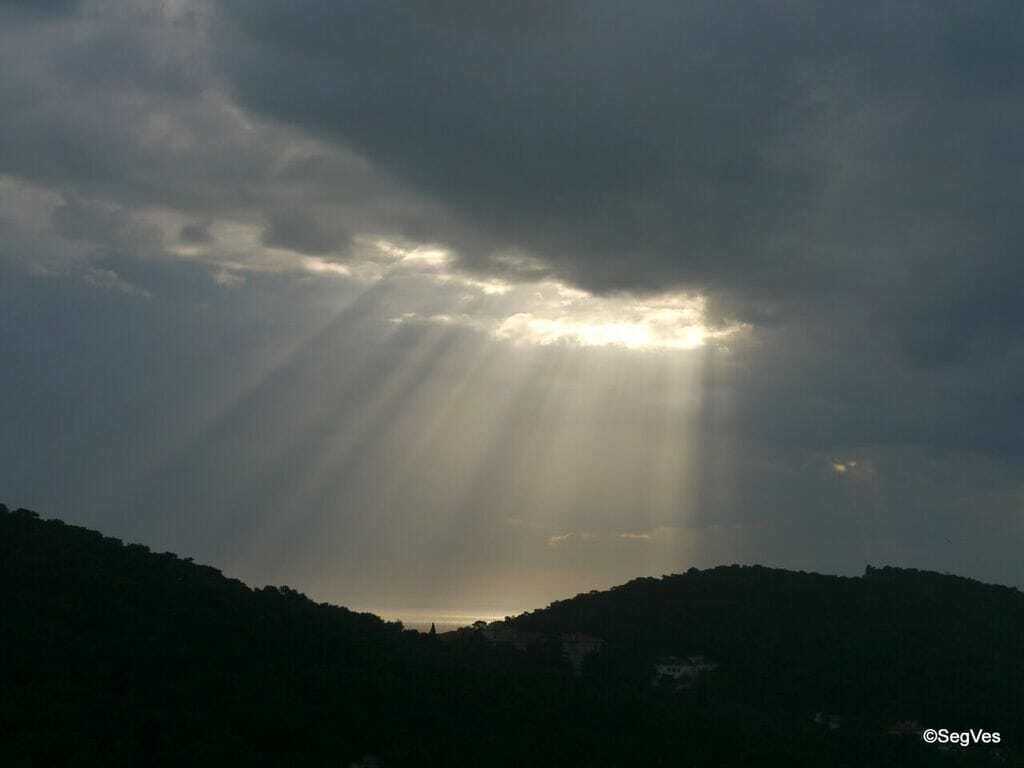 At the conclusion of the first part of the Meeting, the bishops embraced the appeal of Patriarch Bartholomew I, to pray that the School of Theology might be reopened. They also called for the return of the two bishops in Syria, who were kidnapped in April 2013: Greek Orthodox Bishop of Aleppo, Paul Yazigi, and Syro-Orthodox Archbishop Gregorios Yohanna Ibrahim, Bishop Friend of the Focolare and faithful participant at all their gatherings. Now the evening has come and rain is falling lightly on the island. The carts are rolling down the hills carrying a much lighter cargo: brother bishops who are committed to living mutual love so that the Risen Jesus can give his light to the world again. Compiled by: Adriana Avellaneda
At the conclusion of the first part of the Meeting, the bishops embraced the appeal of Patriarch Bartholomew I, to pray that the School of Theology might be reopened. They also called for the return of the two bishops in Syria, who were kidnapped in April 2013: Greek Orthodox Bishop of Aleppo, Paul Yazigi, and Syro-Orthodox Archbishop Gregorios Yohanna Ibrahim, Bishop Friend of the Focolare and faithful participant at all their gatherings. Now the evening has come and rain is falling lightly on the island. The carts are rolling down the hills carrying a much lighter cargo: brother bishops who are committed to living mutual love so that the Risen Jesus can give his light to the world again. Compiled by: Adriana Avellaneda
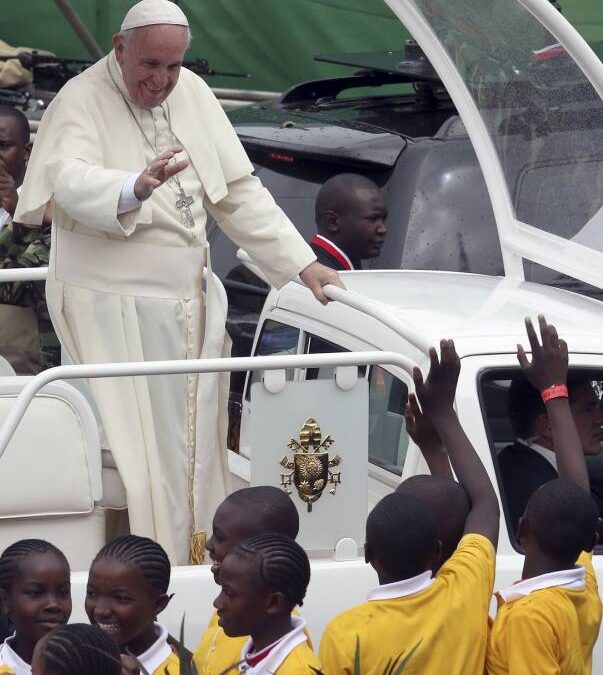
Kenya, first leg of Pope Francis’s African journey
“Karibu Kenya Papa” (Wel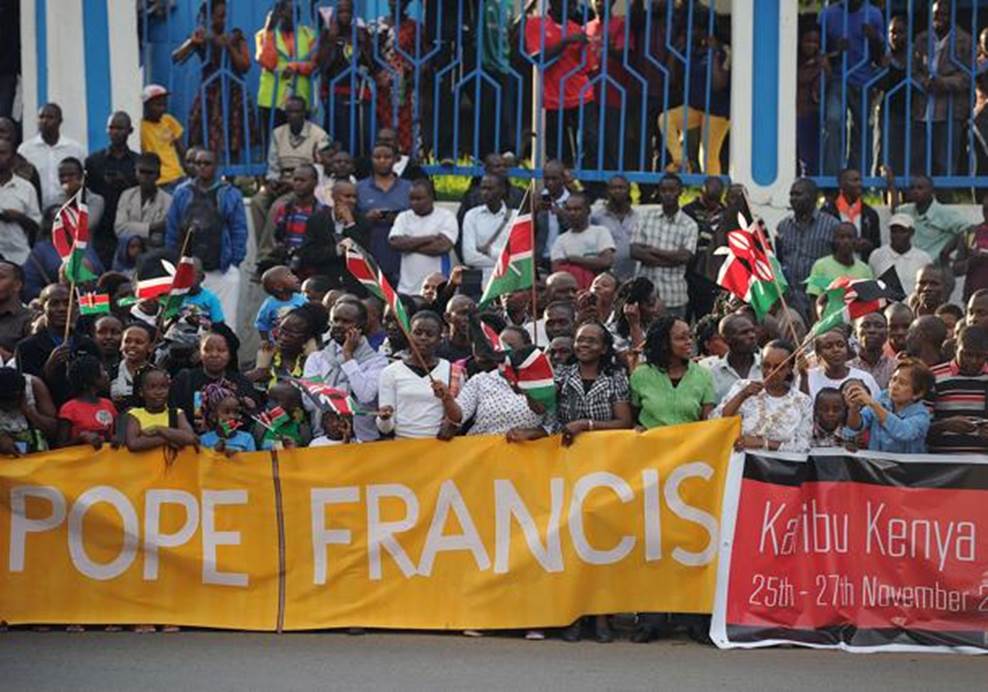 come to Kenya, Pope). Amid festive songs and dances, the Pope landed in Nairobi in the afternoon of 25 November for the first leg in Africa. From the airport and all the way to the city, two waves of crowds accompanied the papal automobile: a simple grey car. In his first greeting Francesco expressed his love for this “young and vigorous nation, a community enriched by diversity.” “Kenya has been blessed, not only with immense beauty in its mountains, rivers, lakes, forests, savannahs and semi-deserts, but also with an abundance of natural resources.” He went on to say: “In a world that continues to exploit instead of protecting our common home,” I hope that your values inspire “the endeavours of the government in promoting models of responsible economic development.” The papal agenda is full: the meeting with the clergy, to whom he gives three key words, weep, pray, and serve; and the session with the UN representatives of Nairobi, from whom he asked for a ”change of direction” so that economy and politics could be placed at the service of the person, in order to eradicate malaria and tuberculosis, be persistent in fighting against deforestation, and target fair trade and development which takes the poor into account. The meeting with the leaders of the various Churches and Muslim and Animist communities was highly significant, and where he affirmed that ecumenical and interreligious dialogue is not a luxury or an option. He then strongly stressed that phrase which echoed throughout the world: “The holy name of God must never be used to justify hatred and violence.”
come to Kenya, Pope). Amid festive songs and dances, the Pope landed in Nairobi in the afternoon of 25 November for the first leg in Africa. From the airport and all the way to the city, two waves of crowds accompanied the papal automobile: a simple grey car. In his first greeting Francesco expressed his love for this “young and vigorous nation, a community enriched by diversity.” “Kenya has been blessed, not only with immense beauty in its mountains, rivers, lakes, forests, savannahs and semi-deserts, but also with an abundance of natural resources.” He went on to say: “In a world that continues to exploit instead of protecting our common home,” I hope that your values inspire “the endeavours of the government in promoting models of responsible economic development.” The papal agenda is full: the meeting with the clergy, to whom he gives three key words, weep, pray, and serve; and the session with the UN representatives of Nairobi, from whom he asked for a ”change of direction” so that economy and politics could be placed at the service of the person, in order to eradicate malaria and tuberculosis, be persistent in fighting against deforestation, and target fair trade and development which takes the poor into account. The meeting with the leaders of the various Churches and Muslim and Animist communities was highly significant, and where he affirmed that ecumenical and interreligious dialogue is not a luxury or an option. He then strongly stressed that phrase which echoed throughout the world: “The holy name of God must never be used to justify hatred and violence.” 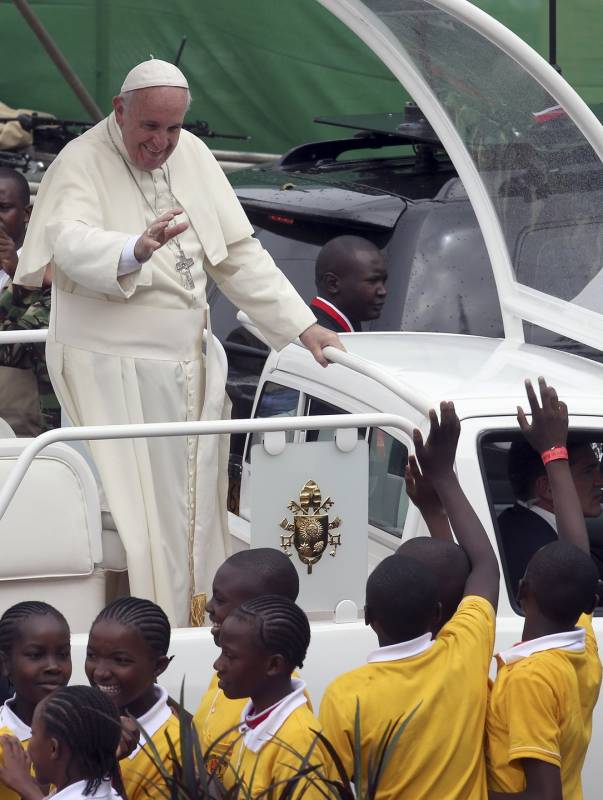 On the 27th, the last day in Nairobi, he went to Kangemi, a very poor shanty town where conditions of human and environmental downgrade have amassed, and which had specifically pushed him to denounce this situation of Kangemi before the UN. He was met there by 100,000 people who waited to welcome him with dances and songs. And Francis did not disappoint them: “I feel at home,” he said. “I share this moment with you brothers and sisters who have a special place in my life and in my choices. I feel your sufferings deeply. I know the pain you bear. How can we not denounce the injustice suffered?” Before leaving for Uganda, he met the youth in the Kasarani stadium to answer all their questions, such as: how to overcome tribalism, corruption, and enrolment of the youth. “Overcoming tribalism – he replied – is a daily task, a job for one’s ears in listening to the others, a task for the heart in opening it to the others, and a labour of the hand in reaching out towards one another.” He added that, “Corruption is something that creeps into our hearts like sugar which is sweet, pleasant, and easy to take, but then we end up in trouble.” And how can radicalisation be overcome? “The first thing we must do to prevent the enrolment of a young person is to offer education and employment.” Each of his meetings overflows with affection, closeness and love. And the people responded with gratitude, joy, and hope. Inculturation of the Gospel is one of the most important challenges in these lands and we must take into account the aspects perceived as values that pre-existed before Christianity: the vision of the family, the role of the clans, tribes, polygamy, and that of the Muslims, etc. It is a challenge which also the Focolare has faced ever since it came to Africa in the 1960s, and which it continues to sincerely undertake with the people of the place, in the spirit of reciprocity. A journey led Chiara Lubich in 1992 to found, precisely in Nairobi, a little town of witness, where specific inculturation courses are held. The next one will be held in May 2016, with the participation also of Maria Voce and Jesús Morán, President and Co-President, respectively. Watch video of the foundation of Mariapolis Piero
On the 27th, the last day in Nairobi, he went to Kangemi, a very poor shanty town where conditions of human and environmental downgrade have amassed, and which had specifically pushed him to denounce this situation of Kangemi before the UN. He was met there by 100,000 people who waited to welcome him with dances and songs. And Francis did not disappoint them: “I feel at home,” he said. “I share this moment with you brothers and sisters who have a special place in my life and in my choices. I feel your sufferings deeply. I know the pain you bear. How can we not denounce the injustice suffered?” Before leaving for Uganda, he met the youth in the Kasarani stadium to answer all their questions, such as: how to overcome tribalism, corruption, and enrolment of the youth. “Overcoming tribalism – he replied – is a daily task, a job for one’s ears in listening to the others, a task for the heart in opening it to the others, and a labour of the hand in reaching out towards one another.” He added that, “Corruption is something that creeps into our hearts like sugar which is sweet, pleasant, and easy to take, but then we end up in trouble.” And how can radicalisation be overcome? “The first thing we must do to prevent the enrolment of a young person is to offer education and employment.” Each of his meetings overflows with affection, closeness and love. And the people responded with gratitude, joy, and hope. Inculturation of the Gospel is one of the most important challenges in these lands and we must take into account the aspects perceived as values that pre-existed before Christianity: the vision of the family, the role of the clans, tribes, polygamy, and that of the Muslims, etc. It is a challenge which also the Focolare has faced ever since it came to Africa in the 1960s, and which it continues to sincerely undertake with the people of the place, in the spirit of reciprocity. A journey led Chiara Lubich in 1992 to found, precisely in Nairobi, a little town of witness, where specific inculturation courses are held. The next one will be held in May 2016, with the participation also of Maria Voce and Jesús Morán, President and Co-President, respectively. Watch video of the foundation of Mariapolis Piero
Nairobi, May 19, 1992: Inauguration of “Mariapolis Piero” in Kenya
Word of Life December 2015
We are offered the possibility of meeting Jesus in our daily lives and among us. If we take it, we will experience a living Christmas. The words are spoken to me. The Lord is coming and I must be ready to welcome him. Every day I pray, ‘Come, Lord Jesus.’ And he replies, ‘Yes, I am coming soon’ (see Rev. 22:17, 20). He is standing at the door and knocking. He asks to come in (see Rev. 3:20). I cannot leave him outside my life. The invitation to welcome the Lord came from John the Baptist. It was directed to the Jewish people of his time. They were asked to confess their sins and be converted, changing their lives. He was certain that the coming of the Messiah was about to happen. Would the people, who had been waiting for him for centuries, recognize him, listen his words and follow him? John knew that to welcome him they had to get ready, hence his pressing invitation: ‘Prepare the way of the Lord, make his paths straight.’ These words are spoken to me because Jesus continues to come every day. Every day he knocks at my door and for me too, as for the Jews at the time of the Baptist, it is not easy to recognize him. So, contrary to what was commonly expected, he presented himself as a humble carpenter from Nazareth, an unimportant village. Today he presents himself under the guise of a migrant, someone with no work, an employer, a schoolmate, relatives, even of people who don’t always seem to shine with the face of the Lord, indeed where his face seems hidden. His subtle voice, which invites us to forgive, to give trust and friendship, to refuse to give in to choices against the Gospel, is often drowned out by other voices that incite us to hate, get our own back, become corrupt. This is the basis for the metaphor of tortuous and impenetrable paths that recall the obstacles hindering God’s coming into our everyday lives. It’s almost pointless to list the baseness, the egoism, the sin that dwells in our hearts and makes us blind to his presence and deaf to his voice. Each one of us, if we are sincere, knows what are the personal barriers obstructing our meeting with Jesus, with his word, with the persons with whom he identifies himself. Hence the invitation in the Word of Life that today is spoken directly to me: ‘Prepare the way of the Lord, make his paths straight.’ Correcting that judgement which makes me condemn the other person, ceasing to speak to them, so that instead I come to understand, to love and put myself at the other’s service. Correcting a twisted way of behaving that makes me betray a friendship, makes me violent, cheating civil law, and instead letting myself be converted into a person who is ready even to put up with injustice so as to be able to salvage a relationship, someone willing to pay in person the cost of encouraging fraternity in my neighbourhood. It is hard and a strong word, the one we have this month. But it is also a liberating word, one that can change my life, open me to meeting Jesus, so that he may come to live in me and it be he who acts and loves in me. This word, if it is lived, can do even more. It can give birth to Jesus among us, in the Christian community, in our families, in the groups where we are active. John spoke it to the whole of the people. And God came ‘and lived among us’ (Jn 1:14), in the midst of his people. For this reason we want, by helping one another to straighten the paths of our relationships, to wipe out any kind of distortion there may be between us, and so live out the mercy we are invited to have this year. Like this we will become, together, the home, the family, that is capable of welcoming God. It will be Christmas. Jesus will find an open highway and will be able to stay in our midst. Fabio Ciardi

